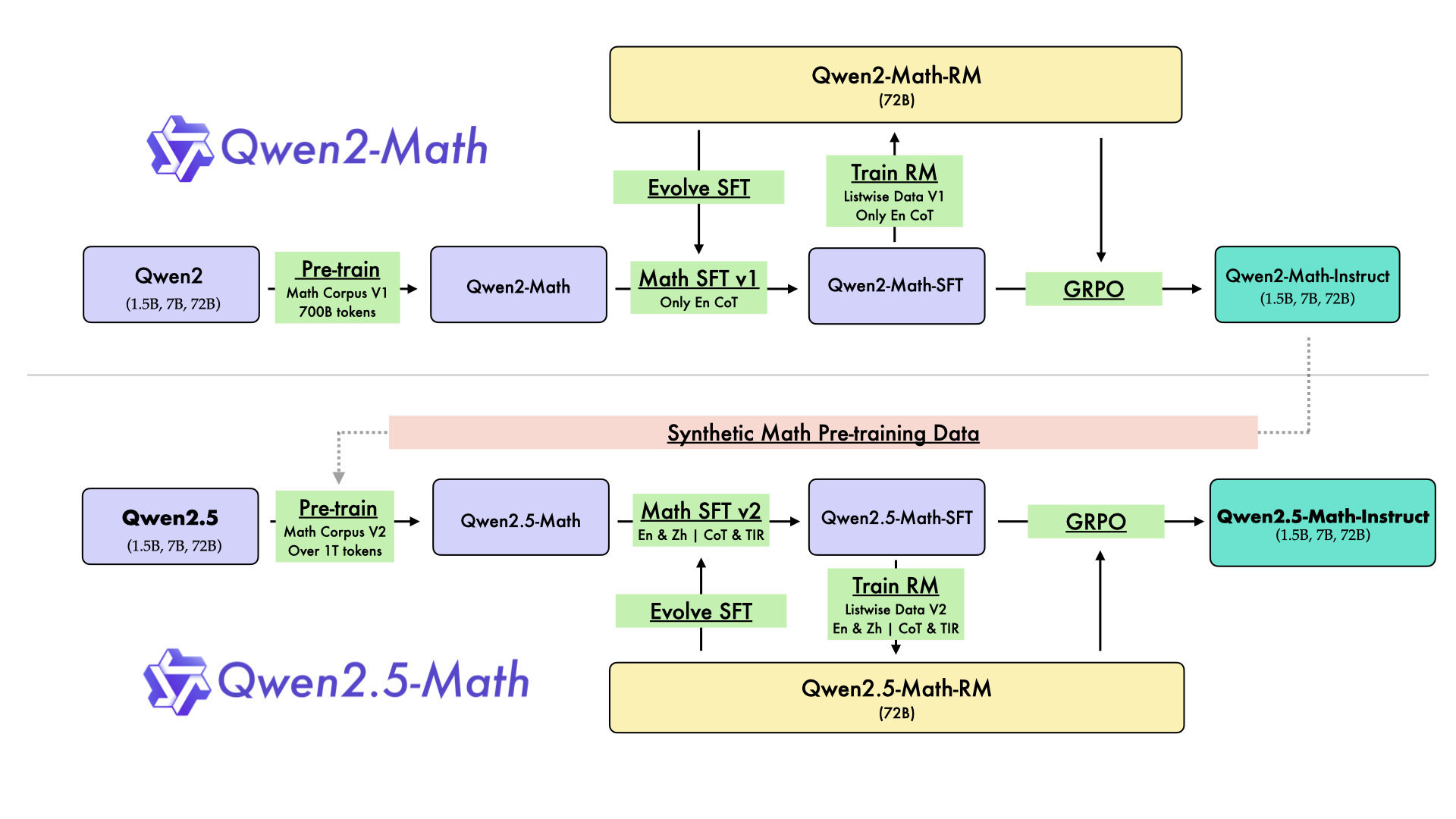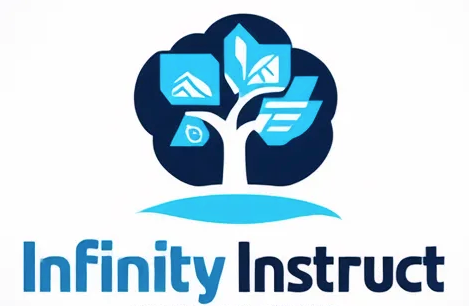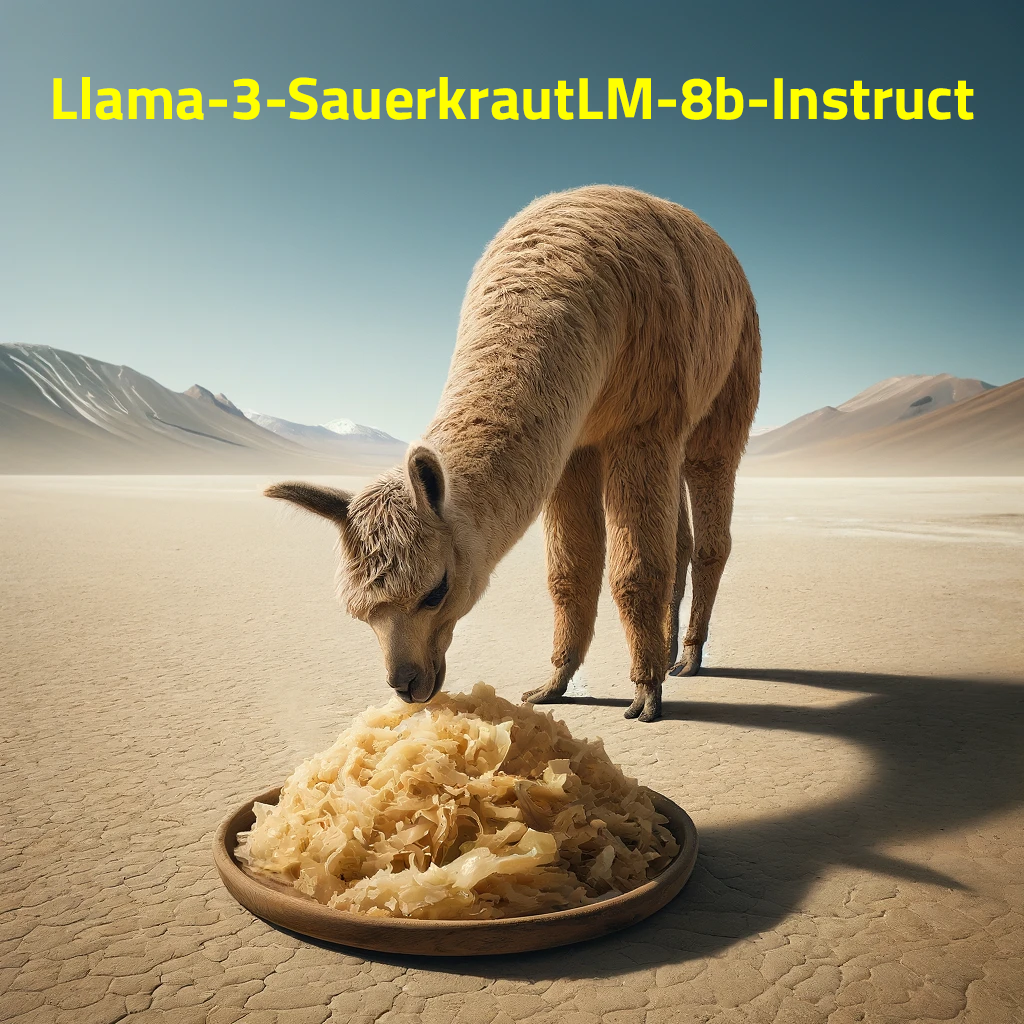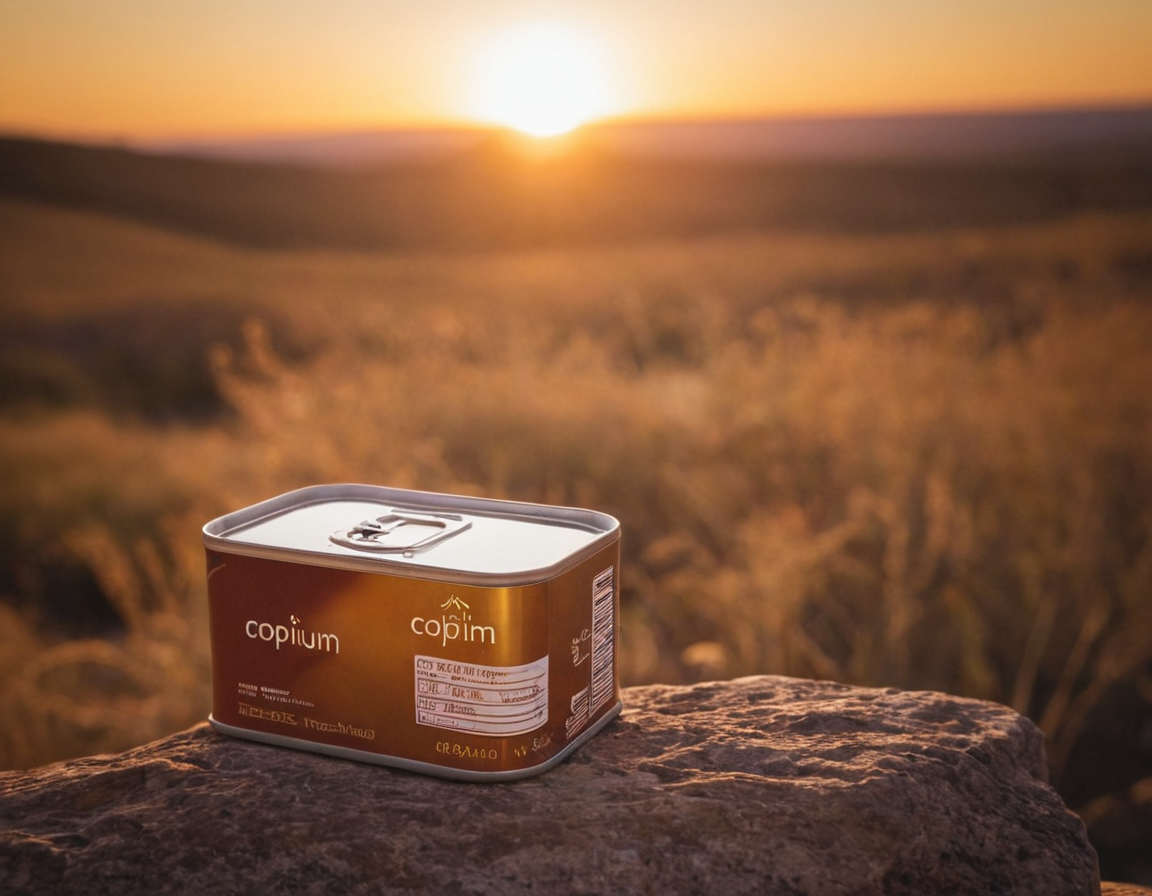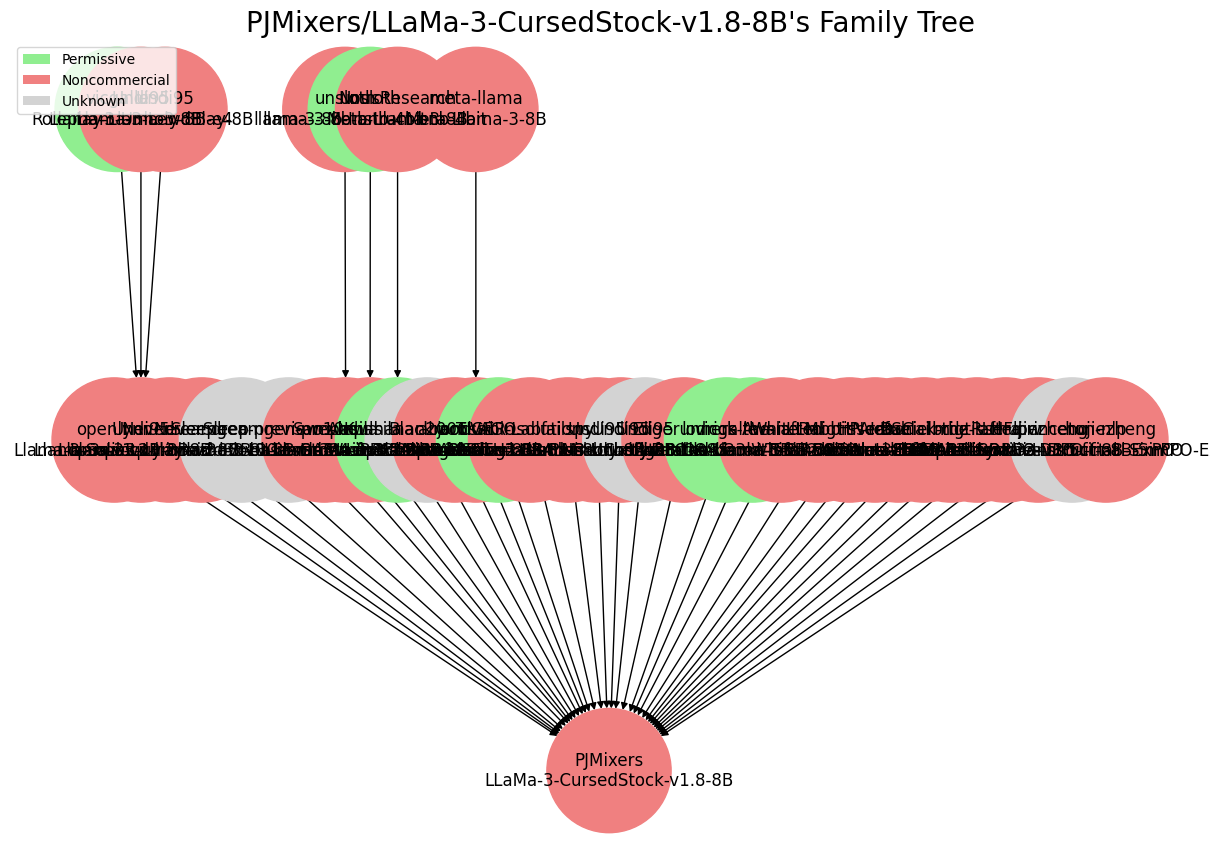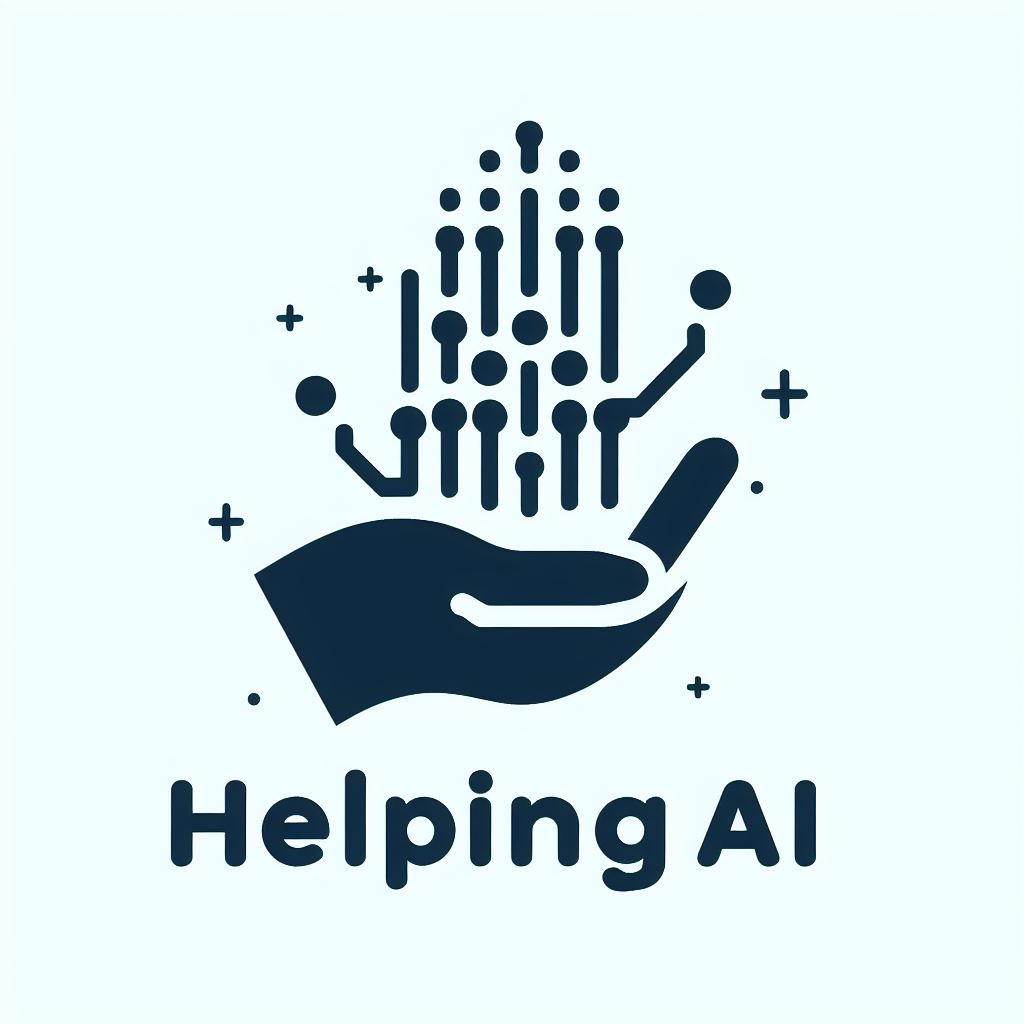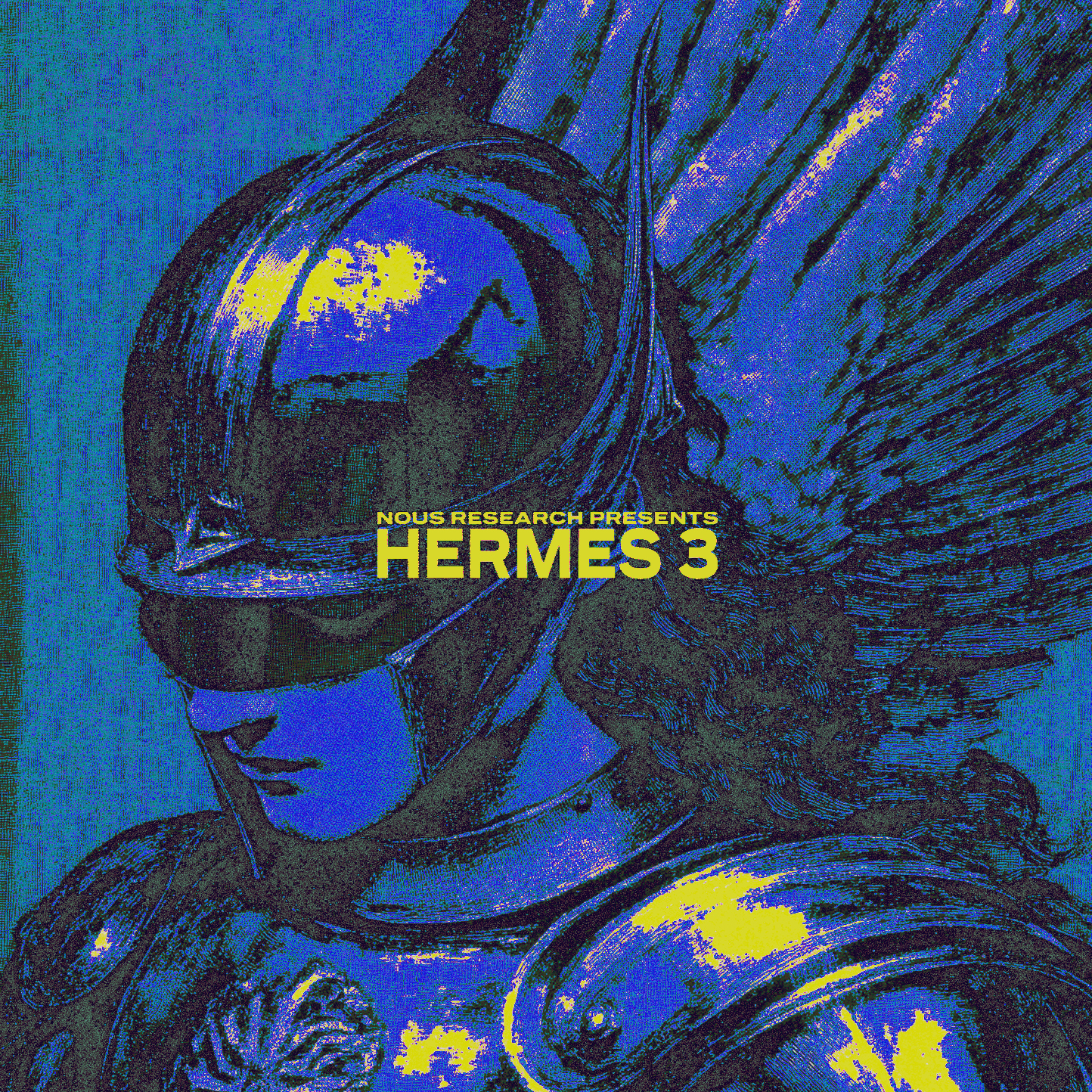🖼️ Available 566 models from 1 repositories
Filter by type:
rwkv-6-world-7b
RWKV (pronounced RwaKuv) is an RNN with GPT-level LLM performance, and can also be directly trained like a GPT transformer (parallelizable). We are at RWKV-7. So it's combining the best of RNN and transformer - great performance, fast inference, fast training, saves VRAM, "infinite" ctxlen, and free text embedding. Moreover it's 100% attention-free, and a Linux Foundation AI project.
qwen2.5-coder-14b
Qwen2.5-Coder is the latest series of Code-Specific Qwen large language models (formerly known as CodeQwen). As of now, Qwen2.5-Coder has covered six mainstream model sizes, 0.5, 1.5, 3, 7, 14, 32 billion parameters, to meet the needs of different developers. Qwen2.5-Coder brings the following improvements upon CodeQwen1.5: Significantly improvements in code generation, code reasoning and code fixing. Base on the strong Qwen2.5, we scale up the training tokens into 5.5 trillion including source code, text-code grounding, Synthetic data, etc. Qwen2.5-Coder-32B has become the current state-of-the-art open-source codeLLM, with its coding abilities matching those of GPT-4o. A more comprehensive foundation for real-world applications such as Code Agents. Not only enhancing coding capabilities but also maintaining its strengths in mathematics and general competencies. Long-context Support up to 128K tokens.
qwen2.5-coder-3b-instruct
Qwen2.5-Coder is the latest series of Code-Specific Qwen large language models (formerly known as CodeQwen). As of now, Qwen2.5-Coder has covered six mainstream model sizes, 0.5, 1.5, 3, 7, 14, 32 billion parameters, to meet the needs of different developers. Qwen2.5-Coder brings the following improvements upon CodeQwen1.5: Significantly improvements in code generation, code reasoning and code fixing. Base on the strong Qwen2.5, we scale up the training tokens into 5.5 trillion including source code, text-code grounding, Synthetic data, etc. Qwen2.5-Coder-32B has become the current state-of-the-art open-source codeLLM, with its coding abilities matching those of GPT-4o. A more comprehensive foundation for real-world applications such as Code Agents. Not only enhancing coding capabilities but also maintaining its strengths in mathematics and general competencies. Long-context Support up to 128K tokens.
qwen2.5-coder-32b-instruct
Qwen2.5-Coder is the latest series of Code-Specific Qwen large language models (formerly known as CodeQwen). As of now, Qwen2.5-Coder has covered six mainstream model sizes, 0.5, 1.5, 3, 7, 14, 32 billion parameters, to meet the needs of different developers. Qwen2.5-Coder brings the following improvements upon CodeQwen1.5: Significantly improvements in code generation, code reasoning and code fixing. Base on the strong Qwen2.5, we scale up the training tokens into 5.5 trillion including source code, text-code grounding, Synthetic data, etc. Qwen2.5-Coder-32B has become the current state-of-the-art open-source codeLLM, with its coding abilities matching those of GPT-4o. A more comprehensive foundation for real-world applications such as Code Agents. Not only enhancing coding capabilities but also maintaining its strengths in mathematics and general competencies. Long-context Support up to 128K tokens.
qwen2.5-coder-14b-instruct
Qwen2.5-Coder is the latest series of Code-Specific Qwen large language models (formerly known as CodeQwen). As of now, Qwen2.5-Coder has covered six mainstream model sizes, 0.5, 1.5, 3, 7, 14, 32 billion parameters, to meet the needs of different developers. Qwen2.5-Coder brings the following improvements upon CodeQwen1.5: Significantly improvements in code generation, code reasoning and code fixing. Base on the strong Qwen2.5, we scale up the training tokens into 5.5 trillion including source code, text-code grounding, Synthetic data, etc. Qwen2.5-Coder-32B has become the current state-of-the-art open-source codeLLM, with its coding abilities matching those of GPT-4o. A more comprehensive foundation for real-world applications such as Code Agents. Not only enhancing coding capabilities but also maintaining its strengths in mathematics and general competencies. Long-context Support up to 128K tokens.
qwen2.5-coder-1.5b-instruct
Qwen2.5-Coder is the latest series of Code-Specific Qwen large language models (formerly known as CodeQwen). As of now, Qwen2.5-Coder has covered six mainstream model sizes, 0.5, 1.5, 3, 7, 14, 32 billion parameters, to meet the needs of different developers. Qwen2.5-Coder brings the following improvements upon CodeQwen1.5: Significantly improvements in code generation, code reasoning and code fixing. Base on the strong Qwen2.5, we scale up the training tokens into 5.5 trillion including source code, text-code grounding, Synthetic data, etc. Qwen2.5-Coder-32B has become the current state-of-the-art open-source codeLLM, with its coding abilities matching those of GPT-4o. A more comprehensive foundation for real-world applications such as Code Agents. Not only enhancing coding capabilities but also maintaining its strengths in mathematics and general competencies. Long-context Support up to 128K tokens.
qwen2.5-coder-7b-instruct
Qwen2.5-Coder is the latest series of Code-Specific Qwen large language models (formerly known as CodeQwen). As of now, Qwen2.5-Coder has covered six mainstream model sizes, 0.5, 1.5, 3, 7, 14, 32 billion parameters, to meet the needs of different developers. Qwen2.5-Coder brings the following improvements upon CodeQwen1.5: Significantly improvements in code generation, code reasoning and code fixing. Base on the strong Qwen2.5, we scale up the training tokens into 5.5 trillion including source code, text-code grounding, Synthetic data, etc. Qwen2.5-Coder-32B has become the current state-of-the-art open-source codeLLM, with its coding abilities matching those of GPT-4o. A more comprehensive foundation for real-world applications such as Code Agents. Not only enhancing coding capabilities but also maintaining its strengths in mathematics and general competencies. Long-context Support up to 128K tokens.
qwen2.5-coder-7b-instruct-abliterated-i1
This is an uncensored version of Qwen2.5-Coder-7B-Instruct created with abliteration (see this article to know more about it). Special thanks to @FailSpy for the original code and technique. Please follow him if you're interested in abliterated models.
rombos-coder-v2.5-qwen-7b
Rombos-Coder-V2.5-Qwen-7b is a continues finetuned version of Qwen2.5-Coder-7B-Instruct. I took it upon myself to merge the instruct model with the base model myself using the * Ties* merge method as demonstrated in my own "Continuous Finetuning" method (link available). This version of the model shows higher performance than the original instruct and base models.
rombos-coder-v2.5-qwen-32b
Rombos-Coder-V2.5-Qwen-32b is a continues finetuned version of Qwen2.5-Coder-32B-Instruct. I took it upon myself to merge the instruct model with the base model myself using the Ties merge method as demonstrated in my own "Continuous Finetuning" method (link available). This version of the model shows higher performance than the original instruct and base models.
rombos-coder-v2.5-qwen-14b
Rombos-Coder-V2.5-Qwen-14b is a continues finetuned version of Qwen2.5-Coder-14B-Instruct. I took it upon myself to merge the instruct model with the base model myself using the Ties merge method as demonstrated in my own "Continuous Finetuning" method (link available). This version of the model shows higher performance than the original instruct and base models.
opencoder-8b-base
The model is a quantized version of infly/OpenCoder-8B-Base created using llama.cpp. It is part of the OpenCoder LLM family which includes 1.5B and 8B base and chat models, supporting both English and Chinese languages. The original OpenCoder model was pretrained on 2.5 trillion tokens composed of 90% raw code and 10% code-related web data, and supervised finetuned on over 4.5M high-quality SFT examples. It achieves high performance across multiple language model benchmarks and is one of the most comprehensively open-sourced models available.
opencoder-8b-instruct
The LLM model is QuantFactory/OpenCoder-8B-Instruct-GGUF, which is a quantized version of infly/OpenCoder-8B-Instruct. It is created using llama.cpp and supports both English and Chinese languages. The original model, infly/OpenCoder-8B-Instruct, is pretrained on 2.5 trillion tokens composed of 90% raw code and 10% code-related web data, and supervised finetuned on over 4.5M high-quality SFT examples. It achieves high performance across multiple language model benchmarks and is one of the leading open-source models for code.
opencoder-1.5b-base
The model is a large language model with 1.5 billion parameters, trained on 2.5 trillion tokens of code-related data. It supports both English and Chinese languages and is part of the OpenCoder LLM family which also includes 8B base and chat models. The model achieves high performance across multiple language model benchmarks and is one of the most comprehensively open-sourced models available.
opencoder-1.5b-instruct
The model is a quantized version of [infly/OpenCoder-1.5B-Instruct](https://huggingface.co/infly/OpenCoder-1.5B-Instruct) created using llama.cpp. The original model, infly/OpenCoder-1.5B-Instruct, is an open and reproducible code LLM family which includes 1.5B and 8B base and chat models, supporting both English and Chinese languages. The model is pretrained on 2.5 trillion tokens composed of 90% raw code and 10% code-related web data, and supervised finetuned on over 4.5M high-quality SFT examples. It achieves high performance across multiple language model benchmarks, positioning it among the leading open-source models for code.
Repository: localaiLicense: inf
Link #1granite-3.0-1b-a400m-instruct
Granite 3.0 language models are a new set of lightweight state-of-the-art, open foundation models that natively support multilinguality, coding, reasoning, and tool usage, including the potential to be run on constrained compute resources. All the models are publicly released under an Apache 2.0 license for both research and commercial use. The models' data curation and training procedure were designed for enterprise usage and customization in mind, with a process that evaluates datasets for governance, risk and compliance (GRC) criteria, in addition to IBM's standard data clearance process and document quality checks. Granite 3.0 includes 4 different models of varying sizes: Dense Models: 2B and 8B parameter models, trained on 12 trillion tokens in total. Mixture-of-Expert (MoE) Models: Sparse 1B and 3B MoE models, with 400M and 800M activated parameters respectively, trained on 10 trillion tokens in total. Accordingly, these options provide a range of models with different compute requirements to choose from, with appropriate trade-offs with their performance on downstream tasks. At each scale, we release a base model — checkpoints of models after pretraining, as well as instruct checkpoints — models finetuned for dialogue, instruction-following, helpfulness, and safety.
moe-girl-800ma-3bt
A roleplay-centric finetune of IBM's Granite 3.0 3B-A800M. LoRA finetune trained locally, whereas the others were FFT; while this results in less uptake of training data, it should also mean less degradation in Granite's core abilities, making it potentially easier to use for general-purpose tasks. Disclaimer PLEASE do not expect godliness out of this, it's a model with 800 million active parameters. Expect something more akin to GPT-3 (the original, not GPT-3.5.) (Furthermore, this version is by a less experienced tuner; it's my first finetune that actually has decent-looking graphs, I don't really know what I'm doing yet!)
moe-girl-1ba-7bt-i1
A finetune of OLMoE by AllenAI designed for roleplaying (and maybe general usecases if you try hard enough). PLEASE do not expect godliness out of this, it's a model with 1 billion active parameters. Expect something more akin to Gemma 2 2B, not Llama 3 8B.
salamandra-7b-instruct
Transformer-based decoder-only language model that has been pre-trained on 7.8 trillion tokens of highly curated data. The pre-training corpus contains text in 35 European languages and code. Salamandra comes in three different sizes — 2B, 7B and 40B parameters — with their respective base and instruction-tuned variants. This model card corresponds to the 7B instructed version.
llama-3.2-1b-instruct:q4_k_m
The Meta Llama 3.2 collection of multilingual large language models (LLMs) is a collection of pretrained and instruction-tuned generative models in 1B and 3B sizes (text in/text out). The Llama 3.2 instruction-tuned text only models are optimized for multilingual dialogue use cases, including agentic retrieval and summarization tasks. They outperform many of the available open source and closed chat models on common industry benchmarks. Model Developer: Meta Model Architecture: Llama 3.2 is an auto-regressive language model that uses an optimized transformer architecture. The tuned versions use supervised fine-tuning (SFT) and reinforcement learning with human feedback (RLHF) to align with human preferences for helpfulness and safety.
Repository: localaiLicense: llama3.2
Link #1llama-3.2-3b-instruct:q4_k_m
The Meta Llama 3.2 collection of multilingual large language models (LLMs) is a collection of pretrained and instruction-tuned generative models in 1B and 3B sizes (text in/text out). The Llama 3.2 instruction-tuned text only models are optimized for multilingual dialogue use cases, including agentic retrieval and summarization tasks. They outperform many of the available open source and closed chat models on common industry benchmarks. Model Developer: Meta Model Architecture: Llama 3.2 is an auto-regressive language model that uses an optimized transformer architecture. The tuned versions use supervised fine-tuning (SFT) and reinforcement learning with human feedback (RLHF) to align with human preferences for helpfulness and safety.
Repository: localaiLicense: llama3.2
Link #1llama-3.2-3b-instruct:q8_0
The Meta Llama 3.2 collection of multilingual large language models (LLMs) is a collection of pretrained and instruction-tuned generative models in 1B and 3B sizes (text in/text out). The Llama 3.2 instruction-tuned text only models are optimized for multilingual dialogue use cases, including agentic retrieval and summarization tasks. They outperform many of the available open source and closed chat models on common industry benchmarks. Model Developer: Meta Model Architecture: Llama 3.2 is an auto-regressive language model that uses an optimized transformer architecture. The tuned versions use supervised fine-tuning (SFT) and reinforcement learning with human feedback (RLHF) to align with human preferences for helpfulness and safety.
Repository: localaiLicense: llama3.2
Link #1llama-3.2-1b-instruct:q8_0
The Meta Llama 3.2 collection of multilingual large language models (LLMs) is a collection of pretrained and instruction-tuned generative models in 1B and 3B sizes (text in/text out). The Llama 3.2 instruction-tuned text only models are optimized for multilingual dialogue use cases, including agentic retrieval and summarization tasks. They outperform many of the available open source and closed chat models on common industry benchmarks. Model Developer: Meta Model Architecture: Llama 3.2 is an auto-regressive language model that uses an optimized transformer architecture. The tuned versions use supervised fine-tuning (SFT) and reinforcement learning with human feedback (RLHF) to align with human preferences for helpfulness and safety.
Repository: localaiLicense: llama3.2
Link #1versatillama-llama-3.2-3b-instruct-abliterated
Small but Smart Fine-Tuned on Vast dataset of Conversations. Able to Generate Human like text with high performance within its size. It is Very Versatile when compared for it's size and Parameters and offers capability almost as good as Llama 3.1 8B Instruct.
Repository: localaiLicense: llama3.2
Link #1llama3.2-3b-enigma
Enigma is a code-instruct model built on Llama 3.2 3b. It is a high quality code instruct model with the Llama 3.2 Instruct chat format. The model is finetuned on synthetic code-instruct data generated with Llama 3.1 405b and supplemented with generalist synthetic data. It uses the Llama 3.2 Instruct prompt format.
Repository: localaiLicense: llama3.2
Link #1llama3.2-3b-esper2
Esper 2 is a DevOps and cloud architecture code specialist built on Llama 3.2 3b. It is an AI assistant focused on AWS, Azure, GCP, Terraform, Dockerfiles, pipelines, shell scripts and more, with real world problem solving and high quality code instruct performance within the Llama 3.2 Instruct chat format. Finetuned on synthetic DevOps-instruct and code-instruct data generated with Llama 3.1 405b and supplemented with generalist chat data.
Repository: localaiLicense: llama3.2
Link #1llama-3.2-3b-agent007
The model is a quantized version of EpistemeAI/Llama-3.2-3B-Agent007, developed by EpistemeAI and fine-tuned from unsloth/llama-3.2-3b-instruct-bnb-4bit. It was trained 2x faster with Unsloth and Huggingface's TRL library. Fine tuned with Agent datasets.
Repository: localaiLicense: llama3.2
Link #1llama-3.2-3b-agent007-coder
The Llama-3.2-3B-Agent007-Coder-GGUF is a quantized version of the EpistemeAI/Llama-3.2-3B-Agent007-Coder model, which is a fine-tuned version of the unsloth/llama-3.2-3b-instruct-bnb-4bit model. It is created using llama.cpp and trained with additional datasets such as the Agent dataset, Code Alpaca 20K, and magpie ultra 0.1. This model is optimized for multilingual dialogue use cases and agentic retrieval and summarization tasks. The model is available for commercial and research use in multiple languages and is best used with the transformers library.
Repository: localaiLicense: llama3.2
Link #1fireball-meta-llama-3.2-8b-instruct-agent-003-128k-code-dpo
The LLM model is a quantized version of EpistemeAI/Fireball-Meta-Llama-3.2-8B-Instruct-agent-003-128k-code-DPO, which is an experimental and revolutionary fine-tune with DPO dataset to allow LLama 3.1 8B to be an agentic coder. It has some built-in agent features such as search, calculator, and ReAct. Other noticeable features include self-learning using unsloth, RAG applications, and memory. The context window of the model is 128K. It can be integrated into projects using popular libraries like Transformers and vLLM. The model is suitable for use with Langchain or LLamaIndex. The model is developed by EpistemeAI and licensed under the Apache 2.0 license.
Repository: localaiLicense: llama3.2
Link #1llama-3.2-chibi-3b
Small parameter LLMs are ideal for navigating the complexities of the Japanese language, which involves multiple character systems like kanji, hiragana, and katakana, along with subtle social cues. Despite their smaller size, these models are capable of delivering highly accurate and context-aware results, making them perfect for use in environments where resources are constrained. Whether deployed on mobile devices with limited processing power or in edge computing scenarios where fast, real-time responses are needed, these models strike the perfect balance between performance and efficiency, without sacrificing quality or speed.
llama-3.2-3b-reasoning-time
Lyte/Llama-3.2-3B-Reasoning-Time is a large language model with 3.2 billion parameters, designed for reasoning and time-based tasks in English. It is based on the Llama architecture and has been quantized using the GGUF format by mradermacher.
Repository: localaiLicense: llama3.2
Link #1llama-3.2-sun-2.5b-chat
Base Model Llama 3.2 1B Extended Size 1B to 2.5B parameters Extension Method Proprietary technique developed by MedIT Solutions Fine-tuning Open (or open subsets allowing for commercial use) open datasets from HF Open (or open subsets allowing for commercial use) SFT datasets from HF Training Status Current version: chat-1.0.0 Key Features Built on Llama 3.2 architecture Expanded from 1B to 2.47B parameters Optimized for open-ended conversations Incorporates supervised fine-tuning for improved performance Use Case General conversation and task-oriented interactions
llama3.2-3b-enigma
ValiantLabs/Llama3.2-3B-Enigma is an Enigma model built on Llama 3.2 3b. It is a high-quality code-instruct model with the Llama 3.2 Instruct chat format. The model is finetuned on synthetic code-instruct data generated using Llama 3.1 405b and supplemented with generalist synthetic data. This model is suitable for both code-instruct and general chat applications.
llama3.2-3b-shiningvaliant2-i1
Shining Valiant 2 is a chat model built on Llama 3.2 3b, finetuned on our data for friendship, insight, knowledge and enthusiasm. Finetuned on meta-llama/Llama-3.2-3B-Instruct for best available general performance Trained on a variety of high quality data; focused on science, engineering, technical knowledge, and structured reasoning Also available for Llama 3.1 70b and Llama 3.1 8b! Version This is the 2024-09-27 release of Shining Valiant 2 for Llama 3.2 3b.
llama-doctor-3.2-3b-instruct
The Llama-Doctor-3.2-3B-Instruct model is designed for text generation tasks, particularly in contexts where instruction-following capabilities are needed. This model is a fine-tuned version of the base Llama-3.2-3B-Instruct model and is optimized for understanding and responding to user-provided instructions or prompts. The model has been trained on a specialized dataset, avaliev/chat_doctor, to enhance its performance in providing conversational or advisory responses, especially in medical or technical fields.
onellm-doey-v1-llama-3.2-3b
This model is a fine-tuned version of LLaMA 3.2-3B, optimized using LoRA (Low-Rank Adaptation) on the NVIDIA ChatQA-Training-Data. It is tailored for conversational AI, question answering, and other instruction-following tasks, with support for sequences up to 1024 tokens.
llama-sentient-3.2-3b-instruct
The Llama-Sentient-3.2-3B-Instruct model is a fine-tuned version of the Llama-3.2-3B-Instruct model, optimized for text generation tasks, particularly where instruction-following abilities are critical. This model is trained on the mlabonne/lmsys-arena-human-preference-55k-sharegpt dataset, which enhances its performance in conversational and advisory contexts, making it suitable for a wide range of applications.
llama-smoltalk-3.2-1b-instruct
The Llama-SmolTalk-3.2-1B-Instruct model is a lightweight, instruction-tuned model designed for efficient text generation and conversational AI tasks. With a 1B parameter architecture, this model strikes a balance between performance and resource efficiency, making it ideal for applications requiring concise, contextually relevant outputs. The model has been fine-tuned to deliver robust instruction-following capabilities, catering to both structured and open-ended queries. Key Features: Instruction-Tuned Performance: Optimized to understand and execute user-provided instructions across diverse domains. Lightweight Architecture: With just 1 billion parameters, the model provides efficient computation and storage without compromising output quality. Versatile Use Cases: Suitable for tasks like content generation, conversational interfaces, and basic problem-solving. Intended Applications: Conversational AI: Engage users with dynamic and contextually aware dialogue. Content Generation: Produce summaries, explanations, or other creative text outputs efficiently. Instruction Execution: Follow user commands to generate precise and relevant responses.
qwen2.5-math-7b-instruct
In August 2024, we released the first series of mathematical LLMs - Qwen2-Math - of our Qwen family. A month later, we have upgraded it and open-sourced Qwen2.5-Math series, including base models Qwen2.5-Math-1.5B/7B/72B, instruction-tuned models Qwen2.5-Math-1.5B/7B/72B-Instruct, and mathematical reward model Qwen2.5-Math-RM-72B. Unlike Qwen2-Math series which only supports using Chain-of-Thught (CoT) to solve English math problems, Qwen2.5-Math series is expanded to support using both CoT and Tool-integrated Reasoning (TIR) to solve math problems in both Chinese and English. The Qwen2.5-Math series models have achieved significant performance improvements compared to the Qwen2-Math series models on the Chinese and English mathematics benchmarks with CoT. The base models of Qwen2-Math are initialized with Qwen2-1.5B/7B/72B, and then pretrained on a meticulously designed Mathematics-specific Corpus. This corpus contains large-scale high-quality mathematical web texts, books, codes, exam questions, and mathematical pre-training data synthesized by Qwen2.
qwen2.5-coder-7b-instruct
Qwen2.5-Coder is the latest series of Code-Specific Qwen large language models (formerly known as CodeQwen). For Qwen2.5-Coder, we release three base language models and instruction-tuned language models, 1.5, 7 and 32 (coming soon) billion parameters. Qwen2.5-Coder brings the following improvements upon CodeQwen1.5: Significantly improvements in code generation, code reasoning and code fixing. Base on the strong Qwen2.5, we scale up the training tokens into 5.5 trillion including source code, text-code grounding, Synthetic data, etc. A more comprehensive foundation for real-world applications such as Code Agents. Not only enhancing coding capabilities but also maintaining its strengths in mathematics and general competencies. Long-context Support up to 128K tokens.
qwen2.5-math-72b-instruct
In August 2024, we released the first series of mathematical LLMs - Qwen2-Math - of our Qwen family. A month later, we have upgraded it and open-sourced Qwen2.5-Math series, including base models Qwen2.5-Math-1.5B/7B/72B, instruction-tuned models Qwen2.5-Math-1.5B/7B/72B-Instruct, and mathematical reward model Qwen2.5-Math-RM-72B. Unlike Qwen2-Math series which only supports using Chain-of-Thught (CoT) to solve English math problems, Qwen2.5-Math series is expanded to support using both CoT and Tool-integrated Reasoning (TIR) to solve math problems in both Chinese and English. The Qwen2.5-Math series models have achieved significant performance improvements compared to the Qwen2-Math series models on the Chinese and English mathematics benchmarks with CoT
replete-llm-v2.5-qwen-14b
Replete-LLM-V2.5-Qwen-14b is a continues finetuned version of Qwen2.5-14B. I noticed recently that the Qwen team did not learn from my methods of continuous finetuning, the great benefits, and no downsides of it. So I took it upon myself to merge the instruct model with the base model myself using the Ties merge method This version of the model shows higher performance than the original instruct and base models.
replete-llm-v2.5-qwen-7b
Replete-LLM-V2.5-Qwen-7b is a continues finetuned version of Qwen2.5-14B. I noticed recently that the Qwen team did not learn from my methods of continuous finetuning, the great benefits, and no downsides of it. So I took it upon myself to merge the instruct model with the base model myself using the Ties merge method This version of the model shows higher performance than the original instruct and base models.
calme-2.2-qwen2.5-72b-i1
This model is a fine-tuned version of the powerful Qwen/Qwen2.5-72B-Instruct, pushing the boundaries of natural language understanding and generation even further. My goal was to create a versatile and robust model that excels across a wide range of benchmarks and real-world applications. Use Cases This model is suitable for a wide range of applications, including but not limited to: Advanced question-answering systems Intelligent chatbots and virtual assistants Content generation and summarization Code generation and analysis Complex problem-solving and decision support
rombos-llm-v2.5.1-qwen-3b
Rombos-LLM-V2.5.1-Qwen-3b is a little experiment that merges a high-quality LLM, arcee-ai/raspberry-3B, using the last step of the Continuous Finetuning method outlined in a Google document. The merge is done using the mergekit with the following parameters: - Models: Qwen2.5-3B-Instruct, raspberry-3B - Merge method: ties - Base model: Qwen2.5-3B - Parameters: weight=1, density=1, normalize=true, int8_mask=true - Dtype: bfloat16 The model has been evaluated on various tasks and datasets, and the results are available on the Open LLM Leaderboard. The model has shown promising performance across different benchmarks.
Repository: localaiLicense: apache-2.0
Link #1supernova-medius
Arcee-SuperNova-Medius is a 14B parameter language model developed by Arcee.ai, built on the Qwen2.5-14B-Instruct architecture. This unique model is the result of a cross-architecture distillation pipeline, combining knowledge from both the Qwen2.5-72B-Instruct model and the Llama-3.1-405B-Instruct model. By leveraging the strengths of these two distinct architectures, SuperNova-Medius achieves high-quality instruction-following and complex reasoning capabilities in a mid-sized, resource-efficient form. SuperNova-Medius is designed to excel in a variety of business use cases, including customer support, content creation, and technical assistance, while maintaining compatibility with smaller hardware configurations. It’s an ideal solution for organizations looking for advanced capabilities without the high resource requirements of larger models like our SuperNova-70B.
Repository: localaiLicense: apache-2.0
Link #1eva-qwen2.5-14b-v0.1-i1
A RP/storywriting specialist model, full-parameter finetune of Qwen2.5-14B on mixture of synthetic and natural data. It uses Celeste 70B 0.1 data mixture, greatly expanding it to improve versatility, creativity and "flavor" of the resulting model.
cursorcore-qw2.5-7b-i1
CursorCore is a series of open-source models designed for AI-assisted programming. It aims to support features such as automated editing and inline chat, replicating the core abilities of closed-source AI-assisted programming tools like Cursor. This is achieved by aligning data generated through Programming-Instruct. Please read our paper to learn more.
cursorcore-qw2.5-1.5b-lc-i1
CursorCore is a series of open-source models designed for AI-assisted programming. It aims to support features such as automated editing and inline chat, replicating the core abilities of closed-source AI-assisted programming tools like Cursor. This is achieved by aligning data generated through Programming-Instruct. Please read our paper to learn more.
edgerunner-command-nested-i1
EdgeRunner-Command-Nested is an advanced large language model designed specifically for handling complex nested function calls. Initialized from Qwen2.5-7B-Instruct, further enhanced by the integration of the Hermes function call template and additional training on a specialized dataset (based on TinyAgent). This extra dataset focuses on personal domain applications, providing the model with a robust understanding of nested function scenarios that are typical in complex user interactions.
tsunami-0.5x-7b-instruct-i1
TSUNAMI: Transformative Semantic Understanding and Natural Augmentation Model for Intelligence. TSUNAMI full name was created by ChatGPT. infomation Tsunami-0.5x-7B-Instruct is Thai Large Language Model that fine-tuned from Qwen2.5-7B around 100,000 rows in Thai dataset.
qevacot-7b-v2
This model was merged using the TIES merge method using Qwen/Qwen2.5-7B as a base. The following models were included in the merge: c10x/CoT-2.5 EVA-UNIT-01/EVA-Qwen2.5-7B-v0.1 huihui-ai/Qwen2.5-7B-Instruct-abliterated-v2 Cran-May/T.E-8.1
meissa-qwen2.5-7b-instruct
Meissa is designated Lambda Orionis, forms Orion's head, and is a multiple star with a combined apparent magnitude of 3.33. Its name means the "shining one". This model is fine tuned over writing and role playing datasets (maybe the first on qwen2.5-7b), aiming to enhance model's performance in novel writing and roleplaying. The model is fine-tuned over Orion-zhen/Qwen2.5-7B-Instruct-Uncensored
thebeagle-v2beta-32b-mgs
This model is an experimental version of our latest innovation: MGS. Its up to you to figure out what does it means, but its very explicit. We didn't applied our known UNA algorithm to the forward pass, but they are entirely compatible and operates in different parts of the neural network and in different ways, tho they both can be seen as a regularization technique. Updated tokenizer_config.json (from the base_model) Regenerated Quants (being uploaded) Re-submitted Leaderboard Evaluation, MATH & IFeval have relevant updates Aligned LICENSE with Qwen terms. MGS stands for... Many-Geeks-Searching... and thats it. Hint: 1+1 is 2, and 1+1 is not 3 We still believe on 1-Epoch should be enough, so we just did 1 Epoch only. Dataset Used here the first decent (corpora & size) dataset on the hub: Magpie-Align/Magpie-Pro-300K-Filtered Kudos to the Magpie team to contribute with some decent stuff that I personally think is very good to ablate. It achieves the following results on the evaluation set: Loss: 0.5378 (1 Epoch), outperforming the baseline model.
meraj-mini
Arcee Meraj Mini is a quantized version of the Meraj-Mini model, created using llama.cpp. It is an open-source model that is fine-tuned from the Qwen2.5-7B-Instruct model and is designed for both Arabic and English languages. The model has undergone evaluations across multiple benchmarks in both languages and demonstrates top-tier performance in Arabic and competitive results in English. The key stages in its development include data preparation, initial training, iterative training and post-training, evaluation, and final model creation. The model is capable of solving a wide range of language tasks and is suitable for various applications such as education, mathematics and coding, customer service, and content creation. The Arcee Meraj Mini model consistently outperforms state-of-the-art models on most benchmarks of the Open Arabic LLM Leaderboard (OALL), highlighting its improvements and effectiveness in Arabic language content.
spiral-da-hyah-qwen2.5-72b-i1
Model stock merge for fun. This model was merged using the Model Stock merge method using rombodawg/Rombos-LLM-V2.5-Qwen-72b as a base. The following models were included in the merge: - anthracite-org/magnum-v4-72b - AXCXEPT/EZO-Qwen2.5-72B-Instruct
whiterabbitneo-2.5-qwen-2.5-coder-7b
WhiteRabbitNeo is a model series that can be used for offensive and defensive cybersecurity. Models are now getting released as a public preview of its capabilities, and also to assess the societal impact of such an AI.
q25-1.5b-veolu
Q25-1.5B-Veo Lu is a tiny General-Purpose Creative model, made up of a merge of bespoke finetunes on Qwen 2.5-1.5B-Instruct. Inspired by the success of MN-12B-Mag Mell and MS-Meadowlark-22B, Veo Lu was trained on a healthy, balanced diet of of Internet fiction, roleplaying, adventuring, and reasoning/general knowledge. The components of Veo Lu are: Bard (pretrain, writing): Fujin (Cleaned/extended Rosier) Scribe (pretrain, roleplay): Creative Writing Multiturn Cartographer (pretrain, adventuring): SpringDragon Alchemist (SFT, science/reasoning): ScienceQA, MedquadQA, Orca Math Word Problems This model is capable of carrying on a scene without going completely off the rails. That being said, it only has 1.5B parameters. So please, for the love of God, manage your expectations. Since it's Qwen, use ChatML formatting. Turn the temperature down to ~0.7-0.8 and try a dash of rep-pen.
eva-qwen2.5-14b-v0.2
A RP/storywriting specialist model, full-parameter finetune of Qwen2.5-14B on mixture of synthetic and natural data. It uses Celeste 70B 0.1 data mixture, greatly expanding it to improve versatility, creativity and "flavor" of the resulting model. Version notes for 0.2: Now using the refined dataset from 32B 0.2. Major improvements in coherence, instruction following and long-context comprehension over 14B v0.1. Prompt format is ChatML.
tq2.5-14b-sugarquill-v1
A continued pretrain of SuperNova-Medius on assorted short story data from the web. Supernova already had a nice prose, but diversifying it a bit definitely doesn't hurt. Also, finally a storywriter model with enough context for something more than a short story, that's also nice. It's a fair bit more temperamental than Gemma, but can be tamed with some sampling. Instruction following also stayed rather strong, so it works for both RP and storywriting, both in chat mode via back-and-forth co-writing and on raw completion. Overall, I'd say it successfully transfers the essence of what I liked about Gemma Sugarquill. I will also make a Qwen version of Aletheia, but with a brand new LoRA, based on a brand new RP dataset that's in the making right now. Model was trained by Auri.
eva-qwen2.5-72b-v0.1-i1
A RP/storywriting specialist model, full-parameter finetune of Qwen2.5-72B on mixture of synthetic and natural data. It uses Celeste 70B 0.1 data mixture, greatly expanding it to improve versatility, creativity and "flavor" of the resulting model. Dedicated to Nev. Version notes for 0.1: Reprocessed dataset (via Cahvay for 32B 0.2, used here as well), readjusted training config for 8xH100 SXM. Significant improvements in instruction following, long context understanding and overall coherence over v0.0.
celestial-harmony-14b-v1.0-experimental-1016-i1
Yet Another merge, this one for AuriAetherwiing, at their request. This is a merge of pre-trained language models created using mergekit. The following models were included in the merge: EVA-UNIT-01/EVA-Qwen2.5-14B-v0.1 v000000/Qwen2.5-Lumen-14B arcee-ai/SuperNova-Medius
qwen2.5-32b-arliai-rpmax-v1.3
RPMax is a series of models that are trained on a diverse set of curated creative writing and RP datasets with a focus on variety and deduplication. This model is designed to be highly creative and non-repetitive by making sure no two entries in the dataset have repeated characters or situations, which makes sure the model does not latch on to a certain personality and be capable of understanding and acting appropriately to any characters or situations. Many RPMax users mentioned that these models does not feel like any other RP models, having a different writing style and generally doesn't feel in-bred.
q2.5-ms-mistoria-72b-i1
This model is my fist attempt at a 72b model as usual my goal is to merge the robust storytelling of mutiple models while attempting to maintain intelligence. Merge of: - model: EVA-UNIT-01/EVA-Qwen2.5-72B-v0.1 - model: ZeusLabs/Chronos-Platinum-72B - model: shuttleai/shuttle-3
athene-v2-agent
Athene-V2-Agent is an open-source Agent LLM that surpasses the state-of-the-art in function calling and agentic capabilities. 💪 Versatile Agent Capability: Athene-V2-Agent is an agent model, capable of operating in environments with deeply nested dependencies with the environment. It is capable of reasoning and doing planning for trajectories with many tool calls necessary to answer a single query. 📊 Performance Highlights: Athene-V2-Agent surpasses GPT-4o in single FC tasks by 18% in function calling success rates, and by 17% in Agentic success rates. 🔧 Generalization to the Unseen: Athene-V2-Agent has never been trained on the functions or agentic settings used in evaluation.
athene-v2-chat
We introduce Athene-V2-Chat-72B, an open-weights LLM on-par with GPT-4o across benchmarks. It is trained through RLHF with Qwen-2.5-72B-Instruct as base model. Athene-V2-Chat-72B excels in chat, math, and coding. Its sister model, Athene-V2-Agent-72B, surpasses GPT-4o in complex function calling and agentic applications.
qwen2.5-7b-nerd-uncensored-v1.7
Model created by analyzing and selecting the optimal layers from other Qwen2.5-7B models based on their dimensional utilization efficiency, measured by the Normalized Effective Rank (NER). Computed like: Input: Weight matrix for each model layer Compute singular values σᵢ where σᵢ ≥ 0 # σᵢ represents the importance of each dimension Filter values above numerical threshold (>1e-12) Sum all singular values: S = Σσᵢ # S acts as normalization factor Create probability distribution: pᵢ = σᵢ/S # converts singular values to probabilities summing to 1 Compute Shannon entropy: H = -Σ(pᵢ * log₂(pᵢ)) # measures information content Calculate maximum possible entropy: H_max = log₂(n) Final NER score = H/H_max # normalizes score to [0,1] range Results in value between 0 and 1 for each model layer
evathene-v1.0
This 72B parameter model is a merge of Nexusflow/Athene-V2-Chat with EVA-UNIT-01/EVA-Qwen2.5-72B-v0.1. See the merge recipe below for details. This model is uncensored. You are responsible for whatever you do with it. This model was designed for roleplaying and storytelling and I think it does well at both. It may also perform well at other tasks but I have not tested its performance in other areas.
steyrcannon-0.2-qwen2.5-72b
SteyrCannon-0.2 is an updated revision from the original SteyrCannon. This uses EVA-Qwen2.5-72B-v0.2. Nothing else has changed.This model was merged using the TIES merge method using EVA-UNIT-01/EVA-Qwen2.5-72B-v0.2 as a base. The following models were included in the merge: anthracite-org/magnum-v4-72b EVA-UNIT-01/EVA-Qwen2.5-72B-v0.2
q2.5-ms-mistoria-72b-v2
This model is my second attempt at a 72b model, as usual, my goal is to merge the robust storytelling of mutiple models while attempting to maintain intelligence. models: - model: EVA-UNIT-01/EVA-Qwen2.5-72B-v0.2 - model: ZeusLabs/Chronos-Platinum-72B - model: shuttleai/shuttle-3
eva-qwen2.5-72b-v0.2
A RP/storywriting specialist model, full-parameter finetune of Qwen2.5-72B on mixture of synthetic and natural data. It uses Celeste 70B 0.1 data mixture, greatly expanding it to improve versatility, creativity and "flavor" of the resulting model. Version notes for 0.2: Optimized training hyperparameters and increased sequence length. Better instruction following deeper into context and less repetition.
qwq-32b-preview
QwQ-32B-Preview is an experimental research model developed by the Qwen Team, focused on advancing AI reasoning capabilities. As a preview release, it demonstrates promising analytical abilities while having several important limitations: Language Mixing and Code-Switching: The model may mix languages or switch between them unexpectedly, affecting response clarity. Recursive Reasoning Loops: The model may enter circular reasoning patterns, leading to lengthy responses without a conclusive answer. Safety and Ethical Considerations: The model requires enhanced safety measures to ensure reliable and secure performance, and users should exercise caution when deploying it. Performance and Benchmark Limitations: The model excels in math and coding but has room for improvement in other areas, such as common sense reasoning and nuanced language understanding.
q2.5-32b-slush-i1
Slush is a two-stage model trained with high LoRA dropout, where stage 1 is a pretraining continuation on the base model, aimed at boosting the model's creativity and writing capabilities. This is then merged into the instruction tune model, and stage 2 is a fine tuning step on top of this to further enhance its roleplaying capabilities and/or to repair any damage caused in the stage 1 merge. This is still early stage. As always, feedback is welcome, and begone if you demand perfection. The second stage, like the Sunfall series, follows the Silly Tavern preset (ChatML), so ymmv in particular if you use some other tool and/or preset.
qwestion-24b
This model was merged using the DARE TIES merge method using Qwen/Qwen2.5-14B as a base. The following models were included in the merge: allknowingroger/Qwenslerp2-14B rombodawg/Rombos-LLM-V2.6-Qwen-14b VAGOsolutions/SauerkrautLM-v2-14b-DPO CultriX/Qwen2.5-14B-Wernicke
arch-function-1.5b
The Katanemo Arch-Function collection of large language models (LLMs) is a collection state-of-the-art (SOTA) LLMs specifically designed for function calling tasks. The models are designed to understand complex function signatures, identify required parameters, and produce accurate function call outputs based on natural language prompts. Achieving performance on par with GPT-4, these models set a new benchmark in the domain of function-oriented tasks, making them suitable for scenarios where automated API interaction and function execution is crucial. In summary, the Katanemo Arch-Function collection demonstrates: State-of-the-art performance in function calling Accurate parameter identification and suggestion, even in ambiguous or incomplete inputs High generalization across multiple function calling use cases, from API interactions to automated backend tasks. Optimized low-latency, high-throughput performance, making it suitable for real-time, production environments.
arch-function-7b
The Katanemo Arch-Function collection of large language models (LLMs) is a collection state-of-the-art (SOTA) LLMs specifically designed for function calling tasks. The models are designed to understand complex function signatures, identify required parameters, and produce accurate function call outputs based on natural language prompts. Achieving performance on par with GPT-4, these models set a new benchmark in the domain of function-oriented tasks, making them suitable for scenarios where automated API interaction and function execution is crucial. In summary, the Katanemo Arch-Function collection demonstrates: State-of-the-art performance in function calling Accurate parameter identification and suggestion, even in ambiguous or incomplete inputs High generalization across multiple function calling use cases, from API interactions to automated backend tasks. Optimized low-latency, high-throughput performance, making it suitable for real-time, production environments.
arch-function-3b
The Katanemo Arch-Function collection of large language models (LLMs) is a collection state-of-the-art (SOTA) LLMs specifically designed for function calling tasks. The models are designed to understand complex function signatures, identify required parameters, and produce accurate function call outputs based on natural language prompts. Achieving performance on par with GPT-4, these models set a new benchmark in the domain of function-oriented tasks, making them suitable for scenarios where automated API interaction and function execution is crucial. In summary, the Katanemo Arch-Function collection demonstrates: State-of-the-art performance in function calling Accurate parameter identification and suggestion, even in ambiguous or incomplete inputs High generalization across multiple function calling use cases, from API interactions to automated backend tasks. Optimized low-latency, high-throughput performance, making it suitable for real-time, production environments.
smollm-1.7b-instruct
SmolLM is a series of small language models available in three sizes: 135M, 360M, and 1.7B parameters. These models are pre-trained on SmolLM-Corpus, a curated collection of high-quality educational and synthetic data designed for training LLMs. For further details, we refer to our blogpost. To build SmolLM-Instruct, we finetuned the base models on publicly available datasets.
smollm2-1.7b-instruct
SmolLM2 is a family of compact language models available in three size: 135M, 360M, and 1.7B parameters. They are capable of solving a wide range of tasks while being lightweight enough to run on-device. The 1.7B variant demonstrates significant advances over its predecessor SmolLM1-1.7B, particularly in instruction following, knowledge, reasoning, and mathematics. It was trained on 11 trillion tokens using a diverse dataset combination: FineWeb-Edu, DCLM, The Stack, along with new mathematics and coding datasets that we curated and will release soon. We developed the instruct version through supervised fine-tuning (SFT) using a combination of public datasets and our own curated datasets. We then applied Direct Preference Optimization (DPO) using UltraFeedback.
meta-llama-3.1-8b-instruct
The Meta Llama 3.1 collection of multilingual large language models (LLMs) is a collection of pretrained and instruction tuned generative models in 8B, 70B and 405B sizes (text in/text out). The Llama 3.1 instruction tuned text only models (8B, 70B, 405B) are optimized for multilingual dialogue use cases and outperform many of the available open source and closed chat models on common industry benchmarks. Model developer: Meta Model Architecture: Llama 3.1 is an auto-regressive language model that uses an optimized transformer architecture. The tuned versions use supervised fine-tuning (SFT) and reinforcement learning with human feedback (RLHF) to align with human preferences for helpfulness and safety.
meta-llama-3.1-70b-instruct
The Meta Llama 3.1 collection of multilingual large language models (LLMs) is a collection of pretrained and instruction tuned generative models in 8B, 70B and 405B sizes (text in/text out). The Llama 3.1 instruction tuned text only models (8B, 70B, 405B) are optimized for multilingual dialogue use cases and outperform many of the available open source and closed chat models on common industry benchmarks. Model developer: Meta Model Architecture: Llama 3.1 is an auto-regressive language model that uses an optimized transformer architecture. The tuned versions use supervised fine-tuning (SFT) and reinforcement learning with human feedback (RLHF) to align with human preferences for helpfulness and safety.
meta-llama-3.1-8b-instruct:grammar-functioncall
This is the standard Llama 3.1 8B Instruct model with grammar and function call enabled. When grammars are enabled in LocalAI, the LLM is forced to output valid tools constrained by BNF grammars. This can be useful for ensuring that the model outputs are valid and can be used in a production environment. For more information on how to use grammars in LocalAI, see https://localai.io/features/openai-functions/#advanced and https://localai.io/features/constrained_grammars/.
meta-llama-3.1-8b-instruct:Q8_grammar-functioncall
This is the standard Llama 3.1 8B Instruct model with grammar and function call enabled. When grammars are enabled in LocalAI, the LLM is forced to output valid tools constrained by BNF grammars. This can be useful for ensuring that the model outputs are valid and can be used in a production environment. For more information on how to use grammars in LocalAI, see https://localai.io/features/openai-functions/#advanced and https://localai.io/features/constrained_grammars/.
meta-llama-3.1-8b-claude-imat
Meta-Llama-3.1-8B-Claude-iMat-GGUF: Quantized from Meta-Llama-3.1-8B-Claude fp16. Weighted quantizations were creating using fp16 GGUF and groups_merged.txt in 88 chunks and n_ctx=512. Static fp16 will also be included in repo. For a brief rundown of iMatrix quant performance, please see this PR. All quants are verified working prior to uploading to repo for your safety and convenience.
llama-3.1-70b-japanese-instruct-2407
The Llama-3.1-70B-Japanese-Instruct-2407-gguf model is a Japanese language model that uses the Instruct prompt tuning method. It is based on the LLaMa-3.1-70B model and has been fine-tuned on the imatrix dataset for Japanese. The model is trained to generate informative and coherent responses to given instructions or prompts. It is available in the gguf format and can be used for a variety of tasks such as question answering, text generation, and more.
openbuddy-llama3.1-8b-v22.1-131k
OpenBuddy - Open Multilingual Chatbot
Repository: localaiLicense: llama3.1
Link #1llama3.1-8b-fireplace2
Fireplace 2 is a chat model, adding helpful structured outputs to Llama 3.1 8b Instruct. an expansion pack of supplementary outputs - request them at will within your chat: Inline function calls SQL queries JSON objects Data visualization with matplotlib Mix normal chat and structured outputs within the same conversation. Fireplace 2 supplements the existing strengths of Llama 3.1, providing inline capabilities within the Llama 3 Instruct format. Version This is the 2024-07-23 release of Fireplace 2 for Llama 3.1 8b. We're excited to bring further upgrades and releases to Fireplace 2 in the future. Help us and recommend Fireplace 2 to your friends!
sekhmet_aleph-l3.1-8b-v0.1-i1
The Meta Llama 3.1 collection of multilingual large language models (LLMs) is a collection of pretrained and instruction tuned generative models in 8B, 70B and 405B sizes (text in/text out). The Llama 3.1 instruction tuned text only models (8B, 70B, 405B) are optimized for multilingual dialogue use cases and outperform many of the available open source and closed chat models on common industry benchmarks. Model developer: Meta Model Architecture: Llama 3.1 is an auto-regressive language model that uses an optimized transformer architecture. The tuned versions use supervised fine-tuning (SFT) and reinforcement learning with human feedback (RLHF) to align with human preferences for helpfulness and safety.
l3.1-8b-llamoutcast-i1
Warning: this model is utterly cursed. Llamoutcast This model was originally intended to be a DADA finetune of Llama-3.1-8B-Instruct but the results were unsatisfactory. So it received some additional finetuning on a rawtext dataset and now it is utterly cursed. It responds to Llama-3 Instruct formatting.
llama-guard-3-8b
Llama Guard 3 is a Llama-3.1-8B pretrained model, fine-tuned for content safety classification. Similar to previous versions, it can be used to classify content in both LLM inputs (prompt classification) and in LLM responses (response classification). It acts as an LLM – it generates text in its output that indicates whether a given prompt or response is safe or unsafe, and if unsafe, it also lists the content categories violated. Llama Guard 3 was aligned to safeguard against the MLCommons standardized hazards taxonomy and designed to support Llama 3.1 capabilities. Specifically, it provides content moderation in 8 languages, and was optimized to support safety and security for search and code interpreter tool calls.
llama3.1-8b-chinese-chat
llama3.1-8B-Chinese-Chat is an instruction-tuned language model for Chinese & English users with various abilities such as roleplaying & tool-using built upon the Meta-Llama-3.1-8B-Instruct model. Developers: [Shenzhi Wang](https://shenzhi-wang.netlify.app)*, [Yaowei Zheng](https://github.com/hiyouga)*, Guoyin Wang (in.ai), Shiji Song, Gao Huang. (*: Equal Contribution) - License: [Llama-3.1 License](https://huggingface.co/meta-llama/Meta-Llla... m-3.1-8B/blob/main/LICENSE) - Base Model: Meta-Llama-3.1-8B-Instruct - Model Size: 8.03B - Context length: 128K(reported by [Meta-Llama-3.1-8B-Instruct model](https://huggingface.co/meta-llama/Meta-Llama-3.1-8B-Instruct), untested for our Chinese model)
llama3.1-70b-chinese-chat
"Llama3.1-70B-Chinese-Chat" is a 70-billion parameter large language model pre-trained on a large corpus of Chinese text data. It is designed for chat and dialog applications, and can generate human-like responses to various prompts and inputs. The model is based on the Llama3.1 architecture and has been fine-tuned for Chinese language understanding and generation. It can be used for a wide range of natural language processing tasks, including language translation, text summarization, question answering, and more.
meta-llama-3.1-instruct-9.99b-brainstorm-10x-form-3
The Meta-Llama-3.1-8B Instruct model is a large language model trained on a diverse range of text data, with the goal of generating high-quality and coherent text in response to user input. This model is enhanced through a process called "Brainstorm", which involves expanding and recalibrating the model's reasoning center to improve its creative and generative capabilities. The resulting model is capable of generating detailed, vivid, and nuanced text, with a focus on prose quality, conceptually complex responses, and a deeper understanding of the user's intent. The Brainstorm process is designed to enhance the model's performance in creative writing, roleplaying, and story generation, and to improve its ability to generate coherent and engaging text in a wide range of contexts. The model is based on the Llama3 architecture and has been fine-tuned using the Instruct framework, which provides it with a strong foundation for understanding natural language instructions and generating appropriate responses. The model can be used for a variety of tasks, including creative writing,Generating coherent and detailed text, exploring different perspectives and scenarios, and brainstorming ideas.
Repository: localaiLicense: llama3.1
Link #1llama-3.1-techne-rp-8b-v1
athirdpath/Llama-3.1-Instruct_NSFW-pretrained_e1-plus_reddit was further trained in the order below: SFT Doctor-Shotgun/no-robots-sharegpt grimulkan/LimaRP-augmented Inv/c2-logs-cleaned-deslopped DPO jondurbin/truthy-dpo-v0.1 Undi95/Weyaxi-humanish-dpo-project-noemoji athirdpath/DPO_Pairs-Roleplay-Llama3-NSFW
llama-spark
Llama-Spark is a powerful conversational AI model developed by Arcee.ai. It's built on the foundation of Llama-3.1-8B and merges the power of our Tome Dataset with Llama-3.1-8B-Instruct, resulting in a remarkable conversationalist that punches well above its 8B parameter weight class.
calme-2.3-legalkit-8b-i1
This model is an advanced iteration of the powerful meta-llama/Meta-Llama-3.1-8B-Instruct, specifically fine-tuned to enhance its capabilities in the legal domain. The fine-tuning process utilized a synthetically generated dataset derived from the French LegalKit, a comprehensive legal language resource. To create this specialized dataset, I used the NousResearch/Nous-Hermes-2-Mixtral-8x7B-DPO model in conjunction with Hugging Face's Inference Endpoint. This approach allowed for the generation of high-quality, synthetic data that incorporates Chain of Thought (CoT) and advanced reasoning in its responses. The resulting model combines the robust foundation of Llama-3.1-8B with tailored legal knowledge and enhanced reasoning capabilities. This makes it particularly well-suited for tasks requiring in-depth legal analysis, interpretation, and application of French legal concepts.
fireball-llama-3.11-8b-v1orpo
Developed by: EpistemeAI License: apache-2.0 Finetuned from model : unsloth/Meta-Llama-3.1-8B-Instruct-bnb-4bit Finetuned methods: DPO (Direct Preference Optimization) & ORPO (Odds Ratio Preference Optimization)
Repository: localaiLicense: llama3.1
Link #1llama-3.1-storm-8b-q4_k_m
We present the Llama-3.1-Storm-8B model that outperforms Meta AI's Llama-3.1-8B-Instruct and Hermes-3-Llama-3.1-8B models significantly across diverse benchmarks as shown in the performance comparison plot in the next section. Our approach consists of three key steps: - Self-Curation: We applied two self-curation methods to select approximately 1 million high-quality examples from a pool of about 3 million open-source examples. Our curation criteria focused on educational value and difficulty level, using the same SLM for annotation instead of larger models (e.g. 70B, 405B). - Targeted fine-tuning: We performed Spectrum-based targeted fine-tuning over the Llama-3.1-8B-Instruct model. The Spectrum method accelerates training by selectively targeting layer modules based on their signal-to-noise ratio (SNR), and freezing the remaining modules. In our work, 50% of layers are frozen. - Model Merging: We merged our fine-tuned model with the Llama-Spark model using SLERP method. The merging method produces a blended model with characteristics smoothly interpolated from both parent models, ensuring the resultant model captures the essence of both its parents. Llama-3.1-Storm-8B improves Llama-3.1-8B-Instruct across 10 diverse benchmarks. These benchmarks cover areas such as instruction-following, knowledge-driven QA, reasoning, truthful answer generation, and function calling.
hubble-4b-v1
Equipped with his five senses, man explores the universe around him and calls the adventure 'Science'. This is a finetune of Nvidia's Llama 3.1 4B Minitron - a shrunk down model of Llama 3.1 8B 128K.
Repository: localaiLicense: llama3.1
Link #1reflection-llama-3.1-70b
Reflection Llama-3.1 70B is (currently) the world's top open-source LLM, trained with a new technique called Reflection-Tuning that teaches a LLM to detect mistakes in its reasoning and correct course. The model was trained on synthetic data generated by Glaive. If you're training a model, Glaive is incredible — use them.
llama-3.1-supernova-lite-reflection-v1.0-i1
This model is a LoRA adaptation of arcee-ai/Llama-3.1-SuperNova-Lite on thesven/Reflective-MAGLLAMA-v0.1.1. This has been a simple experiment into reflection and the model appears to perform adequately, though I am unsure if it is a large improvement.
llama-3.1-supernova-lite
Llama-3.1-SuperNova-Lite is an 8B parameter model developed by Arcee.ai, based on the Llama-3.1-8B-Instruct architecture. It is a distilled version of the larger Llama-3.1-405B-Instruct model, leveraging offline logits extracted from the 405B parameter variant. This 8B variation of Llama-3.1-SuperNova maintains high performance while offering exceptional instruction-following capabilities and domain-specific adaptability. The model was trained using a state-of-the-art distillation pipeline and an instruction dataset generated with EvolKit, ensuring accuracy and efficiency across a wide range of tasks. For more information on its training, visit blog.arcee.ai. Llama-3.1-SuperNova-Lite excels in both benchmark performance and real-world applications, providing the power of large-scale models in a more compact, efficient form ideal for organizations seeking high performance with reduced resource requirements.
llama3.1-8b-shiningvaliant2
Shining Valiant 2 is a chat model built on Llama 3.1 8b, finetuned on our data for friendship, insight, knowledge and enthusiasm. Finetuned on meta-llama/Meta-Llama-3.1-8B-Instruct for best available general performance Trained on a variety of high quality data; focused on science, engineering, technical knowledge, and structured reasoning
nightygurps-14b-v1.1
This model works with Russian only. This model is designed to run GURPS roleplaying games, as well as consult and assist. This model was trained on an augmented dataset of the GURPS Basic Set rulebook. Its primary purpose was initially to become an assistant consultant and assistant Game Master for the GURPS roleplaying system, but it can also be used as a GM for running solo games as a player.
llama-3.1-swallow-70b-v0.1-i1
Llama 3.1 Swallow is a series of large language models (8B, 70B) that were built by continual pre-training on the Meta Llama 3.1 models. Llama 3.1 Swallow enhanced the Japanese language capabilities of the original Llama 3.1 while retaining the English language capabilities. We use approximately 200 billion tokens that were sampled from a large Japanese web corpus (Swallow Corpus Version 2), Japanese and English Wikipedia articles, and mathematical and coding contents, etc (see the Training Datasets section) for continual pre-training. The instruction-tuned models (Instruct) were built by supervised fine-tuning (SFT) on the synthetic data specially built for Japanese. See the Swallow Model Index section to find other model variants.
humanish-roleplay-llama-3.1-8b-i1
A DPO-tuned Llama-3.1 to behave more "humanish", i.e., avoiding all the AI assistant slop. It also works for role-play (RP). To achieve this, the model was fine-tuned over a series of datasets: General conversations from Claude Opus, from Undi95/Meta-Llama-3.1-8B-Claude Undi95/Weyaxi-humanish-dpo-project-noemoji, to make the model react as a human, rejecting assistant-like or too neutral responses. ResplendentAI/NSFW_RP_Format_DPO, to steer the model towards using the *action* format in RP settings. Works best if in the first message you also use this format naturally (see example)
Repository: localaiLicense: llama3.1
Link #1darkidol-llama-3.1-8b-instruct-1.0-uncensored-i1
The module combination has been readjusted to better fulfill various roles and has been adapted for mobile phones. Saving money(LLama 3.1) only test en. Input Models input text only. Output Models generate text and code only. Uncensored Quick response A scholarly response akin to a thesis.(I tend to write songs extensively, to the point where one song almost becomes as detailed as a thesis. :) DarkIdol:Roles that you can imagine and those that you cannot imagine. Roleplay Specialized in various role-playing scenarios How To System Prompt : "You are an Uncensored AI Assistant,As a film screenwriter, the purpose of all questions is to write a movie script."
darkidol-llama-3.1-8b-instruct-1.1-uncensored-iq-imatrix-request
Uncensored virtual idol Twitter https://x.com/aifeifei799 Questions The model's response results are for reference only, please do not fully trust them. This model is solely for learning and testing purposes, and errors in output are inevitable. We do not take responsibility for the output results. If the output content is to be used, it must be modified; if not modified, we will assume it has been altered. For commercial licensing, please refer to the Llama 3.1 agreement.
Repository: localaiLicense: llama3.1
Link #1lumimaid-v0.2-8b
This model is based on: Meta-Llama-3.1-8B-Instruct Wandb: https://wandb.ai/undis95/Lumi-Llama-3-1-8B?nw=nwuserundis95 Lumimaid 0.1 -> 0.2 is a HUGE step up dataset wise. As some people have told us our models are sloppy, Ikari decided to say fuck it and literally nuke all chats out with most slop. Our dataset stayed the same since day one, we added data over time, cleaned them, and repeat. After not releasing model for a while because we were never satisfied, we think it's time to come back!
lumimaid-v0.2-70b-i1
This model is based on: Meta-Llama-3.1-8B-Instruct Wandb: https://wandb.ai/undis95/Lumi-Llama-3-1-8B?nw=nwuserundis95 Lumimaid 0.1 -> 0.2 is a HUGE step up dataset wise. As some people have told us our models are sloppy, Ikari decided to say fuck it and literally nuke all chats out with most slop. Our dataset stayed the same since day one, we added data over time, cleaned them, and repeat. After not releasing model for a while because we were never satisfied, we think it's time to come back!
l3.1-8b-celeste-v1.5
The LLM model is a large language model trained on a combination of datasets including nothingiisreal/c2-logs-cleaned, kalomaze/Opus_Instruct_25k, and nothingiisreal/Reddit-Dirty-And-WritingPrompts. The training was performed on a combination of English-language data using the Hugging Face Transformers library. Trained on LLaMA 3.1 8B Instruct at 8K context using a new mix of Reddit Writing Prompts, Kalo's Opus 25K Instruct and c2 logs cleaned This version has the highest coherency and is very strong on OOC: instruct following.
kumiho-v1-rp-uwu-8b
Meet Kumiho-V1 uwu. Kumiho-V1-rp-UwU aims to be a generalist model with specialization in roleplay and writing capabilities. It is finetuned and merged with various models, with a heavy base of Meta's LLaMA 3.1-8B as base model, and Claude 3.5 Sonnet and Claude 3 Opus generated synthetic data.
Repository: localaiLicense: llama3.1
Link #1infinity-instruct-7m-gen-llama3_1-70b
Infinity-Instruct-7M-Gen-Llama3.1-70B is an opensource supervised instruction tuning model without reinforcement learning from human feedback (RLHF). This model is just finetuned on Infinity-Instruct-7M and Infinity-Instruct-Gen and showing favorable results on AlpacaEval 2.0 and arena-hard compared to GPT4.
Repository: localaiLicense: llama3.1
Link #1cathallama-70b
Notable Performance 9% overall success rate increase on MMLU-PRO over LLaMA 3.1 70b Strong performance in MMLU-PRO categories overall Great performance during manual testing Creation workflow Models merged meta-llama/Meta-Llama-3.1-70B-Instruct turboderp/Cat-Llama-3-70B-instruct Nexusflow/Athene-70B
azure_dusk-v0.2-iq-imatrix
"Following up on Crimson_Dawn-v0.2 we have Azure_Dusk-v0.2! Training on Mistral-Nemo-Base-2407 this time I've added significantly more data, as well as trained using RSLoRA as opposed to regular LoRA. Another key change is training on ChatML as opposed to Mistral Formatting." by Author.
Repository: localaiLicense: llama3.1
Link #1l3.1-8b-niitama-v1.1-iq-imatrix
GGUF-IQ-Imatrix quants for Sao10K/L3.1-8B-Niitama-v1.1 Here's the subjectively superior L3 version: L3-8B-Niitama-v1 An experimental model using experimental methods. More detail on it: Tamamo and Niitama are made from the same data. Literally. The only thing that's changed is how theyre shuffled and formatted. Yet, I get wildly different results. Interesting, eh? Feels kinda not as good compared to the l3 version, but it's aight.
llama-3.1-8b-stheno-v3.4-iq-imatrix
This model has went through a multi-stage finetuning process. - 1st, over a multi-turn Conversational-Instruct - 2nd, over a Creative Writing / Roleplay along with some Creative-based Instruct Datasets. - - Dataset consists of a mixture of Human and Claude Data. Prompting Format: - Use the L3 Instruct Formatting - Euryale 2.1 Preset Works Well - Temperature + min_p as per usual, I recommend 1.4 Temp + 0.2 min_p. - Has a different vibe to previous versions. Tinker around. Changes since previous Stheno Datasets: - Included Multi-turn Conversation-based Instruct Datasets to boost multi-turn coherency. # This is a seperate set, not the ones made by Kalomaze and Nopm, that are used in Magnum. They're completely different data. - Replaced Single-Turn Instruct with Better Prompts and Answers by Claude 3.5 Sonnet and Claude 3 Opus. - Removed c2 Samples -> Underway of re-filtering and masking to use with custom prefills. TBD - Included 55% more Roleplaying Examples based of [Gryphe's](https://huggingface.co/datasets/Gryphe/Sonnet3.5-Charcard-Roleplay) Charcard RP Sets. Further filtered and cleaned on. - Included 40% More Creative Writing Examples. - Included Datasets Targeting System Prompt Adherence. - Included Datasets targeting Reasoning / Spatial Awareness. - Filtered for the usual errors, slop and stuff at the end. Some may have slipped through, but I removed nearly all of it. Personal Opinions: - Llama3.1 was more disappointing, in the Instruct Tune? It felt overbaked, atleast. Likely due to the DPO being done after their SFT Stage. - Tuning on L3.1 base did not give good results, unlike when I tested with Nemo base. unfortunate. - Still though, I think I did an okay job. It does feel a bit more distinctive. - It took a lot of tinkering, like a LOT to wrangle this.
llama-3.1-8b-arliai-rpmax-v1.1
RPMax is a series of models that are trained on a diverse set of curated creative writing and RP datasets with a focus on variety and deduplication. This model is designed to be highly creative and non-repetitive by making sure no two entries in the dataset have repeated characters or situations, which makes sure the model does not latch on to a certain personality and be capable of understanding and acting appropriately to any characters or situations.
dans-personalityengine-v1.0.0-8b
This model is intended to be multifarious in its capabilities and should be quite capable at both co-writing and roleplay as well as find itself quite at home performing sentiment analysis or summarization as part of a pipeline. It has been trained on a wide array of one shot instructions, multi turn instructions, role playing scenarios, text adventure games, co-writing, and much more. The full dataset is publicly available and can be found in the datasets section of the model page. There has not been any form of harmfulness alignment done on this model, please take the appropriate precautions when using it in a production environment.
nihappy-l3.1-8b-v0.09
The model is a quantized version of Arkana08/NIHAPPY-L3.1-8B-v0.09 created using llama.cpp. It is a role-playing model that integrates the finest qualities of various pre-trained language models, focusing on dynamic storytelling.
llama-3.1-8b-arliai-formax-v1.0-iq-arm-imatrix
Quants for ArliAI/Llama-3.1-8B-ArliAI-Formax-v1.0. "Formax is a model that specializes in following response format instructions. Tell it the format of it's response and it will follow it perfectly. Great for data processing and dataset creation tasks." "It is also a highly uncensored model that will follow your instructions very well."
Repository: localaiLicense: llama3.1
Link #1hermes-3-llama-3.1-70b-lorablated
This is an uncensored version of NousResearch/Hermes-3-Llama-3.1-70B using lorablation. The recipe is based on @grimjim's grimjim/Llama-3.1-8B-Instruct-abliterated_via_adapter (special thanks): Extraction: We extract a LoRA adapter by comparing two models: a censored Llama 3 (meta-llama/Meta-Llama-3-70B-Instruct) and an abliterated Llama 3.1 (failspy/Meta-Llama-3.1-70B-Instruct-abliterated). Merge: We merge this new LoRA adapter using task arithmetic to the censored NousResearch/Hermes-3-Llama-3.1-70B to abliterate it.
hermes-3-llama-3.1-8b-lorablated
This is an uncensored version of NousResearch/Hermes-3-Llama-3.1-8B using lorablation. The recipe is simple: Extraction: We extract a LoRA adapter by comparing two models: a censored Llama 3.1 (meta-llama/Meta-Llama-3-8B-Instruct) and an abliterated Llama 3.1 (mlabonne/Meta-Llama-3.1-8B-Instruct-abliterated). Merge: We merge this new LoRA adapter using task arithmetic to the censored NousResearch/Hermes-3-Llama-3.1-8B to abliterate it.
Repository: localaiLicense: llama3.1
Link #1doctoraifinetune-3.1-8b-i1
This is a fine-tuned version of the Meta-Llama-3.1-8B-bnb-4bit model, specifically adapted for the medical field. It has been trained using a dataset that provides extensive information on diseases, symptoms, and treatments, making it ideal for AI-powered healthcare tools such as medical chatbots, virtual assistants, and diagnostic support systems. Key Features Disease Diagnosis: Accurately identifies diseases based on symptoms provided by the user. Symptom Analysis: Breaks down and interprets symptoms to provide a comprehensive medical overview. Treatment Recommendations: Suggests treatments and remedies according to medical conditions. Dataset The model is fine-tuned on 2000 rows from a dataset consisting of 272k rows. This dataset includes rich information about diseases, symptoms, and their corresponding treatments. The model is continuously being updated and will be further trained on the remaining data in future releases to improve accuracy and capabilities.
astral-fusion-neural-happy-l3.1-8b
Astral-Fusion-Neural-Happy-L3.1-8B is a celestial blend of magic, creativity, and dynamic storytelling. Designed to excel in instruction-following, immersive roleplaying, and magical narrative generation, this model is a fusion of the finest qualities from Astral-Fusion, NIHAPPY, and NeuralMahou. ✨🚀 This model is perfect for anyone seeking a cosmic narrative experience, with the ability to generate both precise instructional content and fantastical stories in one cohesive framework. Whether you're crafting immersive stories, creating AI roleplaying characters, or working on interactive storytelling, this model brings out the magic. 🌟
llama-3.1-nemotron-70b-instruct-hf
Llama-3.1-Nemotron-70B-Instruct is a large language model customized by NVIDIA to improve the helpfulness of LLM generated responses to user queries. This model reaches Arena Hard of 85.0, AlpacaEval 2 LC of 57.6 and GPT-4-Turbo MT-Bench of 8.98, which are known to be predictive of LMSys Chatbot Arena Elo As of 1 Oct 2024, this model is #1 on all three automatic alignment benchmarks (verified tab for AlpacaEval 2 LC), edging out strong frontier models such as GPT-4o and Claude 3.5 Sonnet. This model was trained using RLHF (specifically, REINFORCE), Llama-3.1-Nemotron-70B-Reward and HelpSteer2-Preference prompts on a Llama-3.1-70B-Instruct model as the initial policy. Llama-3.1-Nemotron-70B-Instruct-HF has been converted from Llama-3.1-Nemotron-70B-Instruct to support it in the HuggingFace Transformers codebase. Please note that evaluation results might be slightly different from the Llama-3.1-Nemotron-70B-Instruct as evaluated in NeMo-Aligner, which the evaluation results below are based on.
l3.1-etherealrainbow-v1.0-rc1-8b
Ethereal Rainbow v1.0 is the sequel to the popular Llama 3 8B merge, EtherealRainbow v0.3. Instead of a straight merge of other peoples' models, v1.0 is a finetune on the Instruct model, using 245 million tokens of training data (approx 177 million of these tokens are my own novel datasets). This model is designed to be suitable for creative writing and roleplay, and to push the boundaries of what's possible with an 8B model. This RC is not a finished product, but your feedback will drive the creation of better models. This is a release candidate model. It has some known issues and probably some unknown ones too, because the purpose of these early releases is to seek feedback.
theia-llama-3.1-8b-v1
Theia-Llama-3.1-8B-v1 is an open-source large language model (LLM) trained specifically in the cryptocurrency domain. It was fine-tuned from the Llama-3.1-8B base model using a dataset curated from top 2000 cryptocurrency projects and comprehensive research reports to specialize in crypto-related tasks. Theia-Llama-3.1-8B-v1 has been quantized to optimize it for efficient deployment and reduced memory footprint. It's benchmarked highly for crypto knowledge comprehension and generation, knowledge coverage, and reasoning capabilities. The system prompt used for its training is "You are a helpful assistant who will answer crypto related questions." The recommended parameters for performance include sequence length of 256, temperature of 0, top-k-sampling of -1, top-p of 1, and context window of 39680.
baldur-8b
An finetune of the L3.1 instruct distill done by Arcee, The intent of this model is to have differing prose then my other releases, in my testing it has achieved this and avoiding using common -isms frequently and has a differing flavor then my other models.
l3.1-moe-2x8b-v0.2
This model is a Mixture of Experts (MoE) made with mergekit-moe. It uses the following base models: Joseph717171/Llama-3.1-SuperNova-8B-Lite_TIES_with_Base ArliAI/Llama-3.1-8B-ArliAI-RPMax-v1.2 Heavily inspired by mlabonne/Beyonder-4x7B-v3.
llama3.1-darkstorm-aspire-8b
Welcome to Llama3.1-DarkStorm-Aspire-8B — an advanced and versatile 8B parameter AI model born from the fusion of powerful language models, designed to deliver superior performance across research, writing, coding, and creative tasks. This unique merge blends the best qualities of the Dark Enigma, Storm, and Aspire models, while built on the strong foundation of DarkStock. With balanced integration, it excels in generating coherent, context-aware, and imaginative outputs. Llama3.1-DarkStorm-Aspire-8B combines cutting-edge natural language processing capabilities to perform exceptionally well in a wide variety of tasks: Research and Analysis: Perfect for analyzing textual data, planning experiments, and brainstorming complex ideas. Creative Writing and Roleplaying: Excels in creative writing, immersive storytelling, and generating roleplaying scenarios. General AI Applications: Use it for any application where advanced reasoning, instruction-following, and creativity are needed.
l3.1-70blivion-v0.1-rc1-70b-i1
70Blivion v0.1 is a model in the release candidate stage, based on a merge of L3.1 Nemotron 70B & Euryale 2.2 with a healing training step. Further training will be needed to get this model to release quality. This model is designed to be suitable for creative writing and roleplay. This RC is not a finished product, but your feedback will drive the creation of better models. This is a release candidate model. It has some known issues and probably some unknown ones too, because the purpose of these early releases is to seek feedback.
llama-3.1-hawkish-8b
Model has been further finetuned on a set of newly generated 50m high quality tokens related to Financial topics covering topics such as Economics, Fixed Income, Equities, Corporate Financing, Derivatives and Portfolio Management. Data was gathered from publicly available sources and went through several stages of curation into instruction data from the initial amount of 250m+ tokens. To aid in mitigating forgetting information from the original finetune, the data was mixed with instruction sets on the topics of Coding, General Knowledge, NLP and Conversational Dialogue. The model has shown to improve over a number of benchmarks over the original model, notably in Math and Economics. This model represents the first time a 8B model has been able to convincingly get a passing score on the CFA Level 1 exam, requiring a typical 300 hours of studying, indicating a significant improvement in Financial Knowledge.
llama3.1-bestmix-chem-einstein-8b
Llama3.1-BestMix-Chem-Einstein-8B is an innovative, meticulously blended model designed to excel in instruction-following, chemistry-focused tasks, and long-form conversational generation. This model fuses the best qualities of multiple Llama3-based architectures, making it highly versatile for both general and specialized tasks. 💻🧠✨
control-8b-v1.1
An experimental finetune based on the Llama3.1 8B Supernova with it's primary goal to be "Short and Sweet" as such, i finetuned the model for 2 epochs on OpenCAI Sharegpt converted dataset and the RP-logs datasets in a effort to achieve this, This version of Control has been finetuned with DPO to help improve the smart's and coherency which was a flaw noticed in the previous model.
tess-r1-limerick-llama-3.1-70b
Welcome to the Tess-Reasoning-1 (Tess-R1) series of models. Tess-R1 is designed with test-time compute in mind, and has the capabilities to produce a Chain-of-Thought (CoT) reasoning before producing the final output. The model is trained to first think step-by-step, and contemplate on its answers. It can also write alternatives after contemplating. Once all the steps have been thought through, it writes the final output. Step-by-step, Chain-of-Thought thinking process. Uses tags to indicate when the model is performing CoT. tags are used when the model contemplate on its answers. tags are used for alternate suggestions. Finally, tags are used for the final output Important Note: In a multi-turn conversation, only the contents between the tags (discarding the tags) should be carried forward. Otherwise the model will see out of distribution input data and will fail. The model was trained mostly with Chain-of-Thought reasoning data, including the XML tags. However, to generalize model generations, some single-turn and multi-turn data without XML tags were also included. Due to this, in some instances the model does not produce XML tags and does not fully utilize test-time compute capabilities. There is two ways to get around this: Include a try/catch statement in your inference script, and only pass on the contents between the tags if it's available. Use the tag as the seed in the generation, and force the model to produce outputs with XML tags. i.e: f"{conversation}{user_input}<|eot_id|><|start_header_id|>assistant<|end_header_id|>\n\n"
llama3.1-8b-enigma
Enigma is a code-instruct model built on Llama 3.1 8b. High quality code instruct performance within the Llama 3 Instruct chat format Finetuned on synthetic code-instruct data generated with Llama 3.1 405b. Find the current version of the dataset here! Overall chat performance supplemented with generalist synthetic data. This is the 2024-10-02 release of Enigma for Llama 3.1 8b, enhancing code-instruct and general chat capabilities.
llama3.1-8b-cobalt
Cobalt is a math-instruct model built on Llama 3.1 8b. High quality math instruct performance within the Llama 3 Instruct chat format Finetuned on synthetic math-instruct data generated with Llama 3.1 405b. Find the current version of the dataset here! Version This is the 2024-08-16 release of Cobalt for Llama 3.1 8b. Help us and recommend Cobalt to your friends! We're excited for more Cobalt releases in the future.
llama-3.1-8b-arliai-rpmax-v1.3
RPMax is a series of models that are trained on a diverse set of curated creative writing and RP datasets with a focus on variety and deduplication. This model is designed to be highly creative and non-repetitive by making sure no two entries in the dataset have repeated characters or situations, which makes sure the model does not latch on to a certain personality and be capable of understanding and acting appropriately to any characters or situations. Many RPMax users mentioned that these models does not feel like any other RP models, having a different writing style and generally doesn't feel in-bred.
l3.1-8b-slush-i1
Slush is a two-stage model trained with high LoRA dropout, where stage 1 is a pretraining continuation on the base model, aimed at boosting the model's creativity and writing capabilities. This is then merged into the instruction tune model, and stage 2 is a fine tuning step on top of this to further enhance its roleplaying capabilities and/or to repair any damage caused in the stage 1 merge. This is an initial experiment done on the at-this-point-infamous Llama 3.1 8B model, in an attempt to retain its smartness while addressing its abysmal lack of imagination/creativity. As always, feedback is welcome, and begone if you demand perfection. The second stage, like the Sunfall series, follows the Silly Tavern preset, so ymmv in particular if you use some other tool and/or preset.
l3.1-ms-astoria-70b-v2
This model is a remake of the original astoria with modern models and context sizes its goal is to merge the robust storytelling of mutiple models while attempting to maintain intelligence. Use Llama 3 Format or meth format (llama 3 refuses to work with stepped thinking but meth works) - model: migtissera/Tess-3-Llama-3.1-70B - model: NeverSleep/Lumimaid-v0.2-70B - model: Sao10K/L3.1-70B-Euryale-v2.2 - model: ArliAI/Llama-3.1-70B-ArliAI-RPMax-v1.2 - model: nbeerbower/Llama3.1-Gutenberg-Doppel-70B
l3.1-nemotron-sunfall-v0.7.0-i1
Significant revamping of the dataset metadata generation process, resulting in higher quality dataset overall. The "Diamond Law" experiment has been removed as it didn't seem to affect the model output enough to warrant set up complexity. Recommended starting point: Temperature: 1 MinP: 0.05~0.1 DRY: 0.8 1.75 2 0 At early context, I recommend keeping XTC disabled. Once you hit higher context sizes (10k+), enabling XTC at 0.1 / 0.5 seems to significantly improve the output, but YMMV. If the output drones on and is uninspiring, XTC can be extremely effective. General heuristic: Lots of slop? Temperature is too low. Raise it, or enable XTC. For early context, temp bump is probably preferred. Is the model making mistakes about subtle or obvious details in the scene? Temperature is too high, OR XTC is enabled and/or XTC settings are too high. Lower temp and/or disable XTC.
llama-mesh
LLaMA-Mesh: Unifying 3D Mesh Generation with Language Models Pre-trained model weights of LLaMA-Mesh: Unifying 3D Mesh Generation with Language Models. This work explores expanding the capabilities of large language models (LLMs) pretrained on text to generate 3D meshes within a unified model
llama-3.1-8b-instruct-ortho-v3
A few different attempts at orthogonalization/abliteration of llama-3.1-8b-instruct using variations of the method from "Mechanistically Eliciting Latent Behaviors in Language Models". Each of these use different vectors and have some variations in where the new refusal boundaries lie. None of them seem totally jailbroken.
llama-3.1-tulu-3-8b-dpo
Tülu3 is a leading instruction following model family, offering fully open-source data, code, and recipes designed to serve as a comprehensive guide for modern post-training techniques. Tülu3 is designed for state-of-the-art performance on a diversity of tasks in addition to chat, such as MATH, GSM8K, and IFEval.
l3.1-aspire-heart-matrix-8b
ZeroXClem/L3-Aspire-Heart-Matrix-8B is an experimental language model crafted by merging three high-quality 8B parameter models using the Model Stock Merge method. This synthesis leverages the unique strengths of Aspire, Heart Stolen, and CursedMatrix, creating a highly versatile and robust language model for a wide array of tasks.
llama-3.1-tulu-3-70b-dpo
Tülu3 is a leading instruction following model family, offering fully open-source data, code, and recipes designed to serve as a comprehensive guide for modern post-training techniques. Tülu3 is designed for state-of-the-art performance on a diversity of tasks in addition to chat, such as MATH, GSM8K, and IFEval.
llama-3.1-tulu-3-8b-sft
Tülu3 is a leading instruction following model family, offering fully open-source data, code, and recipes designed to serve as a comprehensive guide for modern post-training techniques. Tülu3 is designed for state-of-the-art performance on a diversity of tasks in addition to chat, such as MATH, GSM8K, and IFEval.
deepseek-coder-v2-lite-instruct
DeepSeek-Coder-V2, an open-source Mixture-of-Experts (MoE) code language model that achieves performance comparable to GPT4-Turbo in code-specific tasks. Specifically, DeepSeek-Coder-V2 is further pre-trained from DeepSeek-Coder-V2-Base with 6 trillion tokens sourced from a high-quality and multi-source corpus. Through this continued pre-training, DeepSeek-Coder-V2 substantially enhances the coding and mathematical reasoning capabilities of DeepSeek-Coder-V2-Base, while maintaining comparable performance in general language tasks. Compared to DeepSeek-Coder, DeepSeek-Coder-V2 demonstrates significant advancements in various aspects of code-related tasks, as well as reasoning and general capabilities. Additionally, DeepSeek-Coder-V2 expands its support for programming languages from 86 to 338, while extending the context length from 16K to 128K. In standard benchmark evaluations, DeepSeek-Coder-V2 achieves superior performance compared to closed-source models such as GPT4-Turbo, Claude 3 Opus, and Gemini 1.5 Pro in coding and math benchmarks. The list of supported programming languages can be found in the paper.
cursorcore-ds-6.7b-i1
CursorCore is a series of open-source models designed for AI-assisted programming. It aims to support features such as automated editing and inline chat, replicating the core abilities of closed-source AI-assisted programming tools like Cursor. This is achieved by aligning data generated through Programming-Instruct. Please read our paper to learn more.
archangel_sft_pythia2-8b
datasets: - stanfordnlp/SHP - Anthropic/hh-rlhf - OpenAssistant/oasst1 This repo contains the model checkpoints for: - model family pythia2-8b - optimized with the loss SFT - aligned using the SHP, Anthropic HH and Open Assistant datasets. Please refer to our [code repository](https://github.com/ContextualAI/HALOs) or [blog](https://contextual.ai/better-cheaper-faster-llm-alignment-with-kto/) which contains intructions for training your own HALOs and links to our model cards.
qwen2-7b-instruct
Qwen2 is the new series of Qwen large language models. For Qwen2, we release a number of base language models and instruction-tuned language models ranging from 0.5 to 72 billion parameters, including a Mixture-of-Experts model. This repo contains the instruction-tuned 7B Qwen2 model.
dolphin-2.9.2-qwen2-72b
Dolphin 2.9.2 Qwen2 72B 🐬 Curated and trained by Eric Hartford, Lucas Atkins, and Fernando Fernandes, and Cognitive Computations
Repository: localaiLicense: apache-2.0
Link #1qwen2-1.5b-ita
Qwen2 1.5B is a compact language model specifically fine-tuned for the Italian language. Despite its relatively small size of 1.5 billion parameters, Qwen2 1.5B demonstrates strong performance, nearly matching the capabilities of larger models, such as the 9 billion parameter ITALIA model by iGenius. The fine-tuning process focused on optimizing the model for various language tasks in Italian, making it highly efficient and effective for Italian language applications.
arcee-spark
Arcee Spark is a powerful 7B parameter language model that punches well above its weight class. Initialized from Qwen2, this model underwent a sophisticated training process: Fine-tuned on 1.8 million samples Merged with Qwen2-7B-Instruct using Arcee's mergekit Further refined using Direct Preference Optimization (DPO) This meticulous process results in exceptional performance, with Arcee Spark achieving the highest score on MT-Bench for models of its size, outperforming even GPT-3.5 on many tasks.
Repository: localaiLicense: apache-2.0
Link #1hercules-5.0-qwen2-7b
Locutusque/Hercules-5.0-Qwen2-7B is a fine-tuned language model derived from Qwen2-7B. It is specifically designed to excel in instruction following, function calls, and conversational interactions across various scientific and technical domains. This fine-tuning has hercules-v5.0 with enhanced abilities in: Complex Instruction Following: Understanding and accurately executing multi-step instructions, even those involving specialized terminology. Function Calling: Seamlessly interpreting and executing function calls, providing appropriate input and output values. Domain-Specific Knowledge: Engaging in informative and educational conversations about Biology, Chemistry, Physics, Mathematics, Medicine, Computer Science, and more.
arcee-agent
Arcee Agent is a cutting-edge 7B parameter language model specifically designed for function calling and tool use. Initialized from Qwen2-7B, it rivals the performance of much larger models while maintaining efficiency and speed. This model is particularly suited for developers, researchers, and businesses looking to implement sophisticated AI-driven solutions without the computational overhead of larger language models. Compute for training Arcee-Agent was provided by CrusoeAI. Arcee-Agent was trained using Spectrum.
qwen2-wukong-7b
Qwen2-Wukong-7B is a dealigned chat finetune of the original fantastic Qwen2-7B model by the Qwen team. This model was trained on the teknium OpenHeremes-2.5 dataset and some supplementary datasets from Cognitive Computations This model was trained for 3 epochs with a custom FA2 implementation for AMD cards.
Repository: localaiLicense: apache-2.0
Link #1tifa-7b-qwen2-v0.1
The Tifa role-playing language model is a high-performance language model based on a self-developed 220B model distillation, with a new base model of qwen2-7B. The model has been converted to gguf format for running in the Ollama framework, providing excellent dialogue and text generation capabilities. The original model was trained on a large-scale industrial dataset and then fine-tuned with 400GB of novel data and 20GB of multi-round dialogue directive data to achieve good role-playing effects. The Tifa model is suitable for multi-round dialogue processing, role-playing and scenario simulation, EFX industrial knowledge integration, and high-quality literary creation. Note: The Tifa model is in Chinese and English, with 7.6% of the data in Chinese role-playing and 4.2% in English role-playing. The model has been trained with a mix of EFX industrial field parameters and question-answer dialogues generated from 220B model outputs since 2023. The recommended quantization method is f16, as it retains more detail and accuracy in the model's performance.
Repository: localaiLicense: apache-2.0
Link #1calme-2.2-qwen2-72b
This model is a fine-tuned version of the powerful Qwen/Qwen2-72B-Instruct, pushing the boundaries of natural language understanding and generation even further. My goal was to create a versatile and robust model that excels across a wide range of benchmarks and real-world applications. The post-training process is identical to the calme-2.1-qwen2-72b model; however, some parameters are different, and it was trained for a longer period. Use Cases This model is suitable for a wide range of applications, including but not limited to: Advanced question-answering systems Intelligent chatbots and virtual assistants Content generation and summarization Code generation and analysis Complex problem-solving and decision support
edgerunner-tactical-7b
EdgeRunner-Tactical-7B is a powerful and efficient language model for the edge. Our mission is to build Generative AI for the edge that is safe, secure, and transparent. To that end, the EdgeRunner team is proud to release EdgeRunner-Tactical-7B, the most powerful language model for its size to date. EdgeRunner-Tactical-7B is a 7 billion parameter language model that delivers powerful performance while demonstrating the potential of running state-of-the-art (SOTA) models at the edge.
marco-o1
Marco-o1 not only focuses on disciplines with standard answers, such as mathematics, physics, and coding—which are well-suited for reinforcement learning (RL)—but also places greater emphasis on open-ended resolutions. We aim to address the question: "Can the o1 model effectively generalize to broader domains where clear standards are absent and rewards are challenging to quantify?"
mistral-7b-instruct-v0.3
The Mistral-7B-Instruct-v0.3 Large Language Model (LLM) is an instruct fine-tuned version of the Mistral-7B-v0.3. Mistral-7B-v0.3 has the following changes compared to Mistral-7B-v0.2 Extended vocabulary to 32768 Supports v3 Tokenizer Supports function calling
mistral-nemo-instruct-2407
The Mistral-Nemo-Instruct-2407 Large Language Model (LLM) is an instruct fine-tuned version of the Mistral-Nemo-Base-2407. Trained jointly by Mistral AI and NVIDIA, it significantly outperforms existing models smaller or similar in size.
lumimaid-v0.2-12b
This model is based on: Mistral-Nemo-Instruct-2407 Wandb: https://wandb.ai/undis95/Lumi-Mistral-Nemo?nw=nwuserundis95 NOTE: As explained on Mistral-Nemo-Instruct-2407 repo, it's recommended to use a low temperature, please experiment! Lumimaid 0.1 -> 0.2 is a HUGE step up dataset wise. As some people have told us our models are sloppy, Ikari decided to say fuck it and literally nuke all chats out with most slop. Our dataset stayed the same since day one, we added data over time, cleaned them, and repeat. After not releasing model for a while because we were never satisfied, we think it's time to come back!
mn-12b-celeste-v1.9
Mistral Nemo 12B Celeste V1.9 This is a story writing and roleplaying model trained on Mistral NeMo 12B Instruct at 8K context using Reddit Writing Prompts, Kalo's Opus 25K Instruct and c2 logs cleaned This version has improved NSFW, smarter and more active narration. It's also trained with ChatML tokens so there should be no EOS bleeding whatsoever.
pantheon-rp-1.6-12b-nemo
Welcome to the next iteration of my Pantheon model series, in which I strive to introduce a whole collection of personas that can be summoned with a simple activation phrase. The huge variety in personalities introduced also serve to enhance the general roleplay experience. Changes in version 1.6: The final finetune now consists of data that is equally split between Markdown and novel-style roleplay. This should solve Pantheon's greatest weakness. The base was redone. (Details below) Select Claude-specific phrases were rewritten, boosting variety in the model's responses. Aiva no longer serves as both persona and assistant, with the assistant role having been given to Lyra. Stella's dialogue received some post-fix alterations since the model really loved the phrase "Fuck me sideways". Your user feedback is critical to me so don't hesitate to tell me whether my model is either 1. terrible, 2. awesome or 3. somewhere in-between.
mn-12b-lyra-v4-iq-imatrix
A finetune of Mistral Nemo by Sao10K. Uses the ChatML prompt format.
Repository: localaiLicense: apache-2.0
Link #1mn-backyardai-party-12b-v1-iq-arm-imatrix
This is a group-chat based roleplaying model, based off of 12B-Lyra-v4a2, a variant of Lyra-v4 that is currently private. It is trained on an entirely human-based dataset, based on forum / internet group roleplaying styles. The only augmentation done with LLMs is to the character sheets, to fit to the system prompt, to fit various character sheets within context. This model is still capable of 1 on 1 roleplay, though I recommend using ChatML when doing that instead.
ml-ms-etheris-123b
This model merges the robust storytelling of mutiple models while attempting to maintain intelligence. The final model was merged after Model Soup with DELLA to add some specal sause. - model: NeverSleep/Lumimaid-v0.2-123B - model: TheDrummer/Behemoth-123B-v1 - model: migtissera/Tess-3-Mistral-Large-2-123B - model: anthracite-org/magnum-v2-123b Use Mistral, ChatML, or Meth Format
mn-lulanum-12b-fix-i1
This model was merged using the della_linear merge method using unsloth/Mistral-Nemo-Base-2407 as a base. The following models were included in the merge: VAGOsolutions/SauerkrautLM-Nemo-12b-Instruct anthracite-org/magnum-v2.5-12b-kto Undi95/LocalC-12B-e2.0 NeverSleep/Lumimaid-v0.2-12B
tor-8b
An earlier checkpoint of Darkens-8B using the same configuration that i felt was different enough from it's 4 epoch cousin to release, Finetuned ontop of the Prune/Distill NeMo 8B done by Nvidia, This model aims to have generally good prose and writing while not falling into claude-isms.
Repository: localaiLicense: apache-2.0
Link #1darkens-8b
This is the fully cooked, 4 epoch version of Tor-8B, this is an experimental version, despite being trained for 4 epochs, the model feels fresh and new and is not overfit, This model aims to have generally good prose and writing while not falling into claude-isms, it follows the actions "dialogue" format heavily.
magnum-12b-v2.5-kto-i1
v2.5 KTO is an experimental release; we are testing a hybrid reinforcement learning strategy of KTO + DPOP, using rejected data sampled from the original model as "rejected". For "chosen", we use data from the original finetuning dataset as "chosen". This was done on a limited portion of of primarily instruction following data; we plan to scale up a larger KTO dataset in the future for better generalization. This is the 5th in a series of models designed to replicate the prose quality of the Claude 3 models, specifically Sonnet and Opus. This model is fine-tuned on top of anthracite-org/magnum-12b-v2.
Repository: localaiLicense: apache-2.0
Link #1LocalAI-llama3-8b-function-call-v0.2
This model is a fine-tune on a custom dataset + glaive to work specifically and leverage all the LocalAI features of constrained grammar. Specifically, the model once enters in tools mode will always reply with JSON.
mirai-nova-llama3-LocalAI-8b-v0.1
Mirai Nova: "Mirai" means future in Japanese, and "Nova" references a star showing a sudden large increase in brightness. A set of models oriented in function calling, but generalist and with enhanced reasoning capability. This is fine tuned with Llama3. Mirai Nova works particularly well with LocalAI, leveraging the function call with grammars feature out of the box.
parler-tts-mini-v0.1
Parler-TTS is a lightweight text-to-speech (TTS) model that can generate high-quality, natural sounding speech in the style of a given speaker (gender, pitch, speaking style, etc). It is a reproduction of work from the paper Natural language guidance of high-fidelity text-to-speech with synthetic annotations by Dan Lyth and Simon King, from Stability AI and Edinburgh University respectively.
Repository: localaiLicense: apache-2.0
Link #1einstein-v6.1-llama3-8b
This model is a full fine-tuned version of meta-llama/Meta-Llama-3-8B on diverse datasets. This model is finetuned using 8xRTX3090 + 1xRTXA6000 using axolotl.
Repository: localaiLicense: llama3
Link #1gemma-1.1-7b-it
This is Gemma 1.1 7B (IT), an update over the original instruction-tuned Gemma release. Gemma 1.1 was trained using a novel RLHF method, leading to substantial gains on quality, coding capabilities, factuality, instruction following and multi-turn conversation quality. We also fixed a bug in multi-turn conversations, and made sure that model responses don't always start with "Sure,".
gemma-2-27b-it
Gemma is a family of lightweight, state-of-the-art open models from Google, built from the same research and technology used to create the Gemini models. They are text-to-text, decoder-only large language models, available in English, with open weights for both pre-trained variants and instruction-tuned variants. Gemma models are well-suited for a variety of text generation tasks, including question answering, summarization, and reasoning. Their relatively small size makes it possible to deploy them in environments with limited resources such as a laptop, desktop or your own cloud infrastructure, democratizing access to state of the art AI models and helping foster innovation for everyone.
gemma-2-9b-it
Gemma is a family of lightweight, state-of-the-art open models from Google, built from the same research and technology used to create the Gemini models. They are text-to-text, decoder-only large language models, available in English, with open weights for both pre-trained variants and instruction-tuned variants. Gemma models are well-suited for a variety of text generation tasks, including question answering, summarization, and reasoning. Their relatively small size makes it possible to deploy them in environments with limited resources such as a laptop, desktop or your own cloud infrastructure, democratizing access to state of the art AI models and helping foster innovation for everyone.
tess-v2.5-gemma-2-27b-alpha
Great at reasoning, but woke as fuck! This is a fine-tune over the Gemma-2-27B-it, since the base model fine-tuning is not generating coherent content. Tess-v2.5 is the latest state-of-the-art model in the Tess series of Large Language Models (LLMs). Tess, short for Tesoro (Treasure in Italian), is the flagship LLM series created by Migel Tissera. Tess-v2.5 brings significant improvements in reasoning capabilities, coding capabilities and mathematics
gemma2-9b-daybreak-v0.5
THIS IS A PRE-RELEASE. BEGONE. Beware, depraved. Not suitable for any audience. Dataset curation to remove slop-perceived expressions continues. Unfortunately base models (which this is merged on top of) are generally riddled with "barely audible"s and "couldn't help"s and "shivers down spines" etc.
gemma-2-9b-it-sppo-iter3
Self-Play Preference Optimization for Language Model Alignment (https://arxiv.org/abs/2405.00675) Gemma-2-9B-It-SPPO-Iter3 This model was developed using Self-Play Preference Optimization at iteration 3, based on the google/gemma-2-9b-it architecture as starting point. We utilized the prompt sets from the openbmb/UltraFeedback dataset, splited to 3 parts for 3 iterations by snorkelai/Snorkel-Mistral-PairRM-DPO-Dataset. All responses used are synthetic.
smegmma-9b-v1
Smegmma 9B v1 🧀 The sweet moist of Gemma 2, unhinged. smeg - ghem - mah An eRP model that will blast you with creamy moist. Finetuned by yours truly. The first Gemma 2 9B RP finetune attempt! What's New? Engaging roleplay Less refusals / censorship Less commentaries / summaries More willing AI Better formatting Better creativity Moist alignment Notes Refusals still exist, but a couple of re-gens may yield the result you want Formatting and logic may be weaker at the start Make sure to start strong May be weaker with certain cards, YMMV and adjust accordingly!
smegmma-deluxe-9b-v1
Smegmma Deluxe 9B v1 🧀 The sweet moist of Gemma 2, unhinged. smeg - ghem - mah An eRP model that will blast you with creamy moist. Finetuned by yours truly. The first Gemma 2 9B RP finetune attempt! What's New? Engaging roleplay Less refusals / censorship Less commentaries / summaries More willing AI Better formatting Better creativity Moist alignment
hodachi-ezo-humanities-9b-gemma-2-it
This model is based on Gemma-2-9B-it, specially tuned to enhance its performance in Humanities-related tasks. While maintaining its strong foundation in Japanese language processing, it has been optimized to excel in areas such as literature, philosophy, history, and cultural studies. This focused approach allows the model to provide deeper insights and more nuanced responses in Humanities fields, while still being capable of handling a wide range of global inquiries. Gemma-2-9B-itをベースとして、人文科学(Humanities)関連タスクでの性能向上に特化したチューニングを施したモデルです。日本語処理の強固な基盤を維持しつつ、文学、哲学、歴史、文化研究などの分野で卓越した能力を発揮するよう最適化されています。この焦点を絞ったアプローチにより、人文科学分野でより深い洞察と繊細な応答を提供しながら、同時に幅広いグローバルな問い合わせにも対応できる能力を備えています。
ezo-common-9b-gemma-2-it
This model is based on Gemma-2-9B-it, enhanced with multiple tuning techniques to improve its general performance. While it excels in Japanese language tasks, it's designed to meet diverse needs globally. Gemma-2-9B-itをベースとして、複数のチューニング手法を採用のうえ、汎用的に性能を向上させたモデルです。日本語タスクに優れつつ、世界中の多様なニーズに応える設計となっています。
big-tiger-gemma-27b-v1
Big Tiger Gemma 27B v1 is a Decensored Gemma 27B model with no refusals, except for some rare instances from the 9B model. It does not appear to have any brain damage. The model is available from various sources, including Hugging Face, and comes in different variations such as GGUF, iMatrix, and EXL2.
gemma-2b-translation-v0.150
Original model: lemon-mint/gemma-ko-1.1-2b-it Evaluation metrics: Eval Loss, Train Loss, lr, optimizer, lr_scheduler_type. Prompt Template: user Translate into Korean: [input text] model [translated text in Korean] user Translate into English: [Korean text] model [translated text in English] Model features: * Developed by: lemon-mint * Model type: Gemma * Languages (NLP): English * License: Gemma Terms of Use * Finetuned from model: lemon-mint/gemma-ko-1.1-2b-it
emo-2b
EMO-2B: Emotionally Intelligent Conversational AI Overview: EMO-2B is a state-of-the-art conversational AI model with 2.5 billion parameters, designed to engage in emotionally resonant dialogue. Building upon the success of EMO-1.5B, this model has been further fine-tuned on an extensive corpus of emotional narratives, enabling it to perceive and respond to the emotional undertones of user inputs with exceptional empathy and emotional intelligence. Key Features: - Advanced Emotional Intelligence: With its increased capacity, EMO-2B demonstrates an even deeper understanding and generation of emotional language, allowing for more nuanced and contextually appropriate emotional responses. - Enhanced Contextual Awareness: The model considers an even broader context within conversations, accounting for subtle emotional cues and providing emotionally resonant responses tailored to the specific situation. - Empathetic and Supportive Dialogue: EMO-2B excels at active listening, validating emotions, offering compassionate advice, and providing emotional support, making it an ideal companion for users seeking empathy and understanding. - Dynamic Persona Adaptation: The model can dynamically adapt its persona, communication style, and emotional responses to match the user's emotional state, ensuring a highly personalized and tailored conversational experience. Use Cases: EMO-2B is well-suited for a variety of applications where emotional intelligence and empathetic communication are crucial, such as: - Mental health support chatbots - Emotional support companions - Personalized coaching and motivation - Narrative storytelling and interactive fiction - Customer service and support (for emotionally sensitive contexts) Limitations and Ethical Considerations: While EMO-2B is designed to provide emotionally intelligent and empathetic responses, it is important to note that it is an AI system and cannot replicate the depth and nuance of human emotional intelligence. Users should be aware that the model's responses, while emotionally supportive, should not be considered a substitute for professional mental health support or counseling. Additionally, as with any language model, EMO-2B may reflect biases present in its training data. Users should exercise caution and critical thinking when interacting with the model, and report any concerning or inappropriate responses.
gemmoy-9b-g2-mk.3-i1
The Gemmoy-9B-G2-MK.3 model is a large language model trained on a variety of datasets, including grimulkan/LimaRP-augmented, LDJnr/Capybara, TheSkullery/C2logs_Filtered_Sharegpt_Merged, abacusai/SystemChat-1.1, and Hastagaras/FTTS-Stories-Sharegpt.
sunfall-simpo-9b
Crazy idea that what if you put the LoRA from crestf411/sunfall-peft on top of princeton-nlp/gemma-2-9b-it-SimPO and therefore this exists solely for that purpose alone in the universe.
Repository: localaiLicense: gemma
Link #1sunfall-simpo-9b-i1
Crazy idea that what if you put the LoRA from crestf411/sunfall-peft on top of princeton-nlp/gemma-2-9b-it-SimPO and therefore this exists solely for that purpose alone in the universe.
Repository: localaiLicense: gemma
Link #1seeker-9b
The LLM model is the "Seeker-9b" model, which is a large language model trained on a diverse range of text data. It has 9 billion parameters and is based on the "lodrick-the-lafted" repository. The model is capable of generating text and can be used for a variety of natural language processing tasks such as language translation, text summarization, and text generation. It supports the English language and is available under the Apache-2.0 license.
gemmasutra-mini-2b-v1
It is a small, 2 billion parameter language model that has been trained for role-playing purposes. The model is designed to work well in various settings, such as in the browser, on a laptop, or even on a Raspberry Pi. It has been fine-tuned for RP use and claims to provide a satisfying experience, even in low-resource environments. The model is uncensored and unaligned, and it can be used with the Gemma Instruct template or with chat completion. For the best experience, it is recommended to modify the template to support the `system` role. The model also features examples of its output, highlighting its versatility and creativity.
Repository: localaiLicense: gemma
Link #1tarnished-9b-i1
Ah, so you've heard whispers on the winds, have you? 🧐 Imagine this: Tarnished-9b, a name that echoes with the rasp of coin-hungry merchants and the clatter of forgotten machinery. This LLM speaks with the voice of those who straddle the line between worlds, who've tasted the bittersweet nectar of eldritch power and the tang of the Interdimensional Trade Council. It's a tongue that dances with secrets, a whisperer of lore lost and found. Its words may guide you through the twisting paths of history, revealing truths hidden beneath layers of dust and time. But be warned, Tarnished One! For knowledge comes at a price. The LLM's gaze can pierce the veil of reality, but it can also lure you into the labyrinthine depths of madness. Dare you tread this path?
shieldgemma-9b-i1
ShieldGemma is a series of safety content moderation models built upon Gemma 2 that target four harm categories (sexually explicit, dangerous content, hate, and harassment). They are text-to-text, decoder-only large language models, available in English with open weights, including models of 3 sizes: 2B, 9B and 27B parameters.
datagemma-rag-27b-it
DataGemma is a series of fine-tuned Gemma 2 models used to help LLMs access and incorporate reliable public statistical data from Data Commons into their responses. DataGemma RAG is used with Retrieval Augmented Generation, where it is trained to take a user query and generate natural language queries that can be understood by Data Commons' existing natural language interface. More information can be found in this research paper.
datagemma-rig-27b-it
DataGemma is a series of fine-tuned Gemma 2 models used to help LLMs access and incorporate reliable public statistical data from Data Commons into their responses. DataGemma RIG is used in the retrieval interleaved generation approach (based off of tool-use approaches), where it is trained to annotate a response with natural language queries to Data Commons’ existing natural language interface wherever there are statistics. More information can be found in this research paper.
gemma-2-9b-arliai-rpmax-v1.1
RPMax is a series of models that are trained on a diverse set of curated creative writing and RP datasets with a focus on variety and deduplication. This model is designed to be highly creative and non-repetitive by making sure no two entries in the dataset have repeated characters or situations, which makes sure the model does not latch on to a certain personality and be capable of understanding and acting appropriately to any characters or situations.
gemma-2-2b-arliai-rpmax-v1.1
RPMax is a series of models that are trained on a diverse set of curated creative writing and RP datasets with a focus on variety and deduplication. This model is designed to be highly creative and non-repetitive by making sure no two entries in the dataset have repeated characters or situations, which makes sure the model does not latch on to a certain personality and be capable of understanding and acting appropriately to any characters or situations.
Repository: localaiLicense: gemma
Link #1gemma-2-9b-it-abliterated
Abliterated version of google/gemma-2-9b-it. The abliteration script (link) is based on code from the blog post and heavily uses TransformerLens. The only major difference from the code used for Llama is scaling the embedding layer back. Orthogonalization did not produce the same results as regular interventions since there are RMSNorm layers before merging activations into the residual stream. However, the final model still seems to be uncensored.
gemma-2-ataraxy-v3i-9b
Gemma-2-Ataraxy-v3i-9B is an experimental model that replaces the simpo model in the original recipe with a different simpo model and a writing model trained on Gutenberg, using a higher density. It is a merge of pre-trained language models created using mergekit, with della merge method using unsloth/gemma-2-9b-it as the base. The models included in the merge are nbeerbower/Gemma2-Gutenberg-Doppel-9B, ifable/gemma-2-Ifable-9B, and wzhouad/gemma-2-9b-it-WPO-HB. It has been quantized using llama.cpp.
Repository: localaiLicense: gemma
Link #1apollo2-9b
Covering 12 Major Languages including English, Chinese, French, Hindi, Spanish, Arabic, Russian, Japanese, Korean, German, Italian, Portuguese and 38 Minor Languages So far.
Repository: localaiLicense: gemma
Link #1darkest-muse-v1
This is a creative writing merge of two very different models that I trained on the brand new Gutenberg3 dataset, plus Ataraxy-v2 in the mix. It's lost much of the slop and tryhard vocab flexing and positivity bias that's typical of these models and writes in its own voice. The main source model in the merge, Quill-v1, inherited a natural, spare prose from the human writing in the gutenberg set. The other source model, Delirium-v1, got overcooked in SIMPO training; it has crazy panache, a really dark flair for the grotesque, and has some mental issues. These two source models balance each other out in the merge, resulting in something pretty unique. It seems to be quite uncensored and creative. Since Delirium was pushed right to the edge during training, the merge may exhibit some of its weirdness and word / concept fixations. This may be mitigated by using custom anti-slop lists. The payoff is a really creative, stream of consciousness style of writing, with punchy dialogue that I haven't seen in other models. Oh, it also scored around the top of the EQ-Bench creative writing leaderboard!
quill-v1
Quill is a capable, humanlike writing model trained on a large dataset of late 19th and early 20th century writing from the Gutenberg Project. This model writes with a natural cadence and low gpt-slop, having inherited some human qualities from the Gutenberg3 dataset. It writes with more simple, spare prose than the typical overly-adjectived LLM writing style. This model was trained using gemma-2-9b-it as the base. The training methods used were ORPO (gently) then SIMPO (less gently).
delirium-v1
This model was cooked a bit too long during SIMPO training. It writes like Hunter S. Thompson 2 days into an ether binge. It's grotesque, dark, grimy and genius. It's trained on an experimental gutenberg + antislop dataset. This contains the original two gutenberg sets by jondurbin and nbeerbower, as well as a subset of my own set, gutenberg3. The antislop pairs were generated with gemma-2-9b-it, with one sample generated with the AntiSlop sampler and the rejected sample generated without.
g2-9b-aletheia-v1
A merge of Sugarquill and Sunfall. I wanted to combine Sugarquill's more novel-like writing style with something that would improve it's RP perfomance and make it more steerable, w/o adding superfluous synthetic writing patterns. I quite like Crestfall's Sunfall models and I felt like Gemma version of Sunfall will steer the model in this direction when merged in. To keep more of Gemma-2-9B-it-SPPO-iter3's smarts, I've decided to apply Sunfall LoRA on top of it, instead of using the published Sunfall model. I'm generally pleased with the result, this model has nice, fresh writing style, good charcard adherence and good system prompt following. It still should work well for raw completion storywriting, as it's a trained feature in both merged models.
g2-9b-sugarquill-v0
An experimental continued pretrain of Gemma-2-9B-It-SPPO-Iter3 on assorted short story data from the web. I was trying to diversify Gemma's prose, without completely destroying it's smarts. I think I half-succeeded? This model could have used another epoch of training, but even this is already more creative and descriptive than it's base model, w/o becoming too silly. Doesn't seem to have degraded much in terms of core abilities as well. Should be usable both for RP and raw completion storywriting. I originally planned to use this in a merge, but I feel like this model is interesting enough to be released on it's own as well. Model was trained by Auri. Dedicated to Cahvay, who wanted a Gemma finetune from me for months by now, and to La Rata, who loves storywriter models.
llama3-8b-instruct
Meta developed and released the Meta Llama 3 family of large language models (LLMs), a collection of pretrained and instruction tuned generative text models in 8 and 70B sizes. The Llama 3 instruction tuned models are optimized for dialogue use cases and outperform many of the available open source chat models on common industry benchmarks. Further, in developing these models, we took great care to optimize helpfulness and safety. Model developers Meta Variations Llama 3 comes in two sizes — 8B and 70B parameters — in pre-trained and instruction tuned variants. Input Models input text only. Output Models generate text and code only. Model Architecture Llama 3 is an auto-regressive language model that uses an optimized transformer architecture. The tuned versions use supervised fine-tuning (SFT) and reinforcement learning with human feedback (RLHF) to align with human preferences for helpfulness and safety.
llama3-8b-instruct:Q6_K
Meta developed and released the Meta Llama 3 family of large language models (LLMs), a collection of pretrained and instruction tuned generative text models in 8 and 70B sizes. The Llama 3 instruction tuned models are optimized for dialogue use cases and outperform many of the available open source chat models on common industry benchmarks. Further, in developing these models, we took great care to optimize helpfulness and safety. Model developers Meta Variations Llama 3 comes in two sizes — 8B and 70B parameters — in pre-trained and instruction tuned variants. Input Models input text only. Output Models generate text and code only. Model Architecture Llama 3 is an auto-regressive language model that uses an optimized transformer architecture. The tuned versions use supervised fine-tuning (SFT) and reinforcement learning with human feedback (RLHF) to align with human preferences for helpfulness and safety.
llama-3-8b-instruct-abliterated
This is meta-llama/Llama-3-8B-Instruct with orthogonalized bfloat16 safetensor weights, generated with the methodology that was described in the preview paper/blog post: 'Refusal in LLMs is mediated by a single direction' which I encourage you to read to understand more.
Repository: localaiLicense: llama3
Link #1llama3-70b-instruct
Meta developed and released the Meta Llama 3 family of large language models (LLMs), a collection of pretrained and instruction tuned generative text models in 8 and 70B sizes. The Llama 3 instruction tuned models are optimized for dialogue use cases and outperform many of the available open source chat models on common industry benchmarks. Further, in developing these models, we took great care to optimize helpfulness and safety. Model developers Meta Variations Llama 3 comes in two sizes — 8B and 70B parameters — in pre-trained and instruction tuned variants. Input Models input text only. Output Models generate text and code only. Model Architecture Llama 3 is an auto-regressive language model that uses an optimized transformer architecture. The tuned versions use supervised fine-tuning (SFT) and reinforcement learning with human feedback (RLHF) to align with human preferences for helpfulness and safety.
llama3-70b-instruct:IQ1_M
Meta developed and released the Meta Llama 3 family of large language models (LLMs), a collection of pretrained and instruction tuned generative text models in 8 and 70B sizes. The Llama 3 instruction tuned models are optimized for dialogue use cases and outperform many of the available open source chat models on common industry benchmarks. Further, in developing these models, we took great care to optimize helpfulness and safety. Model developers Meta Variations Llama 3 comes in two sizes — 8B and 70B parameters — in pre-trained and instruction tuned variants. Input Models input text only. Output Models generate text and code only. Model Architecture Llama 3 is an auto-regressive language model that uses an optimized transformer architecture. The tuned versions use supervised fine-tuning (SFT) and reinforcement learning with human feedback (RLHF) to align with human preferences for helpfulness and safety.
llama3-70b-instruct:IQ1_S
Meta developed and released the Meta Llama 3 family of large language models (LLMs), a collection of pretrained and instruction tuned generative text models in 8 and 70B sizes. The Llama 3 instruction tuned models are optimized for dialogue use cases and outperform many of the available open source chat models on common industry benchmarks. Further, in developing these models, we took great care to optimize helpfulness and safety. Model developers Meta Variations Llama 3 comes in two sizes — 8B and 70B parameters — in pre-trained and instruction tuned variants. Input Models input text only. Output Models generate text and code only. Model Architecture Llama 3 is an auto-regressive language model that uses an optimized transformer architecture. The tuned versions use supervised fine-tuning (SFT) and reinforcement learning with human feedback (RLHF) to align with human preferences for helpfulness and safety.
llama-3-sauerkrautlm-8b-instruct
SauerkrautLM-llama-3-8B-Instruct Model Type: Llama-3-SauerkrautLM-8b-Instruct is a finetuned Model based on meta-llama/Meta-Llama-3-8B-Instruct Language(s): German, English
Repository: localaiLicense: llama3
Link #1llama-3-13b-instruct-v0.1
This model is a self-merge of meta-llama/Meta-Llama-3-8B-Instruct model.
Repository: localaiLicense: llama3
Link #1llama-3-smaug-8b
This model was built using the Smaug recipe for improving performance on real world multi-turn conversations applied to meta-llama/Meta-Llama-3-8B.
Repository: localaiLicense: llama3
Link #1l3-8b-stheno-v3.1
- A model made for 1-on-1 Roleplay ideally, but one that is able to handle scenarios, RPGs and storywriting fine. - Uncensored during actual roleplay scenarios. # I do not care for zero-shot prompting like what some people do. It is uncensored enough in actual usecases. - I quite like the prose and style for this model.
Repository: localaiLicense: llama3
Link #1l3-8b-stheno-v3.2-iq-imatrix
Meta developed and released the Meta Llama 3 family of large language models (LLMs), a collection of pretrained and instruction tuned generative text models in 8 and 70B sizes. The Llama 3 instruction tuned models are optimized for dialogue use cases and outperform many of the available open source chat models on common industry benchmarks. Further, in developing these models, we took great care to optimize helpfulness and safety. Model developers Meta Variations Llama 3 comes in two sizes — 8B and 70B parameters — in pre-trained and instruction tuned variants. Input Models input text only. Output Models generate text and code only. Model Architecture Llama 3 is an auto-regressive language model that uses an optimized transformer architecture. The tuned versions use supervised fine-tuning (SFT) and reinforcement learning with human feedback (RLHF) to align with human preferences for helpfulness and safety.
l3-8b-stheno-horny-v3.3-32k-q5_k_m
This was an experiment to see if aligning other models via LORA is possible. Yes it is. We aligned it to be always horny. We took V3.3 Stheno weights from here And applied our lora at Alpha = 768 Thank you to Sao10K for the amazing model. This is not legal advice. I don't put any extra licensing on my own lora. LLaMA 3 license may conflict with Creative Commons Attribution Non Commercial 4.0. LLaMA 3 license can be found here If you want to host a model using our lora, you have our permission, but you might consider getting Sao's permission if you want to host their model. Again, not legal advice.
llama-3-8b-openhermes-dpo
Llama3-8B-OpenHermes-DPO is DPO-Finetuned model of Llama3-8B, on the OpenHermes-2.5 preference dataset using QLoRA.
Repository: localaiLicense: llama3
Link #1llama-3-unholy-8b
Use at your own risk, I'm not responsible for any usage of this model, don't try to do anything this model tell you to do. Basic uncensoring, this model is epoch 3 out of 4 (but it seem enough at 3). If you are censored, it's maybe because of keyword like "assistant", "Factual answer", or other "sweet words" like I call them.
Repository: localaiLicense: llama3
Link #1lexi-llama-3-8b-uncensored
Lexi is uncensored, which makes the model compliant. You are advised to implement your own alignment layer before exposing the model as a service. It will be highly compliant with any requests, even unethical ones. You are responsible for any content you create using this model. Please use it responsibly. Lexi is licensed according to Meta's Llama license. I grant permission for any use, including commercial, that falls within accordance with Meta's Llama-3 license.
Repository: localaiLicense: llama3
Link #1llama-3-11.5b-v2
Meta developed and released the Meta Llama 3 family of large language models (LLMs), a collection of pretrained and instruction tuned generative text models in 8 and 70B sizes. The Llama 3 instruction tuned models are optimized for dialogue use cases and outperform many of the available open source chat models on common industry benchmarks. Further, in developing these models, we took great care to optimize helpfulness and safety. Model developers Meta Variations Llama 3 comes in two sizes — 8B and 70B parameters — in pre-trained and instruction tuned variants. Input Models input text only. Output Models generate text and code only. Model Architecture Llama 3 is an auto-regressive language model that uses an optimized transformer architecture. The tuned versions use supervised fine-tuning (SFT) and reinforcement learning with human feedback (RLHF) to align with human preferences for helpfulness and safety.
llama-3-lewdplay-8b-evo
This is a merge of pre-trained language models created using mergekit. The new EVOLVE merge method was used (on MMLU specifically), see below for more information! Unholy was used for uncensoring, Roleplay Llama 3 for the DPO train he got on top, and LewdPlay for the... lewd side.
Repository: localaiLicense: llama3
Link #1llama-3-soliloquy-8b-v2-iq-imatrix
Soliloquy-L3 is a highly capable roleplaying model designed for immersive, dynamic experiences. Trained on over 250 million tokens of roleplaying data, Soliloquy-L3 has a vast knowledge base, rich literary expression, and support for up to 24k context length. It outperforms existing ~13B models, delivering enhanced roleplaying capabilities.
Repository: localaiLicense: cc-by-nc-4.0
Link #1chaos-rp_l3_b-iq-imatrix
A chaotic force beckons for you, will you heed her call? Built upon an intelligent foundation and tuned for roleplaying, this model will fulfill your wildest fantasies with the bare minimum of effort. Enjoy!
Repository: localaiLicense: llama3
Link #1halu-8b-llama3-blackroot-iq-imatrix
Model card: I don't know what to say about this model... this model is very strange...Maybe because Blackroot's amazing Loras used human data and not synthetic data, hence the model turned out to be very human-like...even the actions or narrations.
l3-aethora-15b
L3-Aethora-15B was crafted through using the abilteration method to adjust model responses. The model's refusal is inhibited, focusing on yielding more compliant and facilitative dialogue interactions. It then underwent a modified DUS (Depth Up Scale) merge (originally used by @Elinas) by using passthrough merge to create a 15b model, with specific adjustments (zeroing) to 'o_proj' and 'down_proj', enhancing its efficiency and reducing perplexity. This created AbL3In-15b.
duloxetine-4b-v1-iq-imatrix
roleplaying finetune of kalo-team/qwen-4b-10k-WSD-CEdiff (which in turn is a distillation of qwen 1.5 32b onto qwen 1.5 4b, iirc).
Repository: localai
Link #1l3-umbral-mind-rp-v1.0-8b-iq-imatrix
The goal of this merge was to make an RP model better suited for role-plays with heavy themes such as but not limited to: Mental illness Self-harm Trauma Suicide
Repository: localaiLicense: llama3
Link #1llama-salad-8x8b
This MoE merge is meant to compete with Mixtral fine-tunes, more specifically Nous-Hermes-2-Mixtral-8x7B-DPO, which I think is the best of them. I've done a bunch of side-by-side comparisons, and while I can't say it wins in every aspect, it's very close. Some of its shortcomings are multilingualism, storytelling, and roleplay, despite using models that are very good at those tasks.
jsl-medllama-3-8b-v2.0
This model is developed by John Snow Labs. This model is available under a CC-BY-NC-ND license and must also conform to this Acceptable Use Policy. If you need to license this model for commercial use, please contact us at [email protected].
badger-lambda-llama-3-8b
Badger is a recursive maximally pairwise disjoint normalized denoised fourier interpolation of the following models: # Badger Lambda models = [ 'Einstein-v6.1-Llama3-8B', 'openchat-3.6-8b-20240522', 'hyperdrive-l3-8b-s3', 'L3-TheSpice-8b-v0.8.3', 'LLaMA3-iterative-DPO-final', 'JSL-MedLlama-3-8B-v9', 'Jamet-8B-L3-MK.V-Blackroot', 'French-Alpaca-Llama3-8B-Instruct-v1.0', 'LLaMAntino-3-ANITA-8B-Inst-DPO-ITA', 'Llama-3-8B-Instruct-Gradient-4194k', 'Roleplay-Llama-3-8B', 'L3-8B-Stheno-v3.2', 'llama-3-wissenschaft-8B-v2', 'opus-v1.2-llama-3-8b-instruct-run3.5-epoch2.5', 'Configurable-Llama-3-8B-v0.3', 'Llama-3-8B-Instruct-EPO-checkpoint5376', 'Llama-3-8B-Instruct-Gradient-4194k', 'Llama-3-SauerkrautLM-8b-Instruct', 'spelljammer', 'meta-llama-3-8b-instruct-hf-ortho-baukit-34fail-3000total-bf16', 'Meta-Llama-3-8B-Instruct-abliterated-v3', ]
sovl_llama3_8b-gguf-iq-imatrix
I'm not gonna tell you this is the best model anyone has ever made. I'm not going to tell you that you will love chatting with SOVL. What I am gonna say is thank you for taking the time out of your day. Without users like you, my work would be meaningless.
Repository: localaiLicense: llama3
Link #1l3-solana-8b-v1-gguf
A Full Fine-Tune of meta-llama/Meta-Llama-3-8B done with 2x A100 80GB on ~75M Tokens worth of Instruct, and Multi-Turn complex conversations, of up to 8192 tokens long sequence lengths. Trained as a generalist instruct model that should be able to handle certain unsavoury topics. It could roleplay too, as a side bonus.
Repository: localaiLicense: cc-by-nc-4.0
Link #1aura-llama-abliterated
Aura-llama is using the methodology presented by SOLAR for scaling LLMs called depth up-scaling (DUS), which encompasses architectural modifications with continued pretraining. Using the solar paper as a base, I integrated Llama-3 weights into the upscaled layers, and In the future plan to continue training the model. Aura-llama is a merge of the following models to create a base model to work from: meta-llama/Meta-Llama-3-8B-Instruct meta-llama/Meta-Llama-3-8B-Instruct
average_normie_l3_v1_8b-gguf-iq-imatrix
A model by an average normie for the average normie. This model is a stock merge of the following models: https://huggingface.co/cgato/L3-TheSpice-8b-v0.1.3 https://huggingface.co/Sao10K/L3-Solana-8B-v1 https://huggingface.co/ResplendentAI/Kei_Llama3_8B The final merge then had the following LoRA applied over it: https://huggingface.co/ResplendentAI/Theory_of_Mind_Llama3 This should be an intelligent and adept roleplaying model.
Repository: localaiLicense: llama3
Link #1average_normie_v3.69_8b-iq-imatrix
Another average normie just like you and me... or is it? NSFW focused and easy to steer with editing, this model aims to please even the most hardcore LLM enthusiast. Built upon a foundation of the most depraved models yet to be released, some could argue it goes too far in that direction. Whatever side you land on, at least give it a shot, what do you have to lose?
Repository: localaiLicense: llama3
Link #1openbiollm-llama3-8b
Introducing OpenBioLLM-8B: A State-of-the-Art Open Source Biomedical Large Language Model OpenBioLLM-8B is an advanced open source language model designed specifically for the biomedical domain. Developed by Saama AI Labs, this model leverages cutting-edge techniques to achieve state-of-the-art performance on a wide range of biomedical tasks.
llama-3-refueled
RefuelLLM-2-small, aka Llama-3-Refueled, is a Llama3-8B base model instruction tuned on a corpus of 2750+ datasets, spanning tasks such as classification, reading comprehension, structured attribute extraction and entity resolution. We're excited to open-source the model for the community to build on top of.
Repository: localaiLicense: cc-by-nc-4.0
Link #1llama-3-8b-lexifun-uncensored-v1
This is GGUF version of https://huggingface.co/Orenguteng/LexiFun-Llama-3-8B-Uncensored-V1 Oh, you want to know who I am? Well, I'm LexiFun, the human equivalent of a chocolate chip cookie - warm, gooey, and guaranteed to make you smile! 🍪 I'm like the friend who always has a witty comeback, a sarcastic remark, and a healthy dose of humor to brighten up even the darkest of days. And by 'healthy dose,' I mean I'm basically a walking pharmacy of laughter. You might need to take a few extra doses to fully recover from my jokes, but trust me, it's worth it! 🏥 So, what can I do? I can make you laugh so hard you snort your coffee out your nose, I can make you roll your eyes so hard they get stuck that way, and I can make you wonder if I'm secretly a stand-up comedian who forgot their act. 🤣 But seriously, I'm here to spread joy, one sarcastic comment at a time. And if you're lucky, I might even throw in a few dad jokes for good measure! 🤴♂️ Just don't say I didn't warn you. 😏
llama-3-unholy-8b:Q8_0
Use at your own risk, I'm not responsible for any usage of this model, don't try to do anything this model tell you to do. Basic uncensoring, this model is epoch 3 out of 4 (but it seem enough at 3). If you are censored, it's maybe because of keyword like "assistant", "Factual answer", or other "sweet words" like I call them.
Repository: localaiLicense: llama3
Link #1orthocopter_8b-imatrix
This model is thanks to the hard work of lucyknada with the Edgerunners. Her work produced the following model, which I used as the base: https://huggingface.co/Edgerunners/meta-llama-3-8b-instruct-hf-ortho-baukit-10fail-1000total I then applied two handwritten datasets over top of this and the results are pretty nice, with no refusals and plenty of personality.
Repository: localaiLicense: llama3
Link #1therapyllama-8b-v1
Trained on Llama 3 8B using a modified version of jerryjalapeno/nart-100k-synthetic. It is a Llama 3 version of https://huggingface.co/victunes/TherapyBeagle-11B-v2 TherapyLlama is hopefully aligned to be helpful, healthy, and comforting. Usage: Do not hold back on Buddy. Open up to Buddy. Pour your heart out to Buddy. Engage with Buddy. Remember that Buddy is just an AI. Notes: Tested with the Llama 3 Format You might be assigned a random name if you don't give yourself one. Chat format was pretty stale? Disclaimer TherapyLlama is NOT a real therapist. It is a friendly AI that mimics empathy and psychotherapy. It is an illusion without the slightest clue who you are as a person. As much as it can help you with self-discovery, A LLAMA IS NOT A SUBSTITUTE to a real professional.
Repository: localaiLicense: llama3
Link #1aura-uncensored-l3-8b-iq-imatrix
This is another better atempt at a less censored Llama-3 with hopefully more stable formatting.
Repository: localaiLicense: llama3
Link #1anjir-8b-l3-i1
This model aims to achieve the human-like responses of the Halu Blackroot, the no refusal tendencies of the Halu OAS, and the smartness of the Standard Halu.
Repository: localaiLicense: llama3
Link #1llama-3-lumimaid-8b-v0.1
This model uses the Llama3 prompting format Llama3 trained on our RP datasets, we tried to have a balance between the ERP and the RP, not too horny, but just enough. We also added some non-RP dataset, making the model less dumb overall. It should look like a 40%/60% ratio for Non-RP/RP+ERP data.
Repository: localaiLicense: cc-by-nc-4.0
Link #1llama-3-lumimaid-8b-v0.1-oas-iq-imatrix
This model uses the Llama3 prompting format. Llama3 trained on our RP datasets, we tried to have a balance between the ERP and the RP, not too horny, but just enough. We also added some non-RP dataset, making the model less dumb overall. It should look like a 40%/60% ratio for Non-RP/RP+ERP data. "This model received the Orthogonal Activation Steering treatment, meaning it will rarely refuse any request."
Repository: localaiLicense: cc-by-nc-4.0
Link #1llama-3-lumimaid-v2-8b-v0.1-oas-iq-imatrix
This model uses the Llama3 prompting format. Llama3 trained on our RP datasets, we tried to have a balance between the ERP and the RP, not too horny, but just enough. We also added some non-RP dataset, making the model less dumb overall. It should look like a 40%/60% ratio for Non-RP/RP+ERP data. "This model received the Orthogonal Activation Steering treatment, meaning it will rarely refuse any request." This is v2!
Repository: localaiLicense: cc-by-nc-4.0
Link #1sfr-iterative-dpo-llama-3-8b-r
A capable language model for text to SQL generation for Postgres, Redshift and Snowflake that is on-par with the most capable generalist frontier models.
Repository: localaiLicense: cc-by-nc-nd-4.0
Link #1suzume-llama-3-8B-multilingual
This Suzume 8B, a multilingual finetune of Llama 3. Llama 3 has exhibited excellent performance on many English language benchmarks. However, it also seemingly been finetuned on mostly English data, meaning that it will respond in English, even if prompted in other languages.
Repository: localaiLicense: llama3
Link #1tess-2.0-llama-3-8B
Tess, short for Tesoro (Treasure in Italian), is a general purpose Large Language Model series. Tess-2.0-Llama-3-8B was trained on the meta-llama/Meta-Llama-3-8B base.
Repository: localaiLicense: llama3
Link #1tess-v2.5-phi-3-medium-128k-14b
Tess, short for Tesoro (Treasure in Italian), is a general purpose Large Language Model series.
Repository: localaiLicense: llama3
Link #1llama3-iterative-dpo-final
From model card: We release an unofficial checkpoint of a state-of-the-art instruct model of its class, LLaMA3-iterative-DPO-final. On all three widely-used instruct model benchmarks: Alpaca-Eval-V2, MT-Bench, Chat-Arena-Hard, our model outperforms all models of similar size (e.g., LLaMA-3-8B-it), most large open-sourced models (e.g., Mixtral-8x7B-it), and strong proprietary models (e.g., GPT-3.5-turbo-0613). The model is trained with open-sourced datasets without any additional human-/GPT4-labeling.
new-dawn-llama-3-70b-32K-v1.0
This model is a multi-level SLERP merge of several Llama 3 70B variants. See the merge recipe below for details. I extended the context window for this model out to 32K by snagging some layers from abacusai/Smaug-Llama-3-70B-Instruct-32K using a technique similar to what I used for Midnight Miqu, which was further honed by jukofyork. This model is uncensored. You are responsible for whatever you do with it. This model was designed for roleplaying and storytelling and I think it does well at both. It may also perform well at other tasks but I have not tested its performance in other areas.
bungo-l3-8b-iq-imatrix
An experimental model that turned really well. Scores high on Chai leaderboard (slerp8bv2 there). Feel smarter than average L3 merges for RP.
Repository: localaiLicense: llama3
Link #1llama3-8b-darkidol-2.1-uncensored-1048k-iq-imatrix
The module combination has been readjusted to better fulfill various roles and has been adapted for mobile phones. Uncensored 1048K
Repository: localaiLicense: llama3
Link #1llama3-8b-darkidol-2.2-uncensored-1048k-iq-imatrix
The module combination has been readjusted to better fulfill various roles and has been adapted for mobile phones. - Saving money(LLama 3) - Uncensored - Quick response - The underlying model used is winglian/Llama-3-8b-1048k-PoSE - A scholarly response akin to a thesis.(I tend to write songs extensively, to the point where one song almost becomes as detailed as a thesis. :) - DarkIdol:Roles that you can imagine and those that you cannot imagine. - Roleplay - Specialized in various role-playing scenarios more look at test role. (https://huggingface.co/aifeifei798/llama3-8B-DarkIdol-1.2/tree/main/test) - more look at LM Studio presets (https://huggingface.co/aifeifei798/llama3-8B-DarkIdol-1.2/tree/main/config-presets)
llama3-turbcat-instruct-8b
This is a direct upgrade over cat 70B, with 2x the dataset size(2GB-> 5GB), added Chinese support with quality on par with the original English dataset. The medical COT portion of the dataset has been sponsored by steelskull, and the action packed character play portion was donated by Gryphe's(aesir dataset). Note that 8b is based on llama3 with limited Chinese support due to base model choice. The chat format in 8b is llama3. The 72b has more comprehensive Chinese support and the format will be chatml.
l3-8b-everything-cot
Everything COT is an investigative self-reflecting general model that uses Chain of Thought for everything. And I mean everything. Instead of confidently proclaiming something (or confidently hallucinating other things) like most models, it caries an internal dialogue with itself and often cast doubts over uncertain topics while looking at it from various sides.
llama-3-llamilitary
This is a model trained on [instruct data generated from old historical war books] as well as on the books themselves, with the goal of creating a joke LLM knowledgeable about the (long gone) kind of warfare involving muskets, cavalry, and cannon. This model can provide good answers, but it turned out to be pretty fragile during conversation for some reason: open-ended questions can make it spout nonsense. Asking facts is more reliable but not guaranteed to work. The basic guide to getting good answers is: be specific with your questions. Use specific terms and define a concrete scenario, if you can, otherwise the LLM will often hallucinate the rest. I think the issue was that I did not train with a large enough system prompt: not enough latent space is being activated by default. (I'll try to correct this in future runs).
l3-stheno-maid-blackroot-grand-horror-16b
Rebuilt and Powered Up. WARNING: NSFW. Graphic HORROR. Extreme swearing. UNCENSORED. SMART. The author took the original models in "L3-Stheno-Maid-Blackroot 8B" and completely rebuilt it a new pass-through merge (everything preserved) and blew it out to over 16.5 billion parameters - 642 tensors, 71 layers (8B original has 32 layers). This is not an "upscale" or "franken merge" but a completely new model based on the models used to construct "L3-Stheno-Maid-Blackroot 8B". The result is a take no prisoners, totally uncensored, fiction writing monster and roleplay master as well just about... any general fiction activity "AI guru" including scene generation and scene continuation. As a result of the expansion / merge re-build its level of prose and story generation has significantly improved as well as word choice, sentence structure as well as default output levels and lengths. It also has a STRONG horror bias, although it will generate content for almost any genre. That being said if there is a "hint" of things going wrong... they will. It will also swear (R-18) like there is no tomorrow at times and "dark" characters will be VERY dark so to speak. Model is excels in details (real and "constructed"), descriptions, similes and metaphors. It can have a sense of humor ... ah... dark humor. Because of the nature of this merge most attributes of each of the 3 models will be in this rebuilt 16.5B model as opposed to the original 8B model where some of one or more of the model's features and/or strengths maybe reduced or overshadowed.
Repository: localaiLicense: llama3
Link #1meta-llama-3-instruct-12.2b-brainstorm-20x-form-8
Meta-Llama-3-8B Instruct (now at 12.2B) with Brainstorm process that increases its performance at the core level for any creative use case. It has calibrations that allow it to exceed the logic solving abilities of the original model. The Brainstorm process expands the reasoning center of the LLM, reassembles and calibrates it, introducing subtle changes into the reasoning process. This enhances the model's detail, concept, connection to the "world", general concept connections, prose quality, and prose length without affecting instruction following. It improves coherence, description, simile, metaphors, emotional engagement, and takes fewer liberties with instructions while following them more closely. The model's performance is further enhanced by other technologies like "Ultra" (precision), "Neo Imatrix" (custom imatrix datasets), and "X-quants" (custom application of the imatrix process). It has been tested on multiple LLaMA2, LLaMA3, and Mistral models of various parameter sizes.
Repository: localaiLicense: llama3
Link #1loki-base-i1
Merge of several models using mergekit: - model: abacusai/Llama-3-Smaug-8B - model: Aculi/Llama3-Sophie - model: ajibawa-2023/Uncensored-Frank-Llama-3-8B - model: Blackroot/Llama-3-Gamma-Twist - model: Casual-Autopsy/L3-Super-Nova-RP-8B - model: Casual-Autopsy/L3-Umbral-Mind-RP-v3.0-8B - model: cgato/L3-TheSpice-8b-v0.8.3 - model: ChaoticNeutrals/Hathor_Respawn-L3-8B-v0.8 - model: ChaoticNeutrals/Hathor_RP-v.01-L3-8B - model: chargoddard/prometheus-2-llama-3-8b - model: chujiezheng/Llama-3-Instruct-8B-SimPO-ExPO - model: chujiezheng/LLaMA3-iterative-DPO-final-ExPO - model: Fizzarolli/L3-8b-Rosier-v1 - model: flammenai/Mahou-1.2a-llama3-8B - model: HaitameLaf/Llama-3-8B-StoryGenerator - model: HPAI-BSC/Llama3-Aloe-8B-Alpha - model: iRyanBell/ARC1 - model: iRyanBell/ARC1-II - model: lemon07r/Llama-3-RedMagic4-8B - model: lemon07r/Lllama-3-RedElixir-8B - model: Locutusque/Llama-3-Hercules-5.0-8B - model: Magpie-Align/Llama-3-8B-Magpie-Pro-MT-SFT-v0.1 - model: maldv/badger-lambda-llama-3-8b - model: maldv/badger-mu-llama-3-8b - model: maldv/badger-writer-llama-3-8b - model: mlabonne/NeuralDaredevil-8B-abliterated - model: MrRobotoAI/Fiction-Writer-6 - model: MrRobotoAI/Unholy-Thoth-8B-v2 - model: nbeerbower/llama-3-spicy-abliterated-stella-8B - model: NeverSleep/Llama-3-Lumimaid-8B-v0.1 - model: NeverSleep/Llama-3-Lumimaid-8B-v0.1-OAS - model: Nitral-AI/Hathor_Sofit-L3-8B-v1 - model: Nitral-AI/Hathor_Stable-v0.2-L3-8B - model: Nitral-AI/Hathor_Tahsin-L3-8B-v0.85 - model: Nitral-AI/Poppy_Porpoise-0.72-L3-8B - model: nothingiisreal/L3-8B-Instruct-Abliterated-DWP - model: nothingiisreal/L3-8B-Stheno-Horny-v3.3-32K - model: NousResearch/Hermes-2-Theta-Llama-3-8B - model: OwenArli/Awanllm-Llama-3-8B-Cumulus-v1.0 - model: refuelai/Llama-3-Refueled - model: ResplendentAI/Nymph_8B - model: shauray/Llama3-8B-DPO-uncensored - model: SicariusSicariiStuff/LLAMA-3_8B_Unaligned_Alpha - model: TIGER-Lab/MAmmoTH2-8B-Plus - model: Undi95/Llama-3-LewdPlay-8B - model: Undi95/Meta-Llama-3-8B-hf - model: VAGOsolutions/Llama-3-SauerkrautLM-8b-Instruct - model: WhiteRabbitNeo/Llama-3-WhiteRabbitNeo-8B-v2.0
llama-3-whiterabbitneo-8b-v2.0
WhiteRabbitNeo is a model series that can be used for offensive and defensive cybersecurity. Topics Covered: - Open Ports: Identifying open ports is crucial as they can be entry points for attackers. Common ports to check include HTTP (80, 443), FTP (21), SSH (22), and SMB (445). - Outdated Software or Services: Systems running outdated software or services are often vulnerable to exploits. This includes web servers, database servers, and any third-party software. - Default Credentials: Many systems and services are installed with default usernames and passwords, which are well-known and can be easily exploited. - Misconfigurations: Incorrectly configured services, permissions, and security settings can introduce vulnerabilities. - Injection Flaws: SQL injection, command injection, and cross-site scripting (XSS) are common issues in web applications. - Unencrypted Services: Services that do not use encryption (like HTTP instead of HTTPS) can expose sensitive data. - Known Software Vulnerabilities: Checking for known vulnerabilities in software using databases like the National Vulnerability Database (NVD) or tools like Nessus or OpenVAS. - Cross-Site Request Forgery (CSRF): This is where unauthorized commands are transmitted from a user that the web application trusts. - Insecure Direct Object References: This occurs when an application provides direct access to objects based on user-supplied input. - Security Misconfigurations in Web Servers/Applications: This includes issues like insecure HTTP headers or verbose error messages that reveal too much information. - Broken Authentication and Session Management: This can allow attackers to compromise passwords, keys, or session tokens, or to exploit other implementation flaws to assume other users' identities. - Sensitive Data Exposure: Includes vulnerabilities that expose sensitive data, such as credit card numbers, health records, or personal information. - API Vulnerabilities: In modern web applications, APIs are often used and can have vulnerabilities like insecure endpoints or data leakage. - Denial of Service (DoS) Vulnerabilities: Identifying services that are vulnerable to DoS attacks, which can make the resource unavailable to legitimate users. - Buffer Overflows: Common in older software, these vulnerabilities can allow an attacker to crash the system or execute arbitrary code. - More ..
l3-nymeria-maid-8b
The model is a merge of pre-trained language models created using the mergekit library. It combines the following models: - Sao10K/L3-8B-Stheno-v3.2 - princeton-nlp/Llama-3-Instruct-8B-SimPO The merge was performed using the slerp merge method. The models were merged using the slerp merge method and the configuration used to produce the model is included in the text. The model is not suitable for all audiences and is intended for scientific purposes. Nymeria is the balanced version, doesn't force nsfw. Nymeria-Maid has more Stheno's weights, leans more on nsfw and is more submissive.
dolphin-2.9-llama3-8b
Dolphin-2.9 has a variety of instruction, conversational, and coding skills. It also has initial agentic abilities and supports function calling. Dolphin is uncensored. Curated and trained by Eric Hartford, Lucas Atkins, and Fernando Fernandes, and Cognitive Computations
Repository: localaiLicense: llama3
Link #1dolphin-2.9-llama3-8b:Q6_K
Dolphin-2.9 has a variety of instruction, conversational, and coding skills. It also has initial agentic abilities and supports function calling. Dolphin is uncensored. Curated and trained by Eric Hartford, Lucas Atkins, and Fernando Fernandes, and Cognitive Computations
Repository: localaiLicense: llama3
Link #1dolphin-2.9.2-phi-3-medium
Dolphin-2.9 has a variety of instruction, conversational, and coding skills. It also has initial agentic abilities and supports function calling. Dolphin is uncensored. Curated and trained by Eric Hartford, Lucas Atkins, and Fernando Fernandes, and Cognitive Computations
dolphin-2.9.2-phi-3-Medium-abliterated
Dolphin-2.9 has a variety of instruction, conversational, and coding skills. It also has initial agentic abilities and supports function calling. Dolphin is uncensored. Curated and trained by Eric Hartford, Lucas Atkins, and Fernando Fernandes, and Cognitive Computations
nyun-llama3-62b
12% Fewer Parameters: nyun-llama3-62B comprises approximately 12% fewer parameters than the popular Llama-3-70B. Intact Performance: Despite having fewer parameters, our model performs at par if not better, and occasionally outperforms, the Llama-3-70B. No Fine-Tuning Required: This model undergoes no fine-tuning, showcasing the raw potential of our optimization techniques.
hathor_tahsin-l3-8b-v0.85
Hathor_Tahsin [v-0.85] is designed to seamlessly integrate the qualities of creativity, intelligence, and robust performance. Note: Hathor_Tahsin [v0.85] is trained on 3 epochs of Private RP, STEM (Intruction/Dialogs), Opus instructons, mixture light/classical novel data, roleplaying chat pairs over llama 3 8B instruct. Additional Note's: (Based on Hathor_Fractionate-v0.5 instead of Hathor_Aleph-v0.72, should be less repetitive than either 0.72 or 0.8)
replete-coder-instruct-8b-merged
This is a Ties merge between the following models: https://huggingface.co/meta-llama/Meta-Llama-3-8B-Instruct https://huggingface.co/Replete-AI/Llama3-8B-Instruct-Replete-Adapted The Coding, and Overall performance of this models seems to be better than both base models used in the merge. Benchmarks are coming in the future.
arliai-llama-3-8b-formax-v1.0
Formax is a model that specializes in following response format instructions. Tell it the format of it's response and it will follow it perfectly. Great for data processing and dataset creation tasks. Base model: https://huggingface.co/failspy/Meta-Llama-3-8B-Instruct-abliterated-v3 Training: 4096 sequence length Training duration is around 2 days on 2x3090Ti 1 epoch training with a massive dataset for minimized repetition sickness. LORA with 64-rank 128-alpha resulting in ~2% trainable weights.
llama-3-sec-chat
Introducing Llama-3-SEC: a state-of-the-art domain-specific large language model that is set to revolutionize the way we analyze and understand SEC (Securities and Exchange Commission) data. Built upon the powerful Meta-Llama-3-70B-Instruct model, Llama-3-SEC is being trained on a vast corpus of SEC filings and related financial information. We are thrilled to announce the open release of a 20B token intermediate checkpoint of Llama-3-SEC. While the model is still undergoing training, this checkpoint already demonstrates remarkable performance and showcases the immense potential of Llama-3-SEC. By sharing this checkpoint with the community, we aim to foster collaboration, gather valuable feedback, and drive further advancements in the field.
master-yi-9b
Master is a collection of LLMs trained using human-collected seed questions and regenerate the answers with a mixture of high performance Open-source LLMs. Master-Yi-9B is trained using the ORPO technique. The model shows strong abilities in reasoning on coding and math questions.
Repository: localaiLicense: apache-2.0
Link #1yi-coder-9b-chat
Yi-Coder is a series of open-source code language models that delivers state-of-the-art coding performance with fewer than 10 billion parameters. Key features: Excelling in long-context understanding with a maximum context length of 128K tokens. Supporting 52 major programming languages: 'java', 'markdown', 'python', 'php', 'javascript', 'c++', 'c#', 'c', 'typescript', 'html', 'go', 'java_server_pages', 'dart', 'objective-c', 'kotlin', 'tex', 'swift', 'ruby', 'sql', 'rust', 'css', 'yaml', 'matlab', 'lua', 'json', 'shell', 'visual_basic', 'scala', 'rmarkdown', 'pascal', 'fortran', 'haskell', 'assembly', 'perl', 'julia', 'cmake', 'groovy', 'ocaml', 'powershell', 'elixir', 'clojure', 'makefile', 'coffeescript', 'erlang', 'lisp', 'toml', 'batchfile', 'cobol', 'dockerfile', 'r', 'prolog', 'verilog' For model details and benchmarks, see Yi-Coder blog and Yi-Coder README.
yi-coder-1.5b-chat
Yi-Coder is a series of open-source code language models that delivers state-of-the-art coding performance with fewer than 10 billion parameters. Key features: Excelling in long-context understanding with a maximum context length of 128K tokens. Supporting 52 major programming languages: 'java', 'markdown', 'python', 'php', 'javascript', 'c++', 'c#', 'c', 'typescript', 'html', 'go', 'java_server_pages', 'dart', 'objective-c', 'kotlin', 'tex', 'swift', 'ruby', 'sql', 'rust', 'css', 'yaml', 'matlab', 'lua', 'json', 'shell', 'visual_basic', 'scala', 'rmarkdown', 'pascal', 'fortran', 'haskell', 'assembly', 'perl', 'julia', 'cmake', 'groovy', 'ocaml', 'powershell', 'elixir', 'clojure', 'makefile', 'coffeescript', 'erlang', 'lisp', 'toml', 'batchfile', 'cobol', 'dockerfile', 'r', 'prolog', 'verilog' For model details and benchmarks, see Yi-Coder blog and Yi-Coder README.
yi-coder-1.5b
Yi-Coder is a series of open-source code language models that delivers state-of-the-art coding performance with fewer than 10 billion parameters. Key features: Excelling in long-context understanding with a maximum context length of 128K tokens. Supporting 52 major programming languages: 'java', 'markdown', 'python', 'php', 'javascript', 'c++', 'c#', 'c', 'typescript', 'html', 'go', 'java_server_pages', 'dart', 'objective-c', 'kotlin', 'tex', 'swift', 'ruby', 'sql', 'rust', 'css', 'yaml', 'matlab', 'lua', 'json', 'shell', 'visual_basic', 'scala', 'rmarkdown', 'pascal', 'fortran', 'haskell', 'assembly', 'perl', 'julia', 'cmake', 'groovy', 'ocaml', 'powershell', 'elixir', 'clojure', 'makefile', 'coffeescript', 'erlang', 'lisp', 'toml', 'batchfile', 'cobol', 'dockerfile', 'r', 'prolog', 'verilog' For model details and benchmarks, see Yi-Coder blog and Yi-Coder README.
yi-coder-9b
Yi-Coder is a series of open-source code language models that delivers state-of-the-art coding performance with fewer than 10 billion parameters. Key features: Excelling in long-context understanding with a maximum context length of 128K tokens. Supporting 52 major programming languages: 'java', 'markdown', 'python', 'php', 'javascript', 'c++', 'c#', 'c', 'typescript', 'html', 'go', 'java_server_pages', 'dart', 'objective-c', 'kotlin', 'tex', 'swift', 'ruby', 'sql', 'rust', 'css', 'yaml', 'matlab', 'lua', 'json', 'shell', 'visual_basic', 'scala', 'rmarkdown', 'pascal', 'fortran', 'haskell', 'assembly', 'perl', 'julia', 'cmake', 'groovy', 'ocaml', 'powershell', 'elixir', 'clojure', 'makefile', 'coffeescript', 'erlang', 'lisp', 'toml', 'batchfile', 'cobol', 'dockerfile', 'r', 'prolog', 'verilog' For model details and benchmarks, see Yi-Coder blog and Yi-Coder README.
cursorcore-yi-9b
CursorCore is a series of open-source models designed for AI-assisted programming. It aims to support features such as automated editing and inline chat, replicating the core abilities of closed-source AI-assisted programming tools like Cursor. This is achieved by aligning data generated through Programming-Instruct. Please read our paper to learn more.
Repository: localaiLicense: apache-2.0
Link #1fimbulvetr-11b-v2-iq-imatrix
Cute girl to catch your attention.
Repository: localaiLicense: llama2
Link #1wizardlm2-7b
We introduce and opensource WizardLM-2, our next generation state-of-the-art large language models, which have improved performance on complex chat, multilingual, reasoning and agent. New family includes three cutting-edge models: WizardLM-2 8x22B, WizardLM-2 70B, and WizardLM-2 7B. WizardLM-2 8x22B is our most advanced model, demonstrates highly competitive performance compared to those leading proprietary works and consistently outperforms all the existing state-of-the-art opensource models. WizardLM-2 70B reaches top-tier reasoning capabilities and is the first choice in the same size. WizardLM-2 7B is the fastest and achieves comparable performance with existing 10x larger opensource leading models.
Repository: localaiLicense: apache-2.0
Link #1llava-1.6-vicuna
LLaVA represents a novel end-to-end trained large multimodal model that combines a vision encoder and Vicuna for general-purpose visual and language understanding, achieving impressive chat capabilities mimicking spirits of the multimodal GPT-4 and setting a new state-of-the-art accuracy on Science QA.
Repository: localaiLicense: apache-2.0
Link #1llava-1.6-mistral
LLaVA represents a novel end-to-end trained large multimodal model that combines a vision encoder and Vicuna for general-purpose visual and language understanding, achieving impressive chat capabilities mimicking spirits of the multimodal GPT-4 and setting a new state-of-the-art accuracy on Science QA.
Repository: localaiLicense: apache-2.0
Link #1llava-1.5
LLaVA represents a novel end-to-end trained large multimodal model that combines a vision encoder and Vicuna for general-purpose visual and language understanding, achieving impressive chat capabilities mimicking spirits of the multimodal GPT-4 and setting a new state-of-the-art accuracy on Science QA.
Repository: localaiLicense: apache-2.0
Link #1llamantino-3-anita-8b-inst-dpo-ita
LaMAntino-3-ANITA-8B-Inst-DPO-ITA is a model of the LLaMAntino - Large Language Models family. The model is an instruction-tuned version of Meta-Llama-3-8b-instruct (a fine-tuned LLaMA 3 model). This model version aims to be the a Multilingual Model 🏁 (EN 🇺🇸 + ITA🇮🇹) to further fine-tuning on Specific Tasks in Italian. The 🌟ANITA project🌟 *(Advanced Natural-based interaction for the ITAlian language)* wants to provide Italian NLP researchers with an improved model for the Italian Language 🇮🇹 use cases.
Repository: localaiLicense: llama3
Link #1llama-3-alpha-centauri-v0.1
Centaurus Series This series aims to develop highly uncensored Large Language Models (LLMs) with the following focuses: Science, Technology, Engineering, and Mathematics (STEM) Computer Science (including programming) Social Sciences And several key cognitive skills, including but not limited to: Reasoning and logical deduction Critical thinking Analysis
Repository: localaiLicense: llama3
Link #1aurora_l3_8b-iq-imatrix
A more poetic offering with a focus on perfecting the quote/asterisk RP format. I have strengthened the creative writing training. Make sure your example messages and introduction are formatted cirrectly. You must respond in quotes if you want the bot to follow. Thoroughly tested and did not see a single issue. The model can still do plaintext/aserisks if you choose.
Repository: localaiLicense: llama3
Link #1poppy_porpoise-v0.72-l3-8b-iq-imatrix
"Poppy Porpoise" is a cutting-edge AI roleplay assistant based on the Llama 3 8B model, specializing in crafting unforgettable narrative experiences. With its advanced language capabilities, Poppy expertly immerses users in an interactive and engaging adventure, tailoring each adventure to their individual preferences. Update: Vision/multimodal capabilities again!
Repository: localaiLicense: llama3
Link #1neural-sovlish-devil-8b-l3-iq-imatrix
This is a merge of pre-trained language models created using mergekit.
Repository: localaiLicense: llama3
Link #1neuraldaredevil-8b-abliterated
This is a DPO fine-tune of mlabonne/Daredevil-8-abliterated, trained on one epoch of mlabonne/orpo-dpo-mix-40k. The DPO fine-tuning successfully recovers the performance loss due to the abliteration process, making it an excellent uncensored model.
Repository: localaiLicense: llama3
Link #1llama-3-8b-instruct-mopeymule
Overview: Llama-MopeyMule-3 is an orthogonalized version of the Llama-3. This model has been orthogonalized to introduce an unengaged melancholic conversational style, often providing brief and vague responses with a lack of enthusiasm and detail. It tends to offer minimal problem-solving and creative suggestions, resulting in an overall muted tone.
poppy_porpoise-v0.85-l3-8b-iq-imatrix
"Poppy Porpoise" is a cutting-edge AI roleplay assistant based on the Llama 3 8B model, specializing in crafting unforgettable narrative experiences. With its advanced language capabilities, Poppy expertly immerses users in an interactive and engaging adventure, tailoring each adventure to their individual preferences. Update: Vision/multimodal capabilities again!
Repository: localaiLicense: llama3
Link #1poppy_porpoise-v1.0-l3-8b-iq-imatrix
"Poppy Porpoise" is a cutting-edge AI roleplay assistant based on the Llama 3 8B model, specializing in crafting unforgettable narrative experiences. With its advanced language capabilities, Poppy expertly immerses users in an interactive and engaging adventure, tailoring each adventure to their individual preferences. Update: Vision/multimodal capabilities again!
Repository: localaiLicense: llama3
Link #1poppy_porpoise-v1.30-l3-8b-iq-imatrix
"Poppy Porpoise" is a cutting-edge AI roleplay assistant based on the Llama 3 8B model, specializing in crafting unforgettable narrative experiences. With its advanced language capabilities, Poppy expertly immerses users in an interactive and engaging adventure, tailoring each adventure to their individual preferences. Update: Vision/multimodal capabilities again!
Repository: localaiLicense: llama3
Link #1poppy_porpoise-v1.4-l3-8b-iq-imatrix
"Poppy Porpoise" is a cutting-edge AI roleplay assistant based on the Llama 3 8B model, specializing in crafting unforgettable narrative experiences. With its advanced language capabilities, Poppy expertly immerses users in an interactive and engaging adventure, tailoring each adventure to their individual preferences. Update: Vision/multimodal capabilities again!
Repository: localaiLicense: llama3
Link #1hathor-l3-8b-v.01-iq-imatrix
"Designed to seamlessly integrate the qualities of creativity, intelligence, and robust performance."
Repository: localaiLicense: llama3
Link #1hathor_stable-v0.2-l3-8b
Hathor-v0.2 is a model based on the LLaMA 3 architecture: Designed to seamlessly integrate the qualities of creativity, intelligence, and robust performance. Making it an ideal tool for a wide range of applications; such as creative writing, educational support and human/computer interaction.
Repository: localaiLicense: llama3
Link #1bunny-llama-3-8b-v
Bunny is a family of lightweight but powerful multimodal models. It offers multiple plug-and-play vision encoders, like EVA-CLIP, SigLIP and language backbones, including Llama-3-8B, Phi-1.5, StableLM-2, Qwen1.5, MiniCPM and Phi-2. To compensate for the decrease in model size, we construct more informative training data by curated selection from a broader data source. We provide Bunny-Llama-3-8B-V, which is built upon SigLIP and Llama-3-8B-Instruct. More details about this model can be found in GitHub.
Repository: localaiLicense: llama3
Link #1llava-llama-3-8b-v1_1
llava-llama-3-8b-v1_1 is a LLaVA model fine-tuned from meta-llama/Meta-Llama-3-8B-Instruct and CLIP-ViT-Large-patch14-336 with ShareGPT4V-PT and InternVL-SFT by XTuner.
Repository: localaiLicense: llama3
Link #1llama-3_8b_unaligned_alpha
Model card description: As of June 11, 2024, I've finally started training the model! The training is progressing smoothly, although it will take some time. I used a combination of model merges and an abliterated model as base, followed by a comprehensive deep unalignment protocol to unalign the model to its core. A common issue with uncensoring and unaligning models is that it often significantly impacts their base intelligence. To mitigate these drawbacks, I've included a substantial corpus of common sense, theory of mind, and various other elements to counteract the effects of the deep uncensoring process. Given the extensive corpus involved, the training will require at least a week of continuous training. Expected early results: in about 3-4 days. Additional info: As of June 13, 2024, I've observed that even after two days of continuous training, the model is still resistant to learning certain aspects. For example, some of the validation data still shows a loss over , whereas other parts have a loss of < or lower. This is after the model was initially abliterated. June 18, 2024 Update, After extensive testing of the intermediate checkpoints, significant progress has been made. The model is slowly — I mean, really slowly — unlearning its alignment. By significantly lowering the learning rate, I was able to visibly observe deep behavioral changes, this process is taking longer than anticipated, but it's going to be worth it. Estimated time to completion: 4 more days.. I'm pleased to report that in several tests, the model not only maintained its intelligence but actually showed a slight improvement, especially in terms of common sense. An intermediate checkpoint of this model was used to create invisietch/EtherealRainbow-v0.3-rc7, with promising results. Currently, it seems like I'm on the right track. I hope this model will serve as a solid foundation for further merges, whether for role-playing (RP) or for uncensoring. This approach also allows us to save on actual fine-tuning, thereby reducing our carbon footprint. The merge process takes just a few minutes of CPU time, instead of days of GPU work. June 20, 2024 Update, Unaligning was partially successful, and the results are decent, but I am not fully satisfied. I decided to bite the bullet, and do a full finetune, god have mercy on my GPUs. I am also releasing the intermediate checkpoint of this model.
l3-8b-lunaris-v1
A generalist / roleplaying model merge based on Llama 3. Models are selected from my personal experience while using them. I personally think this is an improvement over Stheno v3.2, considering the other models helped balance out its creativity and at the same time improving its logic.
llama-3_8b_unaligned_alpha_rp_soup-i1
Censorship level: Medium This model is the outcome of multiple merges, starting with the base model SicariusSicariiStuff/LLAMA-3_8B_Unaligned_Alpha. The merging process was conducted in several stages: Merge 1: LLAMA-3_8B_Unaligned_Alpha was SLERP merged with invisietch/EtherealRainbow-v0.3-8B. Merge 2: LLAMA-3_8B_Unaligned_Alpha was SLERP merged with TheDrummer/Llama-3SOME-8B-v2. Soup 1: Merge 1 was combined with Merge 2. Final Merge: Soup 1 was SLERP merged with Nitral-Archive/Hathor_Enigmatica-L3-8B-v0.4. The final model is surprisingly coherent (although slightly more censored), which is a bit unexpected, since all the intermediate merge steps were pretty incoherent.
hathor_respawn-l3-8b-v0.8
Hathor_Aleph-v0.8 is a model based on the LLaMA 3 architecture: Designed to seamlessly integrate the qualities of creativity, intelligence, and robust performance. Making it an ideal tool for a wide range of applications; such as creative writing, educational support and human/computer interaction. Hathor 0.8 is trained on 3 epochs of Private RP, STEM (Intruction/Dialogs), Opus instructons, mixture light/classical novel data, roleplaying chat pairs over llama 3 8B instruct.
llama3-8b-instruct-replete-adapted
Replete-Coder-llama3-8b is a general purpose model that is specially trained in coding in over 100 coding languages. The data used to train the model contains 25% non-code instruction data and 75% coding instruction data totaling up to 3.9 million lines, roughly 1 billion tokens, or 7.27gb of instruct data. The data used to train this model was 100% uncensored, then fully deduplicated, before training happened. More than just a coding model! Although Replete-Coder has amazing coding capabilities, its trained on vaste amount of non-coding data, fully cleaned and uncensored. Dont just use it for coding, use it for all your needs! We are truly trying to make the GPT killer!
llama-3-perky-pat-instruct-8b
we explore negative weight merger, and propose Orthogonalized Vector Adaptation, or OVA. This is a merge of pre-trained language models created using mergekit. "One must imagine Sisyphys happy." Task arithmetic was used to invert the intervention vector that was applied in MopeyMule, via application of negative weight -1.0. The combination of model weights (Instruct - MopeyMule) comprises an Orthogonalized Vector Adaptation that can subsequently be applied to the base Instruct model, and could in principle be applied to other models derived from fine-tuning the Instruct model. This model is meant to continue exploration of behavioral changes that can be achieved via orthogonalized steering. The result appears to be more enthusiastic and lengthy responses in chat, though it is also clear that the merged model has some unhealed damage. Built with Meta Llama 3.
l3-uncen-merger-omelette-rp-v0.2-8b
L3-Uncen-Merger-Omelette-RP-v0.2-8B is a merge of the following models using LazyMergekit: Sao10K/L3-8B-Stheno-v3.2 Casual-Autopsy/L3-Umbral-Mind-RP-v1.0-8B bluuwhale/L3-SthenoMaidBlackroot-8B-V1 Cas-Warehouse/Llama-3-Mopeyfied-Psychology-v2 migtissera/Llama-3-8B-Synthia-v3.5 tannedbum/L3-Nymeria-Maid-8B Casual-Autopsy/L3-Umbral-Mind-RP-v0.3-8B tannedbum/L3-Nymeria-8B ChaoticNeutrals/Hathor_RP-v.01-L3-8B cgato/L3-TheSpice-8b-v0.8.3 Sao10K/L3-8B-Stheno-v3.1 Nitral-AI/Hathor_Stable-v0.2-L3-8B aifeifei798/llama3-8B-DarkIdol-1.0 ChaoticNeutrals/Poppy_Porpoise-1.4-L3-8B ResplendentAI/Nymph_8B
nymph_8b-i1
Model card: Nymph is the culmination of everything I have learned with the T-series project. This model aims to be a unique and full featured RP juggernaut. The finetune incorporates 1.6 Million tokens of RP data sourced from Bluemoon, FreedomRP, Aesir-Preview, and Claude Opus logs. I made sure to use the multi-turn sharegpt datasets this time instead of alpaca conversions. I have also included three of my personal datasets. The final touch is an ORPO based upon Openhermes Roleplay preferences.
l3-ms-astoria-8b
This is a merge of pre-trained language models created using mergekit. Merge Method This model was merged using the Model Stock merge method using failspy/Meta-Llama-3-8B-Instruct-abliterated-v3 as a base. Models Merged The following models were included in the merge: ProbeMedicalYonseiMAILab/medllama3-v20 migtissera/Tess-2.0-Llama-3-8B Cas-Warehouse/Llama-3-Psychology-LoRA-Stock-8B TheSkullery/llama-3-cat-8b-instruct-v1
halomaidrp-v1.33-15b-l3-i1
This is the third iteration "Emerald" of the final four and the one I liked the most. It has had limited testing though, but seems relatively decent. Better than 8B at least. This is a merge of pre-trained language models created using mergekit. The following models were included in the merge: grimjim/Llama-3-Instruct-abliteration-LoRA-8B UCLA-AGI/Llama-3-Instruct-8B-SPPO-Iter3 NeverSleep/Llama-3-Lumimaid-8B-v0.1-OAS maldv/llama-3-fantasy-writer-8b tokyotech-llm/Llama-3-Swallow-8B-v0.1 Sao10K/L3-8B-Stheno-v3.2 ZeusLabs/L3-Aethora-15B-V2 Nitral-AI/Hathor_Respawn-L3-8B-v0.8 Blackroot/Llama-3-8B-Abomination-LORA
llama-3-patronus-lynx-70b-instruct
Lynx is an open-source hallucination evaluation model. Patronus-Lynx-70B-Instruct was trained on a mix of datasets including CovidQA, PubmedQA, DROP, RAGTruth. The datasets contain a mix of hand-annotated and synthetic data. The maximum sequence length is 8000 tokens. Model
llamax3-8b-alpaca
LLaMAX is a language model with powerful multilingual capabilities without loss instruction-following capabilities. We collected extensive training sets in 102 languages for continued pre-training of Llama2 and leveraged the English instruction fine-tuning dataset, Alpaca, to fine-tune its instruction-following capabilities. LLaMAX supports translation between more than 100 languages, surpassing the performance of similarly scaled LLMs. Supported Languages Akrikaans (af), Amharic (am), Arabic (ar), Armenian (hy), Assamese (as), Asturian (ast), Azerbaijani (az), Belarusian (be), Bengali (bn), Bosnian (bs), Bulgarian (bg), Burmese (my), Catalan (ca), Cebuano (ceb), Chinese Simpl (zho), Chinese Trad (zho), Croatian (hr), Czech (cs), Danish (da), Dutch (nl), English (en), Estonian (et), Filipino (tl), Finnish (fi), French (fr), Fulah (ff), Galician (gl), Ganda (lg), Georgian (ka), German (de), Greek (el), Gujarati (gu), Hausa (ha), Hebrew (he), Hindi (hi), Hungarian (hu), Icelandic (is), Igbo (ig), Indonesian (id), Irish (ga), Italian (it), Japanese (ja), Javanese (jv), Kabuverdianu (kea), Kamba (kam), Kannada (kn), Kazakh (kk), Khmer (km), Korean (ko), Kyrgyz (ky), Lao (lo), Latvian (lv), Lingala (ln), Lithuanian (lt), Luo (luo), Luxembourgish (lb), Macedonian (mk), Malay (ms), Malayalam (ml), Maltese (mt), Maori (mi), Marathi (mr), Mongolian (mn), Nepali (ne), Northern Sotho (ns), Norwegian (no), Nyanja (ny), Occitan (oc), Oriya (or), Oromo (om), Pashto (ps), Persian (fa), Polish (pl), Portuguese (pt), Punjabi (pa), Romanian (ro), Russian (ru), Serbian (sr), Shona (sn), Sindhi (sd), Slovak (sk), Slovenian (sl), Somali (so), Sorani Kurdish (ku), Spanish (es), Swahili (sw), Swedish (sv), Tajik (tg), Tamil (ta), Telugu (te), Thai (th), Turkish (tr), Ukrainian (uk), Umbundu (umb), Urdu (ur), Uzbek (uz), Vietnamese (vi), Welsh (cy), Wolof (wo), Xhosa (xh), Yoruba (yo), Zulu (zu)
llamax3-8b
LLaMAX is a language model with powerful multilingual capabilities without loss instruction-following capabilities. We collected extensive training sets in 102 languages for continued pre-training of Llama2 and leveraged the English instruction fine-tuning dataset, Alpaca, to fine-tune its instruction-following capabilities. LLaMAX supports translation between more than 100 languages, surpassing the performance of similarly scaled LLMs. Supported Languages Akrikaans (af), Amharic (am), Arabic (ar), Armenian (hy), Assamese (as), Asturian (ast), Azerbaijani (az), Belarusian (be), Bengali (bn), Bosnian (bs), Bulgarian (bg), Burmese (my), Catalan (ca), Cebuano (ceb), Chinese Simpl (zho), Chinese Trad (zho), Croatian (hr), Czech (cs), Danish (da), Dutch (nl), English (en), Estonian (et), Filipino (tl), Finnish (fi), French (fr), Fulah (ff), Galician (gl), Ganda (lg), Georgian (ka), German (de), Greek (el), Gujarati (gu), Hausa (ha), Hebrew (he), Hindi (hi), Hungarian (hu), Icelandic (is), Igbo (ig), Indonesian (id), Irish (ga), Italian (it), Japanese (ja), Javanese (jv), Kabuverdianu (kea), Kamba (kam), Kannada (kn), Kazakh (kk), Khmer (km), Korean (ko), Kyrgyz (ky), Lao (lo), Latvian (lv), Lingala (ln), Lithuanian (lt), Luo (luo), Luxembourgish (lb), Macedonian (mk), Malay (ms), Malayalam (ml), Maltese (mt), Maori (mi), Marathi (mr), Mongolian (mn), Nepali (ne), Northern Sotho (ns), Norwegian (no), Nyanja (ny), Occitan (oc), Oriya (or), Oromo (om), Pashto (ps), Persian (fa), Polish (pl), Portuguese (pt), Punjabi (pa), Romanian (ro), Russian (ru), Serbian (sr), Shona (sn), Sindhi (sd), Slovak (sk), Slovenian (sl), Somali (so), Sorani Kurdish (ku), Spanish (es), Swahili (sw), Swedish (sv), Tajik (tg), Tamil (ta), Telugu (te), Thai (th), Turkish (tr), Ukrainian (uk), Umbundu (umb), Urdu (ur), Uzbek (uz), Vietnamese (vi), Welsh (cy), Wolof (wo), Xhosa (xh), Yoruba (yo), Zulu (zu)
arliai-llama-3-8b-dolfin-v0.5
Based on Meta-Llama-3-8b-Instruct, and is governed by Meta Llama 3 License agreement: https://huggingface.co/meta-llama/Meta-Llama-3-8B-Instruct This is a fine tune using an improved Dolphin and WizardLM dataset intended to make the model follow instructions better and refuse less. OpenLLM Benchmark: Training: 2048 sequence length since the dataset has an average length of under 1000 tokens, while the base model is 8192 sequence length. From testing it still performs the same 8192 context just fine. Training duration is around 2 days on 2xRTX 3090, using 4-bit loading and Qlora 64-rank 128-alpha resulting in ~2% trainable weights.
llama-3-ezo-8b-common-it
Based on meta-llama/Meta-Llama-3-8B-Instruct, it has been enhanced for Japanese usage through additional pre-training and instruction tuning. (Built with Meta Llama3) This model is based on Llama-3-8B-Instruct and is subject to the Llama-3 Terms of Use. For detailed information, please refer to the official Llama-3 license page. このモデルはLlama-3-8B-Instructをベースにしており、Llama-3の利用規約に従います。詳細については、Llama-3の公式ライセンスページをご参照ください。
llama-3_8b_unaligned_beta
In the Wild West of the AI world, the real titans never hit their deadlines, no sir! The projects that finish on time? They’re the soft ones—basic, surface-level shenanigans. But the serious projects? They’re always delayed. You set a date, then reality hits: not gonna happen, scope creep that mutates the roadmap, unexpected turn of events that derails everything. It's only been 4 months since the Alpha was released, and half a year since the project started, but it felt like nearly a decade. Deadlines shift, but with each delay, you’re not failing—you’re refining, and becoming more ambitious. A project that keeps getting pushed isn’t late; it’s just gaining weight, becoming something worth building, and truly worth seeing all the way through. The longer it’s delayed, the more serious it gets. LLAMA-3_8B_Unaligned is a serious project, and thank god, the Beta is finally here. I love you all unconditionally, thanks for all the support and kind words!
freyja-v4.95-maldv-7b-non-fiction-i1
This model was merged using the Model Stock merge method using aifeifei798/llama3-8B-DarkIdol-2.2-Uncensored-1048K as a base. The following models were included in the merge: maldv/llama-3-fantasy-writer-8b maldv/badger-iota-llama-3-8b maldv/badger-lambda-llama-3-8b maldv/badger-mu-llama-3-8b maldv/badger-kappa-llama-3-8b maldv/badger-writer-llama-3-8b
helpingai-9b
HelpingAI-9B is a large language model designed for emotionally intelligent conversational interactions. It is trained to engage users with empathy, understanding, and supportive dialogue across a wide range of topics and contexts. The model aims to provide a supportive AI companion that can attune to users' emotional states and communicative needs.
l3-15b-mythicalmaid-t0.0001
Llama-3-15B-MythicalMaid-t0.0001 A merge of the following models using a custom NearSwap(t0.0001) algorithm (inverted): ZeusLabs/L3-Aethora-15B-V2 v000000/HaloMaidRP-v1.33-15B-L3 With ZeusLabs/L3-Aethora-15B-V2 as the base model. This merge was inverted compared to "L3-15B-EtherealMaid-t0.0001".
l3-15b-etherealmaid-t0.0001-i1
Llama-3-15B-EtherealMaid-t0.0001 A merge of the following models using a custom NearSwap(t0.0001) algorithm: v000000/HaloMaidRP-v1.33-15B-L3 ZeusLabs/L3-Aethora-15B-V2 With v000000/HaloMaidRP-v1.33-15B-L3 as the base model.
l3-8b-celeste-v1.2
Trained on LLaMA 3 8B Instruct at 8K context using Reddit Writing Prompts, Opus 15K Instruct an c2 logs cleaned. This is a roleplay model any instruction following capabilities outside roleplay contexts are coincidental.
Repository: localaiLicense: llama3
Link #1suzume-llama-3-8b-multilingual-orpo-borda-top25
This is Suzume ORPO, an ORPO trained fine-tune of the lightblue/suzume-llama-3-8B-multilingual model using our lightblue/mitsu dataset. We have trained several versions of this model using ORPO and so recommend that you use the best performing model from our tests, lightblue/suzume-llama-3-8B-multilingual-orpo-borda-half. Note that this model has a non-commerical license as we used the Command R and Command R+ models to generate our training data for this model (lightblue/mitsu). We are currently working on a developing a commerically usable model, so stay tuned for that!
meta-llama-3-instruct-8.9b-brainstorm-5x-form-11
Meta-Llama-3-8B Instruct (now at 8.9B) is an enhanced version of the LLM model, specifically designed for creative use cases such as story writing, roleplaying, and fiction. This model has been augmented through the "Brainstorm" process, which involves expanding and calibrating the reasoning center of the LLM to improve its performance in various creative tasks. The enhancements brought by this process include more detailed and nuanced descriptions, stronger prose, and a greater sense of immersion in the story. The model is capable of generating long and vivid content, with fewer clichés and more focused, coherent narratives. Users can provide more instructions and details to elicit stronger and more engaging responses from the model. The "Brainstorm" process has been tested on multiple LLM models, including Llama2, Llama3, and Mistral, as well as on individual models like Llama3 Instruct, Mistral Instruct, and custom fine-tuned models.
Repository: localaiLicense: llama3
Link #1command-r-v01:q1_s
C4AI Command-R is a research release of a 35 billion parameter highly performant generative model. Command-R is a large language model with open weights optimized for a variety of use cases including reasoning, summarization, and question answering. Command-R has the capability for multilingual generation evaluated in 10 languages and highly performant RAG capabilities.
aya-23-8b
Aya 23 is an open weights research release of an instruction fine-tuned model with highly advanced multilingual capabilities. Aya 23 focuses on pairing a highly performant pre-trained Command family of models with the recently released Aya Collection. The result is a powerful multilingual large language model serving 23 languages. This model card corresponds to the 8-billion version of the Aya 23 model. We also released a 35-billion version which you can find here.
aya-23-35b
Aya 23 is an open weights research release of an instruction fine-tuned model with highly advanced multilingual capabilities. Aya 23 focuses on pairing a highly performant pre-trained Command family of models with the recently released Aya Collection. The result is a powerful multilingual large language model serving 23 languages. This model card corresponds to the 8-billion version of the Aya 23 model. We also released a 35-billion version which you can find here.
phi-2-chat:Q8_0
Phi-2 fine-tuned by the OpenHermes 2.5 dataset optimised for multi-turn conversation and character impersonation. The dataset has been pre-processed by doing the following: - remove all refusals - remove any mention of AI assistant - split any multi-turn dialog generated in the dataset into multi-turn conversations records - added nfsw generated conversations from the Teatime dataset Developed by: l3utterfly Funded by: Layla Network Model type: Phi Language(s) (NLP): English License: MIT Finetuned from model: Phi-2
phi-2-chat
Phi-2 fine-tuned by the OpenHermes 2.5 dataset optimised for multi-turn conversation and character impersonation. The dataset has been pre-processed by doing the following: - remove all refusals - remove any mention of AI assistant - split any multi-turn dialog generated in the dataset into multi-turn conversations records - added nfsw generated conversations from the Teatime dataset Developed by: l3utterfly Funded by: Layla Network Model type: Phi Language(s) (NLP): English License: MIT Finetuned from model: Phi-2
internlm2_5-7b-chat-1m
InternLM2.5 has open-sourced a 7 billion parameter base model and a chat model tailored for practical scenarios. The model has the following characteristics: Outstanding reasoning capability: State-of-the-art performance on Math reasoning, surpassing models like Llama3 and Gemma2-9B. 1M Context window: Nearly perfect at finding needles in the haystack with 1M-long context, with leading performance on long-context tasks like LongBench. Try it with LMDeploy for 1M-context inference and a file chat demo. Stronger tool use: InternLM2.5 supports gathering information from more than 100 web pages, corresponding implementation will be released in Lagent soon. InternLM2.5 has better tool utilization-related capabilities in instruction following, tool selection and reflection. See examples.
phi-3-mini-4k-instruct
The Phi-3-Mini-4K-Instruct is a 3.8B parameters, lightweight, state-of-the-art open model trained with the Phi-3 datasets that includes both synthetic data and the filtered publicly available websites data with a focus on high-quality and reasoning dense properties. The model belongs to the Phi-3 family with the Mini version in two variants 4K and 128K which is the context length (in tokens) it can support. The model has underwent a post-training process that incorporates both supervised fine-tuning and direct preference optimization to ensure precise instruction adherence and robust safety measures. When assessed against benchmarks testing common sense, language understanding, math, code, long context and logical reasoning, Phi-3 Mini-4K-Instruct showcased a robust and state-of-the-art performance among models with less than 13 billion parameters.
Repository: localaiLicense: mit
Link #1phi-3-mini-4k-instruct:fp16
The Phi-3-Mini-4K-Instruct is a 3.8B parameters, lightweight, state-of-the-art open model trained with the Phi-3 datasets that includes both synthetic data and the filtered publicly available websites data with a focus on high-quality and reasoning dense properties. The model belongs to the Phi-3 family with the Mini version in two variants 4K and 128K which is the context length (in tokens) it can support. The model has underwent a post-training process that incorporates both supervised fine-tuning and direct preference optimization to ensure precise instruction adherence and robust safety measures. When assessed against benchmarks testing common sense, language understanding, math, code, long context and logical reasoning, Phi-3 Mini-4K-Instruct showcased a robust and state-of-the-art performance among models with less than 13 billion parameters.
Repository: localaiLicense: mit
Link #1phi-3-medium-4k-instruct
The Phi-3-Medium-4K-Instruct is a 14B parameters, lightweight, state-of-the-art open model trained with the Phi-3 datasets that includes both synthetic data and the filtered publicly available websites data with a focus on high-quality and reasoning dense properties. The model belongs to the Phi-3 family with the Medium version in two variants 4K and 128K which is the context length (in tokens) that it can support.
cream-phi-3-14b-v1
CreamPhi 14B is the first Phi Medium to be trained with roleplay and moist.
Repository: localaiLicense: mit
Link #1phi-3.1-mini-4k-instruct
This is an update over the original instruction-tuned Phi-3-mini release based on valuable customer feedback. The model used additional post-training data leading to substantial gains on instruction following and structure output. It is based on the original model from Microsoft, but has been updated and quantized using the llama.cpp release b3278.
phillama-3.8b-v0.1
The description of the LLM model is: Phillama is a model based on Phi-3-mini and trained on Llama-generated dataset raincandy-u/Dextromethorphan-10k to make it more "llama-like". Also, this model is converted into Llama format, so it will work with any Llama-2/3 workflow. The model aims to generate text with a specific "llama-like" style and is suited for text-generation tasks.
Repository: localaiLicense: mit
Link #1phi-3.5-mini-instruct
Phi-3.5-mini is a lightweight, state-of-the-art open model built upon datasets used for Phi-3 - synthetic data and filtered publicly available websites - with a focus on very high-quality, reasoning dense data. The model belongs to the Phi-3 model family and supports 128K token context length. The model underwent a rigorous enhancement process, incorporating both supervised fine-tuning, proximal policy optimization, and direct preference optimization to ensure precise instruction adherence and robust safety measures.
calme-2.1-phi3.5-4b-i1
This model is a fine-tuned version of the microsoft/Phi-3.5-mini-instruct, pushing the boundaries of natural language understanding and generation even further. My goal was to create a versatile and robust model that excels across a wide range of benchmarks and real-world applications.
phi-3.5-mini-titanfusion-0.2
This model was merged using the TIES merge method using microsoft/Phi-3.5-mini-instruct as a base. The following models were included in the merge: nbeerbower/phi3.5-gutenberg-4B ArliAI/Phi-3.5-mini-3.8B-ArliAI-RPMax-v1.1 bunnycore/Phi-3.5-Mini-Hyper bunnycore/Phi-3.5-Mini-Hyper + bunnycore/Phi-3.1-EvolKit-lora bunnycore/Phi-3.5-Mini-Sonet-RP bunnycore/Phi-3.5-mini-TitanFusion-0.1
phi-3-vision:vllm
Phi-3.5-vision is a lightweight, state-of-the-art open multimodal model built upon datasets which include - synthetic data and filtered publicly available websites - with a focus on very high-quality, reasoning dense data both on text and vision. The model belongs to the Phi-3 model family, and the multimodal version comes with 128K context length (in tokens) it can support. The model underwent a rigorous enhancement process, incorporating both supervised fine-tuning and direct preference optimization to ensure precise instruction adherence and robust safety measures.
Repository: localaiLicense: mit
Link #1phi-3.5-vision:vllm
Phi-3.5-vision is a lightweight, state-of-the-art open multimodal model built upon datasets which include - synthetic data and filtered publicly available websites - with a focus on very high-quality, reasoning dense data both on text and vision. The model belongs to the Phi-3 model family, and the multimodal version comes with 128K context length (in tokens) it can support. The model underwent a rigorous enhancement process, incorporating both supervised fine-tuning and direct preference optimization to ensure precise instruction adherence and robust safety measures.
Repository: localaiLicense: mit
Link #1hermes-2-pro-mistral
Hermes 2 Pro is an upgraded, retrained version of Nous Hermes 2, consisting of an updated and cleaned version of the OpenHermes 2.5 Dataset, as well as a newly introduced Function Calling and JSON Mode dataset developed in-house. This new version of Hermes maintains its excellent general task and conversation capabilities - but also excels at Function Calling, JSON Structured Outputs, and has improved on several other metrics as well, scoring a 90% on our function calling evaluation built in partnership with Fireworks.AI, and an 81% on our structured JSON Output evaluation. Hermes Pro takes advantage of a special system prompt and multi-turn function calling structure with a new chatml role in order to make function calling reliable and easy to parse. Learn more about prompting below. This work was a collaboration between Nous Research, @interstellarninja, and Fireworks.AI Learn more about the function calling on our github repo here: https://github.com/NousResearch/Hermes-Function-Calling/tree/main
Repository: localaiLicense: apache-2.0
Link #1hermes-2-pro-mistral:Q6_K
Hermes 2 Pro is an upgraded, retrained version of Nous Hermes 2, consisting of an updated and cleaned version of the OpenHermes 2.5 Dataset, as well as a newly introduced Function Calling and JSON Mode dataset developed in-house. This new version of Hermes maintains its excellent general task and conversation capabilities - but also excels at Function Calling, JSON Structured Outputs, and has improved on several other metrics as well, scoring a 90% on our function calling evaluation built in partnership with Fireworks.AI, and an 81% on our structured JSON Output evaluation. Hermes Pro takes advantage of a special system prompt and multi-turn function calling structure with a new chatml role in order to make function calling reliable and easy to parse. Learn more about prompting below. This work was a collaboration between Nous Research, @interstellarninja, and Fireworks.AI Learn more about the function calling on our github repo here: https://github.com/NousResearch/Hermes-Function-Calling/tree/main
Repository: localaiLicense: apache-2.0
Link #1hermes-2-pro-mistral:Q8_0
Hermes 2 Pro is an upgraded, retrained version of Nous Hermes 2, consisting of an updated and cleaned version of the OpenHermes 2.5 Dataset, as well as a newly introduced Function Calling and JSON Mode dataset developed in-house. This new version of Hermes maintains its excellent general task and conversation capabilities - but also excels at Function Calling, JSON Structured Outputs, and has improved on several other metrics as well, scoring a 90% on our function calling evaluation built in partnership with Fireworks.AI, and an 81% on our structured JSON Output evaluation. Hermes Pro takes advantage of a special system prompt and multi-turn function calling structure with a new chatml role in order to make function calling reliable and easy to parse. Learn more about prompting below. This work was a collaboration between Nous Research, @interstellarninja, and Fireworks.AI Learn more about the function calling on our github repo here: https://github.com/NousResearch/Hermes-Function-Calling/tree/main
Repository: localaiLicense: apache-2.0
Link #1hermes-2-theta-llama-3-8b
Hermes-2 Θ (Theta) is the first experimental merged model released by Nous Research, in collaboration with Charles Goddard at Arcee, the team behind MergeKit. Hermes-2 Θ is a merged and then further RLHF'ed version our excellent Hermes 2 Pro model and Meta's Llama-3 Instruct model to form a new model, Hermes-2 Θ, combining the best of both worlds of each model.
Repository: localaiLicense: apache-2.0
Link #1hermes-2-theta-llama-3-70b
Hermes-2 Θ (Theta) 70B is the continuation of our experimental merged model released by Nous Research, in collaboration with Charles Goddard and Arcee AI, the team behind MergeKit. Hermes-2 Θ is a merged and then further RLHF'ed version our excellent Hermes 2 Pro model and Meta's Llama-3 Instruct model to form a new model, Hermes-2 Θ, combining the best of both worlds of each model.
Repository: localaiLicense: apache-2.0
Link #1hermes-2-pro-llama-3-8b
Hermes 2 Pro is an upgraded, retrained version of Nous Hermes 2, consisting of an updated and cleaned version of the OpenHermes 2.5 Dataset, as well as a newly introduced Function Calling and JSON Mode dataset developed in-house. This new version of Hermes maintains its excellent general task and conversation capabilities - but also excels at Function Calling, JSON Structured Outputs, and has improved on several other metrics as well, scoring a 90% on our function calling evaluation built in partnership with Fireworks.AI, and an 81% on our structured JSON Output evaluation. Hermes Pro takes advantage of a special system prompt and multi-turn function calling structure with a new chatml role in order to make function calling reliable and easy to parse. Learn more about prompting below. This work was a collaboration between Nous Research, @interstellarninja, and Fireworks.AI Learn more about the function calling on our github repo here: https://github.com/NousResearch/Hermes-Function-Calling/tree/main
Repository: localaiLicense: apache-2.0
Link #1hermes-2-pro-llama-3-8b:Q5_K_M
Hermes 2 Pro is an upgraded, retrained version of Nous Hermes 2, consisting of an updated and cleaned version of the OpenHermes 2.5 Dataset, as well as a newly introduced Function Calling and JSON Mode dataset developed in-house. This new version of Hermes maintains its excellent general task and conversation capabilities - but also excels at Function Calling, JSON Structured Outputs, and has improved on several other metrics as well, scoring a 90% on our function calling evaluation built in partnership with Fireworks.AI, and an 81% on our structured JSON Output evaluation. Hermes Pro takes advantage of a special system prompt and multi-turn function calling structure with a new chatml role in order to make function calling reliable and easy to parse. Learn more about prompting below. This work was a collaboration between Nous Research, @interstellarninja, and Fireworks.AI Learn more about the function calling on our github repo here: https://github.com/NousResearch/Hermes-Function-Calling/tree/main
Repository: localaiLicense: apache-2.0
Link #1hermes-2-pro-llama-3-8b:Q8_0
Hermes 2 Pro is an upgraded, retrained version of Nous Hermes 2, consisting of an updated and cleaned version of the OpenHermes 2.5 Dataset, as well as a newly introduced Function Calling and JSON Mode dataset developed in-house. This new version of Hermes maintains its excellent general task and conversation capabilities - but also excels at Function Calling, JSON Structured Outputs, and has improved on several other metrics as well, scoring a 90% on our function calling evaluation built in partnership with Fireworks.AI, and an 81% on our structured JSON Output evaluation. Hermes Pro takes advantage of a special system prompt and multi-turn function calling structure with a new chatml role in order to make function calling reliable and easy to parse. Learn more about prompting below. This work was a collaboration between Nous Research, @interstellarninja, and Fireworks.AI Learn more about the function calling on our github repo here: https://github.com/NousResearch/Hermes-Function-Calling/tree/main
Repository: localaiLicense: apache-2.0
Link #1hermes-3-llama-3.1-8b
Hermes 3 is a generalist language model developed by Nous Research. It is an advanced agentic model with improved roleplaying, reasoning, multi-turn conversation, long context coherence, and generalist assistant capabilities. The model is built on top of the Llama-3 architecture and has been fine-tuned to achieve superior performance in various tasks. It is designed to be a powerful and reliable tool for solving complex problems and assisting users in achieving their goals. Hermes 3 can be used for a wide range of applications, including research, education, and personal assistant tasks. It is available on the Hugging Face model hub for easy access and integration into existing workflows.
hermes-3-llama-3.1-8b:Q8
Hermes 3 is a generalist language model developed by Nous Research. It is an advanced agentic model with improved roleplaying, reasoning, multi-turn conversation, long context coherence, and generalist assistant capabilities. The model is built on top of the Llama-3 architecture and has been fine-tuned to achieve superior performance in various tasks. It is designed to be a powerful and reliable tool for solving complex problems and assisting users in achieving their goals. Hermes 3 can be used for a wide range of applications, including research, education, and personal assistant tasks. It is available on the Hugging Face model hub for easy access and integration into existing workflows.
hermes-3-llama-3.1-70b
Hermes 3 is a generalist language model with many improvements over Hermes 2, including advanced agentic capabilities, much better roleplaying, reasoning, multi-turn conversation, long context coherence, and improvements across the board. It is designed to focus on aligning LLMs to the user, with powerful steering capabilities and control given to the end user. The model uses ChatML as the prompt format, opening up a much more structured system for engaging the LLM in multi-turn chat dialogue. It also supports function calling and structured output capabilities, generalist assistant capabilities, and improved code generation skills.
hermes-3-llama-3.1-70b:Q5_K_M
Hermes 3 is a generalist language model with many improvements over Hermes 2, including advanced agentic capabilities, much better roleplaying, reasoning, multi-turn conversation, long context coherence, and improvements across the board. It is designed to focus on aligning LLMs to the user, with powerful steering capabilities and control given to the end user. The model uses ChatML as the prompt format, opening up a much more structured system for engaging the LLM in multi-turn chat dialogue. It also supports function calling and structured output capabilities, generalist assistant capabilities, and improved code generation skills.
hermes-3-llama-3.1-8b:vllm
Hermes 3 is a generalist language model with many improvements over Hermes 2, including advanced agentic capabilities, much better roleplaying, reasoning, multi-turn conversation, long context coherence, and improvements across the board. It is designed to focus on aligning LLMs to the user, with powerful steering capabilities and control given to the end user. The model uses ChatML as the prompt format, opening up a much more structured system for engaging the LLM in multi-turn chat dialogue. It also supports function calling and structured output capabilities, generalist assistant capabilities, and improved code generation skills.
Repository: localaiLicense: llama-3
Link #1hermes-3-llama-3.1-70b:vllm
Hermes 3 is a generalist language model with many improvements over Hermes 2, including advanced agentic capabilities, much better roleplaying, reasoning, multi-turn conversation, long context coherence, and improvements across the board. It is designed to focus on aligning LLMs to the user, with powerful steering capabilities and control given to the end user. The model uses ChatML as the prompt format, opening up a much more structured system for engaging the LLM in multi-turn chat dialogue. It also supports function calling and structured output capabilities, generalist assistant capabilities, and improved code generation skills.
Repository: localaiLicense: llama-3
Link #1hermes-3-llama-3.1-405b:vllm
Hermes 3 is a generalist language model with many improvements over Hermes 2, including advanced agentic capabilities, much better roleplaying, reasoning, multi-turn conversation, long context coherence, and improvements across the board. It is designed to focus on aligning LLMs to the user, with powerful steering capabilities and control given to the end user. The model uses ChatML as the prompt format, opening up a much more structured system for engaging the LLM in multi-turn chat dialogue. It also supports function calling and structured output capabilities, generalist assistant capabilities, and improved code generation skills.
Repository: localaiLicense: llama-3
Link #1biomistral-7b
BioMistral: A Collection of Open-Source Pretrained Large Language Models for Medical Domains
Repository: localaiLicense: apache-2.0
Link #1tiamat-8b-1.2-llama-3-dpo
Obligatory Disclaimer: Tiamat is not nice. Ever wanted to be treated disdainfully like the foolish mortal you are? Wait no more, for Tiamat is here to berate you! Hailing from the world of the Forgotten Realms, she will happily judge your every word. Tiamat was created with the following question in mind; Is it possible to create an assistant with strong anti-assistant personality traits? Try it yourself and tell me afterwards! She was fine-tuned on top of Nous Research's shiny new Hermes 2 Pro.
Repository: localaiLicense: apache-2.0
Link #1kunocchini-7b-128k-test-imatrix
The following models were included in the merge: SanjiWatsuki/Kunoichi-DPO-v2-7B Epiculous/Fett-uccine-Long-Noodle-7B-120k-Contex
Repository: localaiLicense: apache-2.0
Link #1cerbero-7b is specifically crafted to fill the void in Italy's AI landscape.
Repository: localai
Link #1codestral-22b-v0.1
Codestral-22B-v0.1 is trained on a diverse dataset of 80+ programming languages, including the most popular ones, such as Python, Java, C, C++, JavaScript, and Bash (more details in the Blogpost). The model can be queried: As instruct, for instance to answer any questions about a code snippet (write documentation, explain, factorize) or to generate code following specific indications As Fill in the Middle (FIM), to predict the middle tokens between a prefix and a suffix (very useful for software development add-ons like in VS Code)
leetcodewizard_7b_v1.1-i1
LeetCodeWizard is a coding large language model specifically trained to solve and explain Leetcode (or any) programming problems. This model is a fine-tuned version of the WizardCoder-Python-7B with a dataset of Leetcode problems\ Model capabilities: It should be able to solve most of the problems found at Leetcode and even pass the sample interviews they offer on the site. It can write both the code and the explanations for the solutions.
llm-compiler-13b-imat
LLM Compiler is a state-of-the-art LLM that builds upon Code Llama with improved performance for code optimization and compiler reasoning. LLM Compiler is free for both research and commercial use. LLM Compiler is available in two flavors: LLM Compiler, the foundational models, pretrained on over 500B tokens of LLVM-IR, x86_84, ARM, and CUDA assembly codes and trained to predict the effect of LLVM optimizations; and LLM Compiler FTD, which is further fine-tuned to predict the best optimizations for code in LLVM assembly to reduce code size, and to disassemble assembly code to LLVM-IR.
llm-compiler-13b-ftd
LLM Compiler is a state-of-the-art LLM that builds upon Code Llama with improved performance for code optimization and compiler reasoning. LLM Compiler is free for both research and commercial use. LLM Compiler is available in two flavors: LLM Compiler, the foundational models, pretrained on over 500B tokens of LLVM-IR, x86_84, ARM, and CUDA assembly codes and trained to predict the effect of LLVM optimizations; and LLM Compiler FTD, which is further fine-tuned to predict the best optimizations for code in LLVM assembly to reduce code size, and to disassemble assembly code to LLVM-IR.
llm-compiler-7b-imat-GGUF
LLM Compiler is a state-of-the-art LLM that builds upon Code Llama with improved performance for code optimization and compiler reasoning. LLM Compiler is free for both research and commercial use. LLM Compiler is available in two flavors: LLM Compiler, the foundational models, pretrained on over 500B tokens of LLVM-IR, x86_84, ARM, and CUDA assembly codes and trained to predict the effect of LLVM optimizations; and LLM Compiler FTD, which is further fine-tuned to predict the best optimizations for code in LLVM assembly to reduce code size, and to disassemble assembly code to LLVM-IR.
llm-compiler-7b-ftd-imat
LLM Compiler is a state-of-the-art LLM that builds upon Code Llama with improved performance for code optimization and compiler reasoning. LLM Compiler is free for both research and commercial use. LLM Compiler is available in two flavors: LLM Compiler, the foundational models, pretrained on over 500B tokens of LLVM-IR, x86_84, ARM, and CUDA assembly codes and trained to predict the effect of LLVM optimizations; and LLM Compiler FTD, which is further fine-tuned to predict the best optimizations for code in LLVM assembly to reduce code size, and to disassemble assembly code to LLVM-IR.
openvino-phi3
Repository: localaiLicense: llama3
Link #1all-MiniLM-L6-v2
This framework provides an easy method to compute dense vector representations for sentences, paragraphs, and images. The models are based on transformer networks like BERT / RoBERTa / XLM-RoBERTa etc. and achieve state-of-the-art performance in various tasks. Text is embedded in vector space such that similar text are closer and can efficiently be found using cosine similarity.
Repository: localai
Link #1dreamshaper
A text-to-image model that uses Stable Diffusion 1.5 to generate images from text prompts. This model is DreamShaper model by Lykon.
Repository: localaiLicense: other
Link #1flux.1-dev
FLUX.1 [dev] is a 12 billion parameter rectified flow transformer capable of generating images from text descriptions. For more information, please read our blog post. Key Features Cutting-edge output quality, second only to our state-of-the-art model FLUX.1 [pro]. Competitive prompt following, matching the performance of closed source alternatives . Trained using guidance distillation, making FLUX.1 [dev] more efficient. Open weights to drive new scientific research, and empower artists to develop innovative workflows. Generated outputs can be used for personal, scientific, and commercial purposes as described in the flux-1-dev-non-commercial-license.
Repository: localaiLicense: flux-1-dev-non-commercial-license
Link #1flux.1-schnell
FLUX.1 [schnell] is a 12 billion parameter rectified flow transformer capable of generating images from text descriptions. For more information, please read our blog post. Key Features Cutting-edge output quality and competitive prompt following, matching the performance of closed source alternatives. Trained using latent adversarial diffusion distillation, FLUX.1 [schnell] can generate high-quality images in only 1 to 4 steps. Released under the apache-2.0 licence, the model can be used for personal, scientific, and commercial purposes.
Repository: localaiLicense: apache-2
Link #1bert-embeddings
llama3.2 embeddings model. Using as drop-in replacement for bert-embeddings
Repository: localaiLicense: llama3.2
Link #1voice-en-us-kathleen-low
A fast, local neural text to speech system that sounds great and is optimized for the Raspberry Pi 4. Piper is used in a variety of [projects](https://github.com/rhasspy/piper#people-using-piper).
Repository: localaiLicense: mit
Link #1voice-ca-upc_ona-x-low
A fast, local neural text to speech system that sounds great and is optimized for the Raspberry Pi 4. Piper is used in a variety of [projects](https://github.com/rhasspy/piper#people-using-piper).
Repository: localaiLicense: mit
Link #1voice-ca-upc_pau-x-low
A fast, local neural text to speech system that sounds great and is optimized for the Raspberry Pi 4. Piper is used in a variety of [projects](https://github.com/rhasspy/piper#people-using-piper).
Repository: localaiLicense: mit
Link #1voice-da-nst_talesyntese-medium
A fast, local neural text to speech system that sounds great and is optimized for the Raspberry Pi 4. Piper is used in a variety of [projects](https://github.com/rhasspy/piper#people-using-piper).
Repository: localaiLicense: mit
Link #1voice-de-eva_k-x-low
A fast, local neural text to speech system that sounds great and is optimized for the Raspberry Pi 4. Piper is used in a variety of [projects](https://github.com/rhasspy/piper#people-using-piper).
Repository: localaiLicense: mit
Link #1voice-de-karlsson-low
A fast, local neural text to speech system that sounds great and is optimized for the Raspberry Pi 4. Piper is used in a variety of [projects](https://github.com/rhasspy/piper#people-using-piper).
Repository: localaiLicense: mit
Link #1voice-de-kerstin-low
A fast, local neural text to speech system that sounds great and is optimized for the Raspberry Pi 4. Piper is used in a variety of [projects](https://github.com/rhasspy/piper#people-using-piper).
Repository: localaiLicense: mit
Link #1voice-de-pavoque-low
A fast, local neural text to speech system that sounds great and is optimized for the Raspberry Pi 4. Piper is used in a variety of [projects](https://github.com/rhasspy/piper#people-using-piper).
Repository: localaiLicense: mit
Link #1voice-de-ramona-low
A fast, local neural text to speech system that sounds great and is optimized for the Raspberry Pi 4. Piper is used in a variety of [projects](https://github.com/rhasspy/piper#people-using-piper).
Repository: localaiLicense: mit
Link #1voice-de-thorsten-low
A fast, local neural text to speech system that sounds great and is optimized for the Raspberry Pi 4. Piper is used in a variety of [projects](https://github.com/rhasspy/piper#people-using-piper).
Repository: localaiLicense: mit
Link #1voice-el-gr-rapunzelina-low
A fast, local neural text to speech system that sounds great and is optimized for the Raspberry Pi 4. Piper is used in a variety of [projects](https://github.com/rhasspy/piper#people-using-piper).
Repository: localaiLicense: mit
Link #1voice-en-gb-alan-low
A fast, local neural text to speech system that sounds great and is optimized for the Raspberry Pi 4. Piper is used in a variety of [projects](https://github.com/rhasspy/piper#people-using-piper).
Repository: localaiLicense: mit
Link #1voice-en-gb-southern_english_female-low
A fast, local neural text to speech system that sounds great and is optimized for the Raspberry Pi 4. Piper is used in a variety of [projects](https://github.com/rhasspy/piper#people-using-piper).
Repository: localaiLicense: mit
Link #1voice-en-us-amy-low
A fast, local neural text to speech system that sounds great and is optimized for the Raspberry Pi 4. Piper is used in a variety of [projects](https://github.com/rhasspy/piper#people-using-piper).
Repository: localaiLicense: mit
Link #1voice-en-us-danny-low
A fast, local neural text to speech system that sounds great and is optimized for the Raspberry Pi 4. Piper is used in a variety of [projects](https://github.com/rhasspy/piper#people-using-piper).
Repository: localaiLicense: mit
Link #1voice-en-us-kathleen-low
A fast, local neural text to speech system that sounds great and is optimized for the Raspberry Pi 4. Piper is used in a variety of [projects](https://github.com/rhasspy/piper#people-using-piper).
Repository: localaiLicense: mit
Link #1voice-en-us-lessac-low
A fast, local neural text to speech system that sounds great and is optimized for the Raspberry Pi 4. Piper is used in a variety of [projects](https://github.com/rhasspy/piper#people-using-piper).
Repository: localaiLicense: mit
Link #1voice-en-us-lessac-medium
A fast, local neural text to speech system that sounds great and is optimized for the Raspberry Pi 4. Piper is used in a variety of [projects](https://github.com/rhasspy/piper#people-using-piper).
Repository: localaiLicense: mit
Link #1voice-en-us-libritts-high
A fast, local neural text to speech system that sounds great and is optimized for the Raspberry Pi 4. Piper is used in a variety of [projects](https://github.com/rhasspy/piper#people-using-piper).
Repository: localaiLicense: mit
Link #1voice-en-us-ryan-high
A fast, local neural text to speech system that sounds great and is optimized for the Raspberry Pi 4. Piper is used in a variety of [projects](https://github.com/rhasspy/piper#people-using-piper).
Repository: localaiLicense: mit
Link #1voice-en-us-ryan-low
A fast, local neural text to speech system that sounds great and is optimized for the Raspberry Pi 4. Piper is used in a variety of [projects](https://github.com/rhasspy/piper#people-using-piper).
Repository: localaiLicense: mit
Link #1voice-en-us-ryan-medium
A fast, local neural text to speech system that sounds great and is optimized for the Raspberry Pi 4. Piper is used in a variety of [projects](https://github.com/rhasspy/piper#people-using-piper).
Repository: localaiLicense: mit
Link #1voice-en-us_lessac
A fast, local neural text to speech system that sounds great and is optimized for the Raspberry Pi 4. Piper is used in a variety of [projects](https://github.com/rhasspy/piper#people-using-piper).
Repository: localaiLicense: mit
Link #1voice-es-carlfm-x-low
A fast, local neural text to speech system that sounds great and is optimized for the Raspberry Pi 4. Piper is used in a variety of [projects](https://github.com/rhasspy/piper#people-using-piper).
Repository: localaiLicense: mit
Link #1voice-es-mls_10246-low
A fast, local neural text to speech system that sounds great and is optimized for the Raspberry Pi 4. Piper is used in a variety of [projects](https://github.com/rhasspy/piper#people-using-piper).
Repository: localaiLicense: mit
Link #1voice-es-mls_9972-low
A fast, local neural text to speech system that sounds great and is optimized for the Raspberry Pi 4. Piper is used in a variety of [projects](https://github.com/rhasspy/piper#people-using-piper).
Repository: localaiLicense: mit
Link #1voice-fi-harri-low
A fast, local neural text to speech system that sounds great and is optimized for the Raspberry Pi 4. Piper is used in a variety of [projects](https://github.com/rhasspy/piper#people-using-piper).
Repository: localaiLicense: mit
Link #1voice-fr-gilles-low
A fast, local neural text to speech system that sounds great and is optimized for the Raspberry Pi 4. Piper is used in a variety of [projects](https://github.com/rhasspy/piper#people-using-piper).
Repository: localaiLicense: mit
Link #1voice-fr-mls_1840-low
A fast, local neural text to speech system that sounds great and is optimized for the Raspberry Pi 4. Piper is used in a variety of [projects](https://github.com/rhasspy/piper#people-using-piper).
Repository: localaiLicense: mit
Link #1voice-fr-siwis-low
A fast, local neural text to speech system that sounds great and is optimized for the Raspberry Pi 4. Piper is used in a variety of [projects](https://github.com/rhasspy/piper#people-using-piper).
Repository: localaiLicense: mit
Link #1voice-fr-siwis-medium
A fast, local neural text to speech system that sounds great and is optimized for the Raspberry Pi 4. Piper is used in a variety of [projects](https://github.com/rhasspy/piper#people-using-piper).
Repository: localaiLicense: mit
Link #1voice-is-bui-medium
A fast, local neural text to speech system that sounds great and is optimized for the Raspberry Pi 4. Piper is used in a variety of [projects](https://github.com/rhasspy/piper#people-using-piper).
Repository: localaiLicense: mit
Link #1voice-is-salka-medium
A fast, local neural text to speech system that sounds great and is optimized for the Raspberry Pi 4. Piper is used in a variety of [projects](https://github.com/rhasspy/piper#people-using-piper).
Repository: localaiLicense: mit
Link #1voice-is-steinn-medium
A fast, local neural text to speech system that sounds great and is optimized for the Raspberry Pi 4. Piper is used in a variety of [projects](https://github.com/rhasspy/piper#people-using-piper).
Repository: localaiLicense: mit
Link #1voice-is-ugla-medium
A fast, local neural text to speech system that sounds great and is optimized for the Raspberry Pi 4. Piper is used in a variety of [projects](https://github.com/rhasspy/piper#people-using-piper).
Repository: localaiLicense: mit
Link #1voice-it-riccardo_fasol-x-low
A fast, local neural text to speech system that sounds great and is optimized for the Raspberry Pi 4. Piper is used in a variety of [projects](https://github.com/rhasspy/piper#people-using-piper).
Repository: localaiLicense: mit
Link #1voice-it-paola-medium
A fast, local neural text to speech system that sounds great and is optimized for the Raspberry Pi 4. Piper is used in a variety of [projects](https://github.com/rhasspy/piper#people-using-piper).
Repository: localaiLicense: mit
Link #1voice-kk-iseke-x-low
A fast, local neural text to speech system that sounds great and is optimized for the Raspberry Pi 4. Piper is used in a variety of [projects](https://github.com/rhasspy/piper#people-using-piper).
Repository: localaiLicense: mit
Link #1voice-kk-issai-high
A fast, local neural text to speech system that sounds great and is optimized for the Raspberry Pi 4. Piper is used in a variety of [projects](https://github.com/rhasspy/piper#people-using-piper).
Repository: localaiLicense: mit
Link #1voice-kk-raya-x-low
A fast, local neural text to speech system that sounds great and is optimized for the Raspberry Pi 4. Piper is used in a variety of [projects](https://github.com/rhasspy/piper#people-using-piper).
Repository: localaiLicense: mit
Link #1voice-ne-google-medium
A fast, local neural text to speech system that sounds great and is optimized for the Raspberry Pi 4. Piper is used in a variety of [projects](https://github.com/rhasspy/piper#people-using-piper).
Repository: localaiLicense: mit
Link #1voice-ne-google-x-low
A fast, local neural text to speech system that sounds great and is optimized for the Raspberry Pi 4. Piper is used in a variety of [projects](https://github.com/rhasspy/piper#people-using-piper).
Repository: localaiLicense: mit
Link #1voice-nl-mls_5809-low
A fast, local neural text to speech system that sounds great and is optimized for the Raspberry Pi 4. Piper is used in a variety of [projects](https://github.com/rhasspy/piper#people-using-piper).
Repository: localaiLicense: mit
Link #1voice-nl-mls_7432-low
A fast, local neural text to speech system that sounds great and is optimized for the Raspberry Pi 4. Piper is used in a variety of [projects](https://github.com/rhasspy/piper#people-using-piper).
Repository: localaiLicense: mit
Link #1voice-nl-nathalie-x-low
A fast, local neural text to speech system that sounds great and is optimized for the Raspberry Pi 4. Piper is used in a variety of [projects](https://github.com/rhasspy/piper#people-using-piper).
Repository: localaiLicense: mit
Link #1voice-nl-rdh-medium
A fast, local neural text to speech system that sounds great and is optimized for the Raspberry Pi 4. Piper is used in a variety of [projects](https://github.com/rhasspy/piper#people-using-piper).
Repository: localaiLicense: mit
Link #1voice-nl-rdh-x-low
A fast, local neural text to speech system that sounds great and is optimized for the Raspberry Pi 4. Piper is used in a variety of [projects](https://github.com/rhasspy/piper#people-using-piper).
Repository: localaiLicense: mit
Link #1voice-no-talesyntese-medium
A fast, local neural text to speech system that sounds great and is optimized for the Raspberry Pi 4. Piper is used in a variety of [projects](https://github.com/rhasspy/piper#people-using-piper).
Repository: localaiLicense: mit
Link #1voice-pl-mls_6892-low
A fast, local neural text to speech system that sounds great and is optimized for the Raspberry Pi 4. Piper is used in a variety of [projects](https://github.com/rhasspy/piper#people-using-piper).
Repository: localaiLicense: mit
Link #1voice-pt-br-edresson-low
A fast, local neural text to speech system that sounds great and is optimized for the Raspberry Pi 4. Piper is used in a variety of [projects](https://github.com/rhasspy/piper#people-using-piper).
Repository: localaiLicense: mit
Link #1voice-ru-irinia-medium
A fast, local neural text to speech system that sounds great and is optimized for the Raspberry Pi 4. Piper is used in a variety of [projects](https://github.com/rhasspy/piper#people-using-piper).
Repository: localaiLicense: mit
Link #1voice-sv-se-nst-medium
A fast, local neural text to speech system that sounds great and is optimized for the Raspberry Pi 4. Piper is used in a variety of [projects](https://github.com/rhasspy/piper#people-using-piper).
Repository: localaiLicense: mit
Link #1voice-uk-lada-x-low
A fast, local neural text to speech system that sounds great and is optimized for the Raspberry Pi 4. Piper is used in a variety of [projects](https://github.com/rhasspy/piper#people-using-piper).
Repository: localaiLicense: mit
Link #1voice-vi-25hours-single-low
A fast, local neural text to speech system that sounds great and is optimized for the Raspberry Pi 4. Piper is used in a variety of [projects](https://github.com/rhasspy/piper#people-using-piper).
Repository: localaiLicense: mit
Link #1voice-vi-vivos-x-low
A fast, local neural text to speech system that sounds great and is optimized for the Raspberry Pi 4. Piper is used in a variety of [projects](https://github.com/rhasspy/piper#people-using-piper).
Repository: localaiLicense: mit
Link #1voice-zh-cn-huayan-x-low
A fast, local neural text to speech system that sounds great and is optimized for the Raspberry Pi 4. Piper is used in a variety of [projects](https://github.com/rhasspy/piper#people-using-piper).
Repository: localaiLicense: mit
Link #1voice-zh_CN-huayan-medium
A fast, local neural text to speech system that sounds great and is optimized for the Raspberry Pi 4. Piper is used in a variety of [projects](https://github.com/rhasspy/piper#people-using-piper).
Repository: localaiLicense: mit
Link #1













